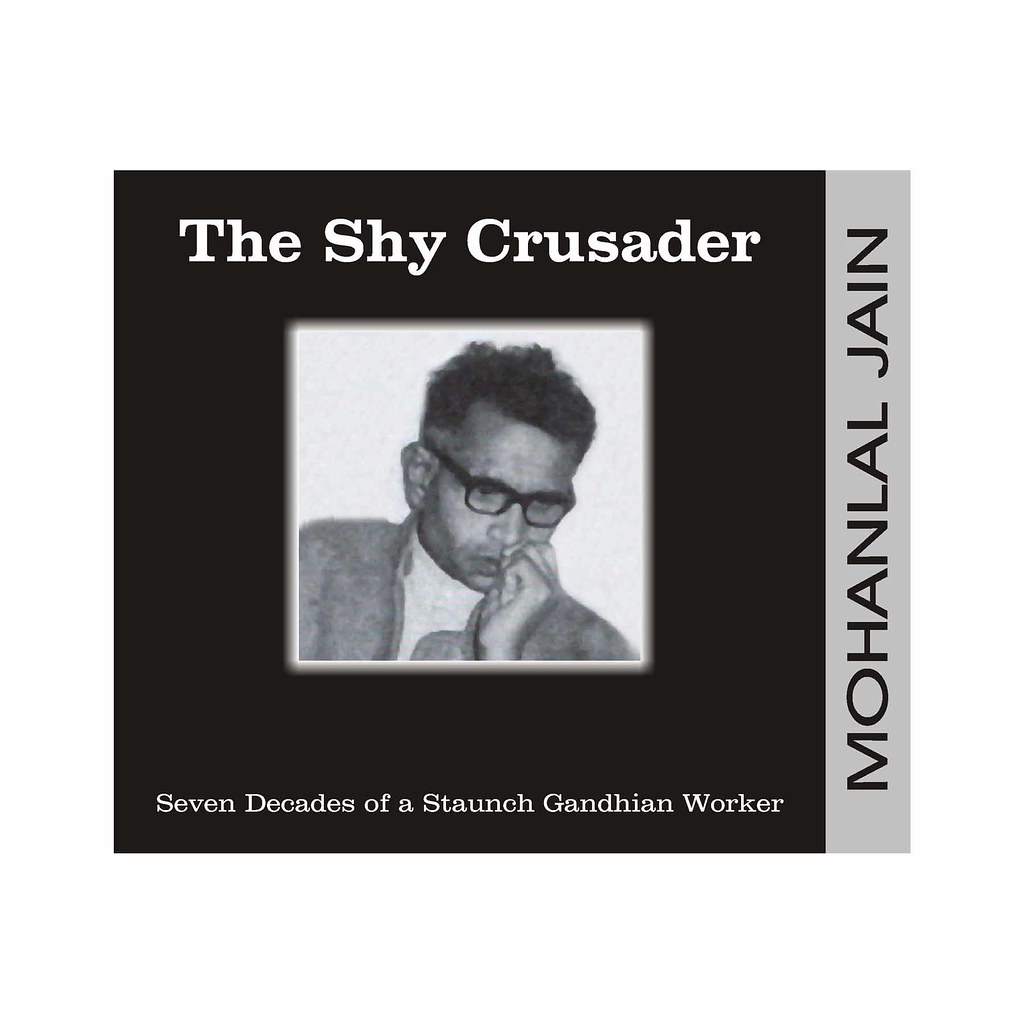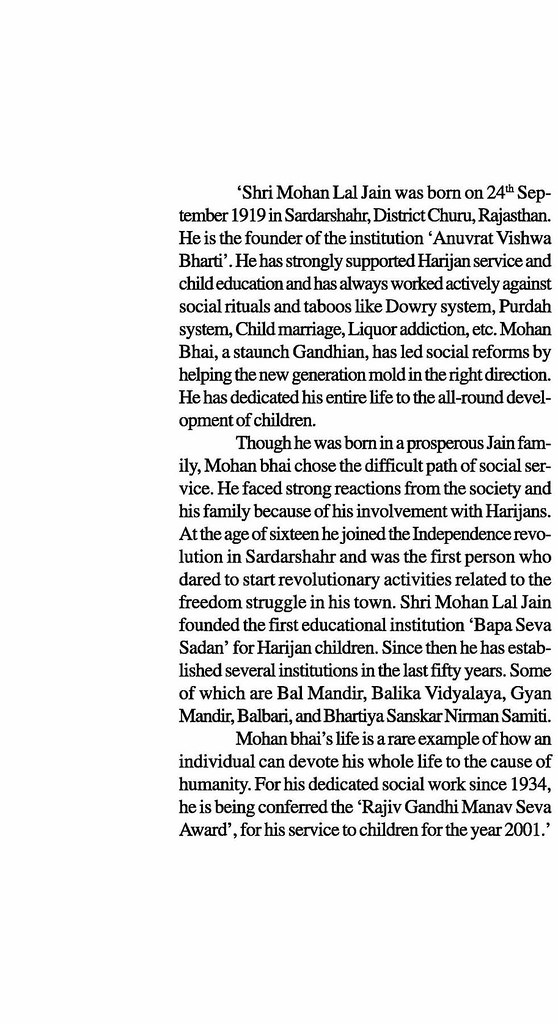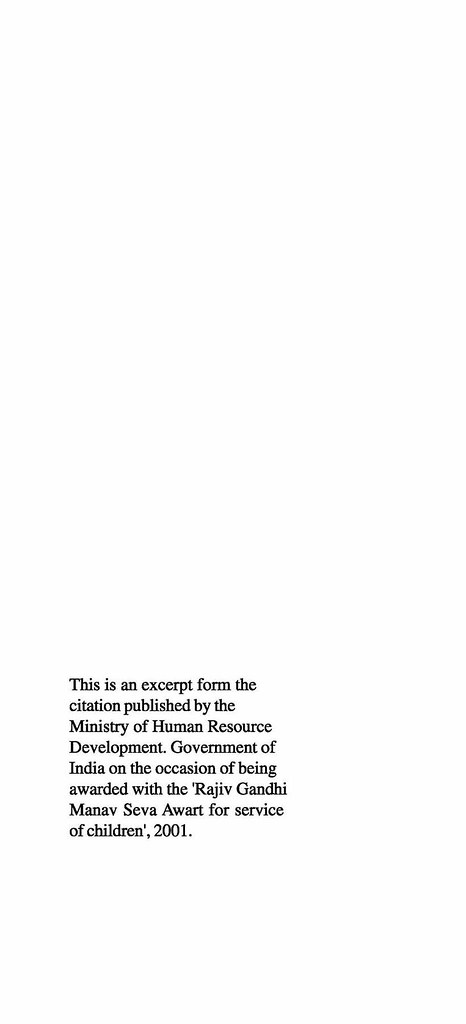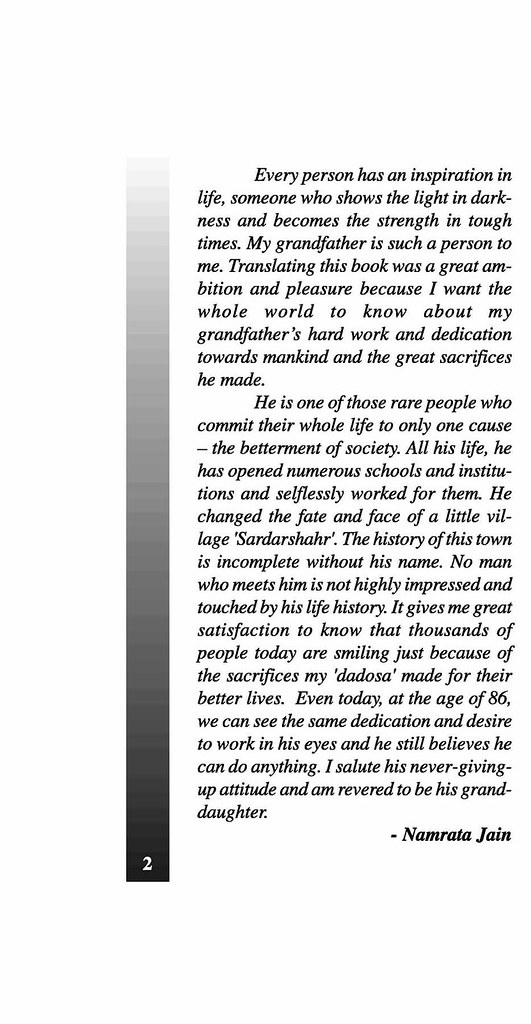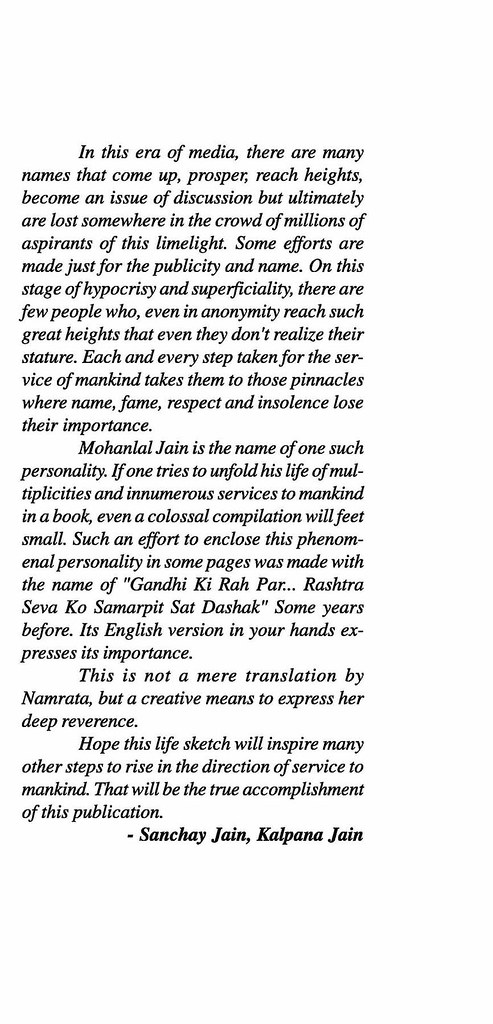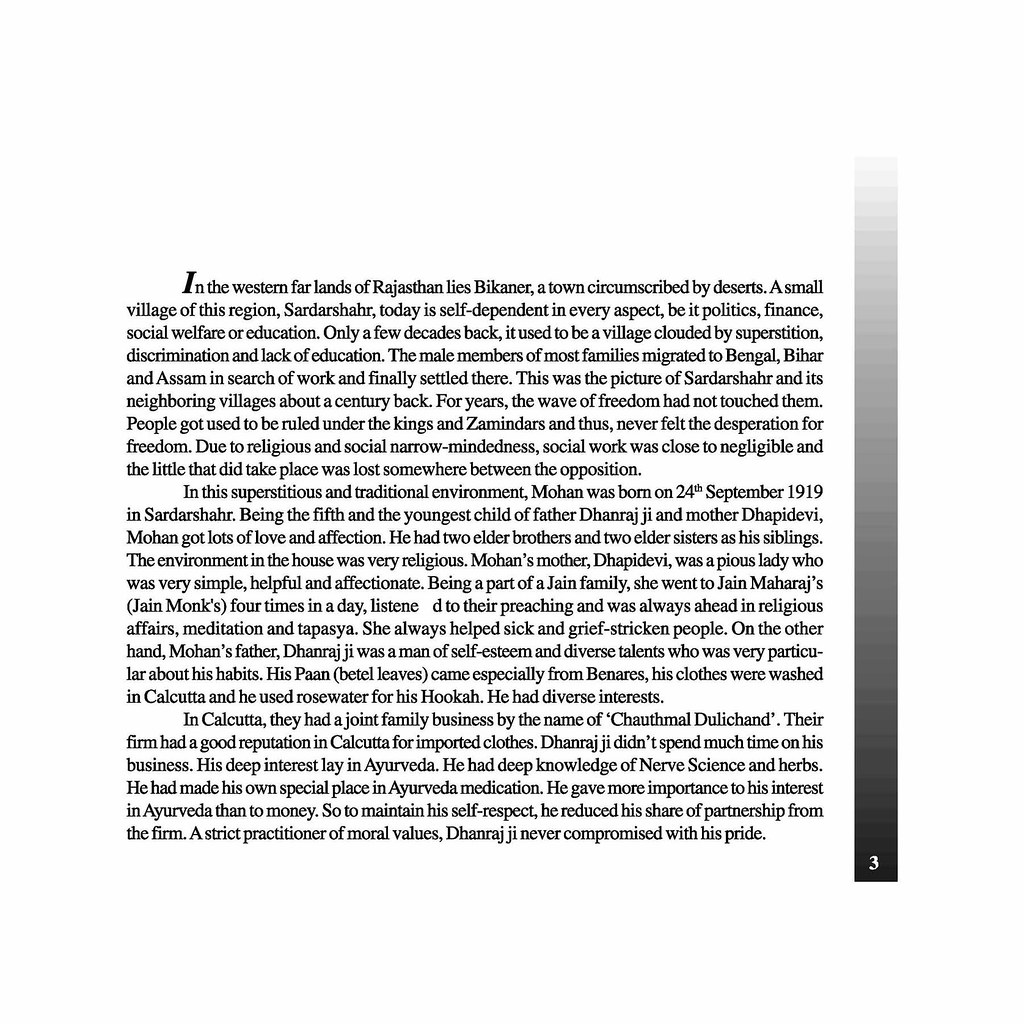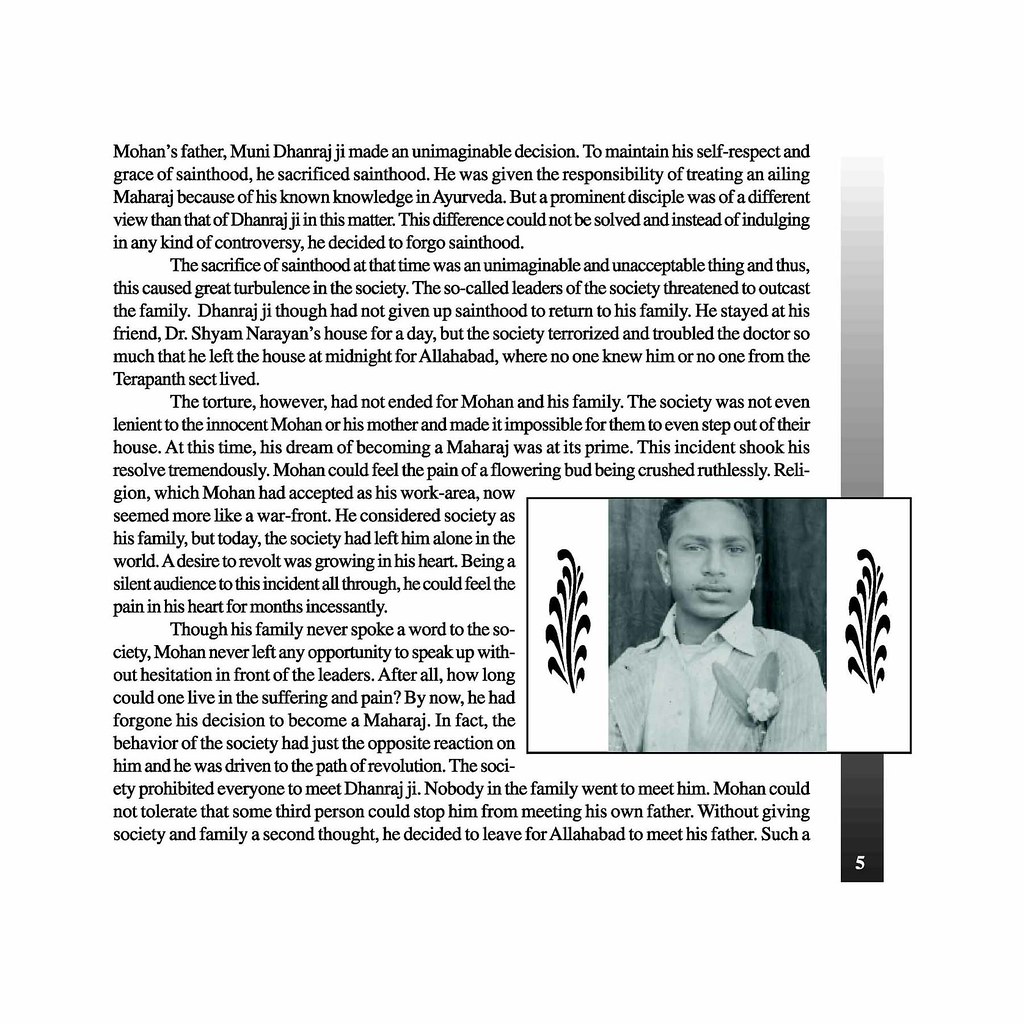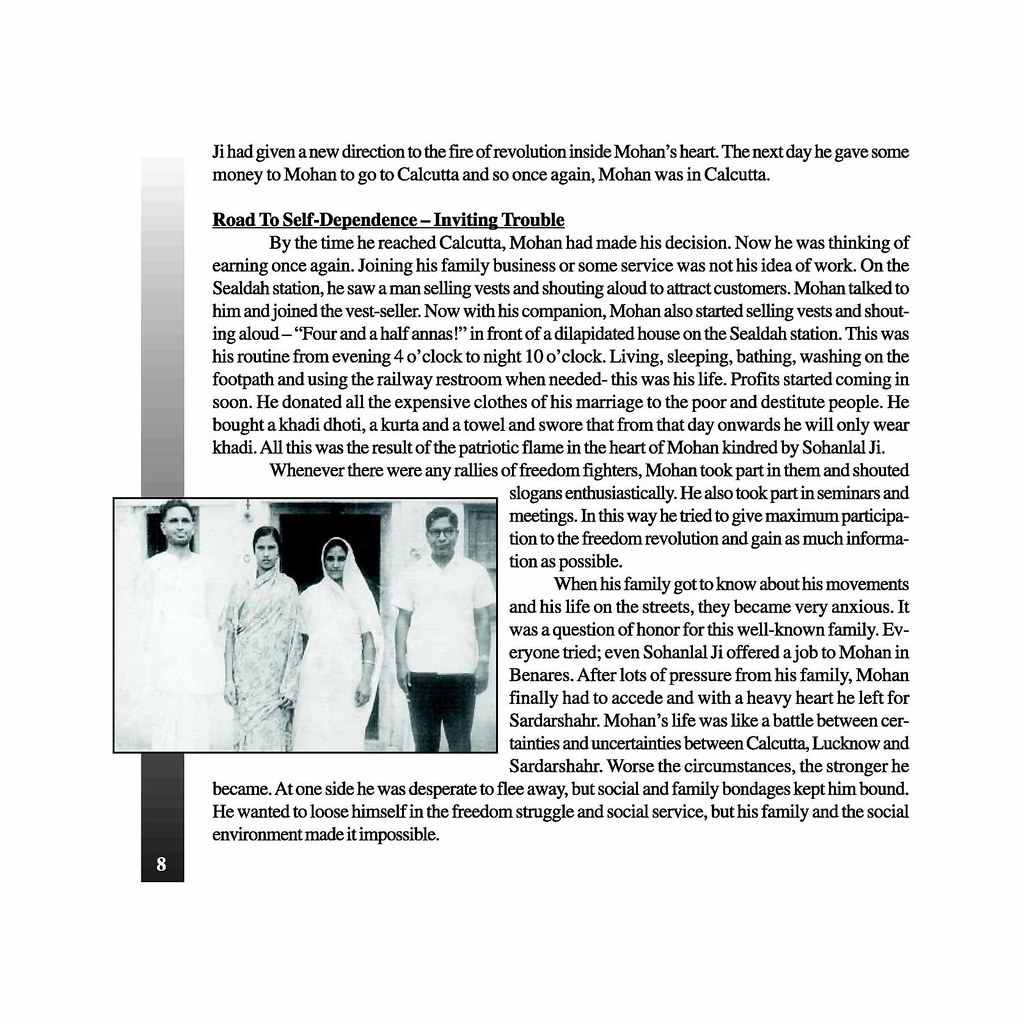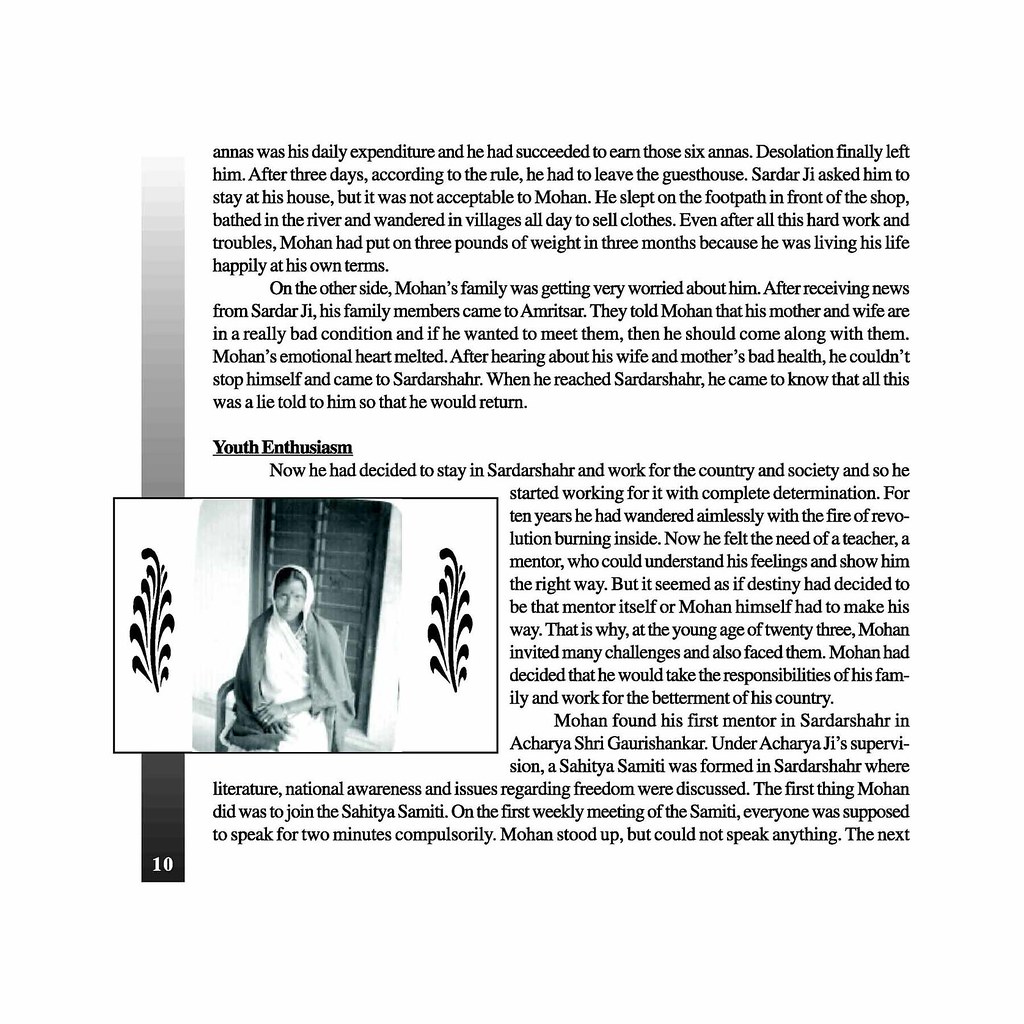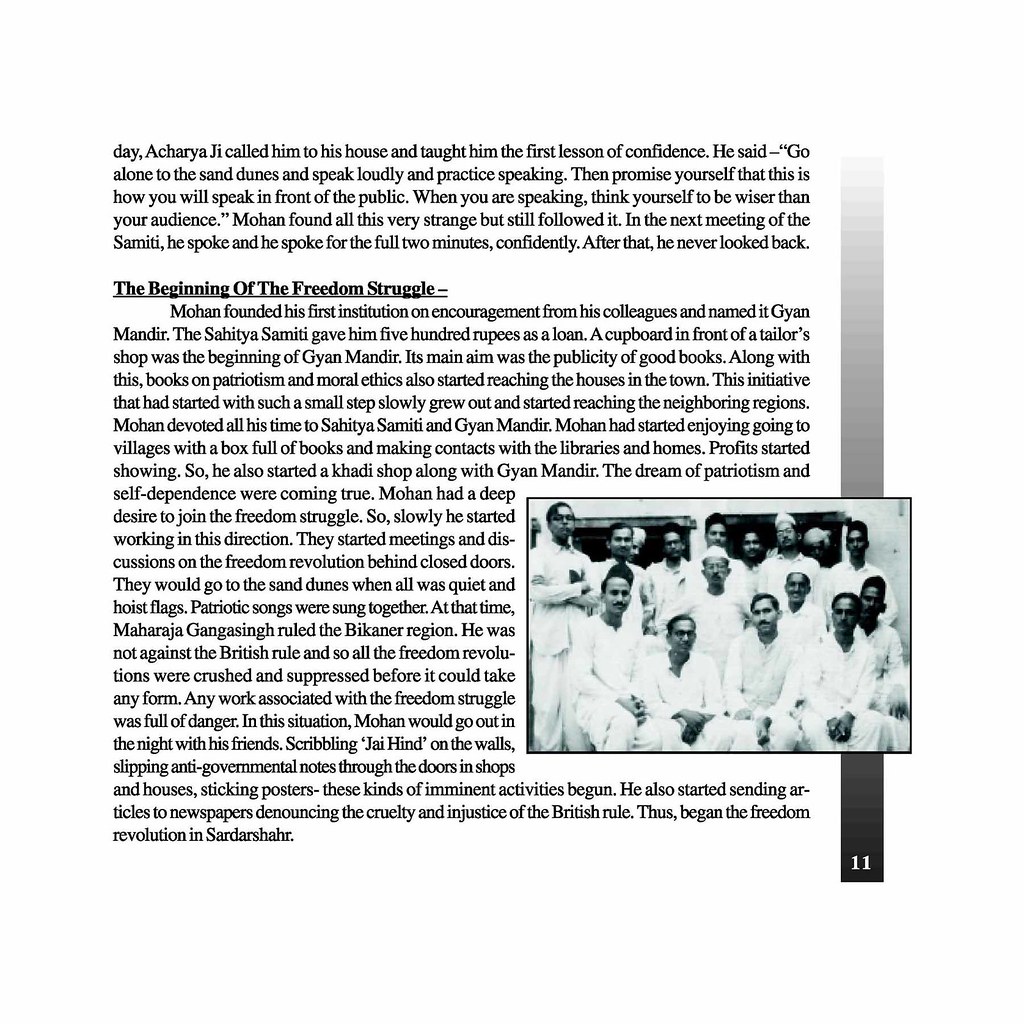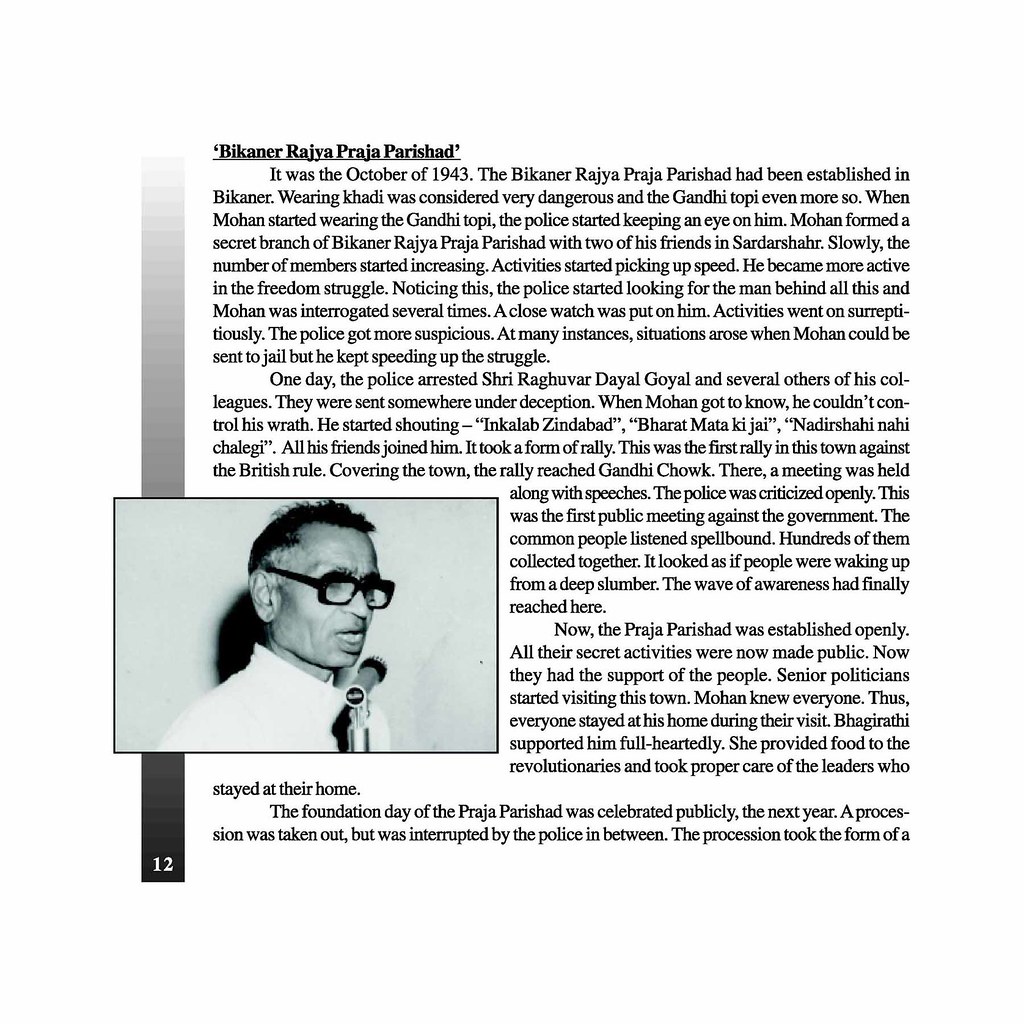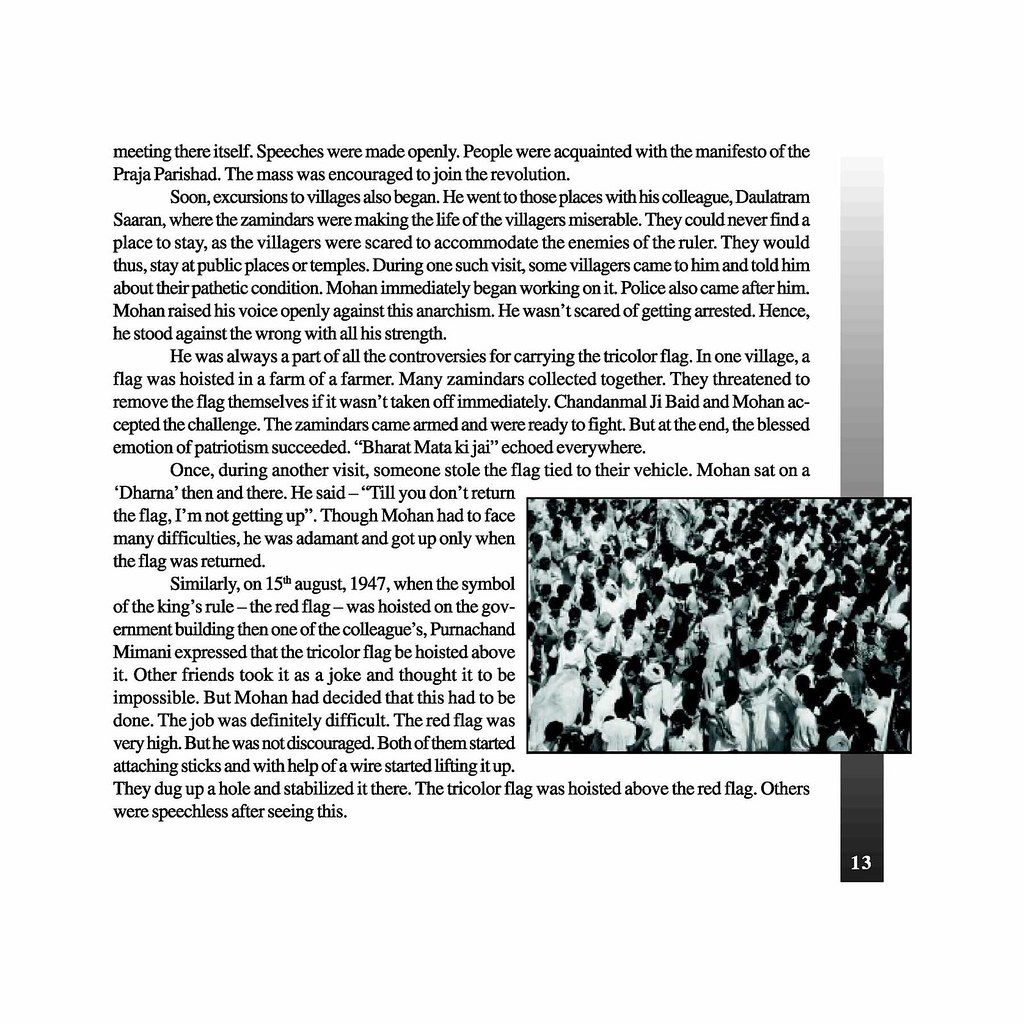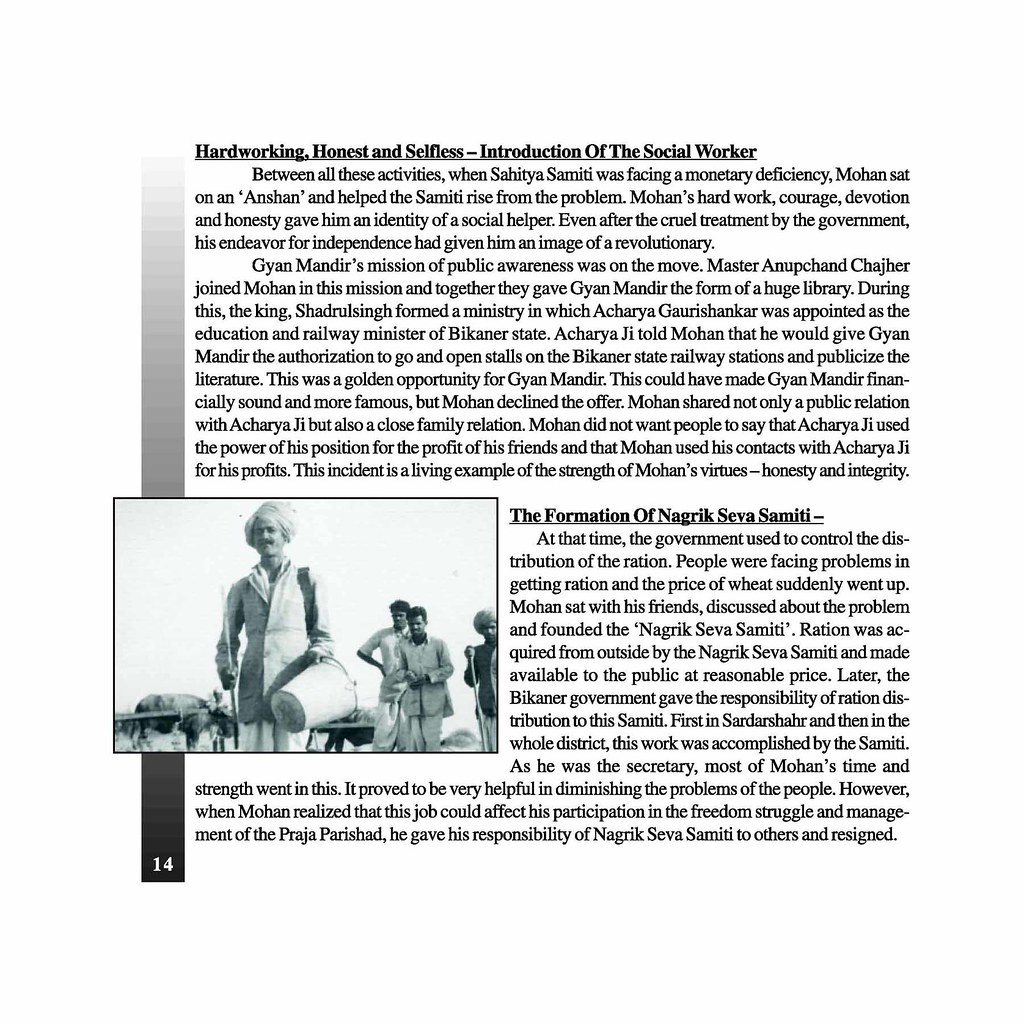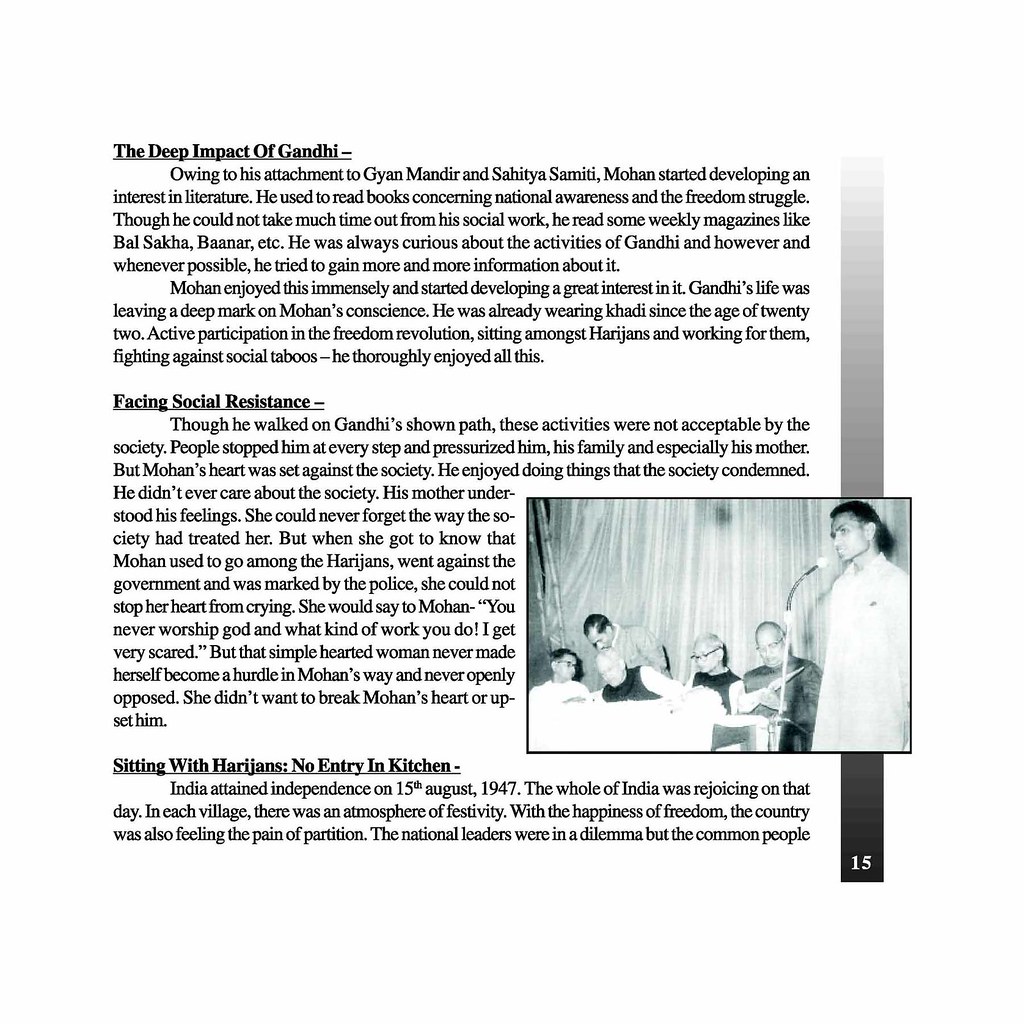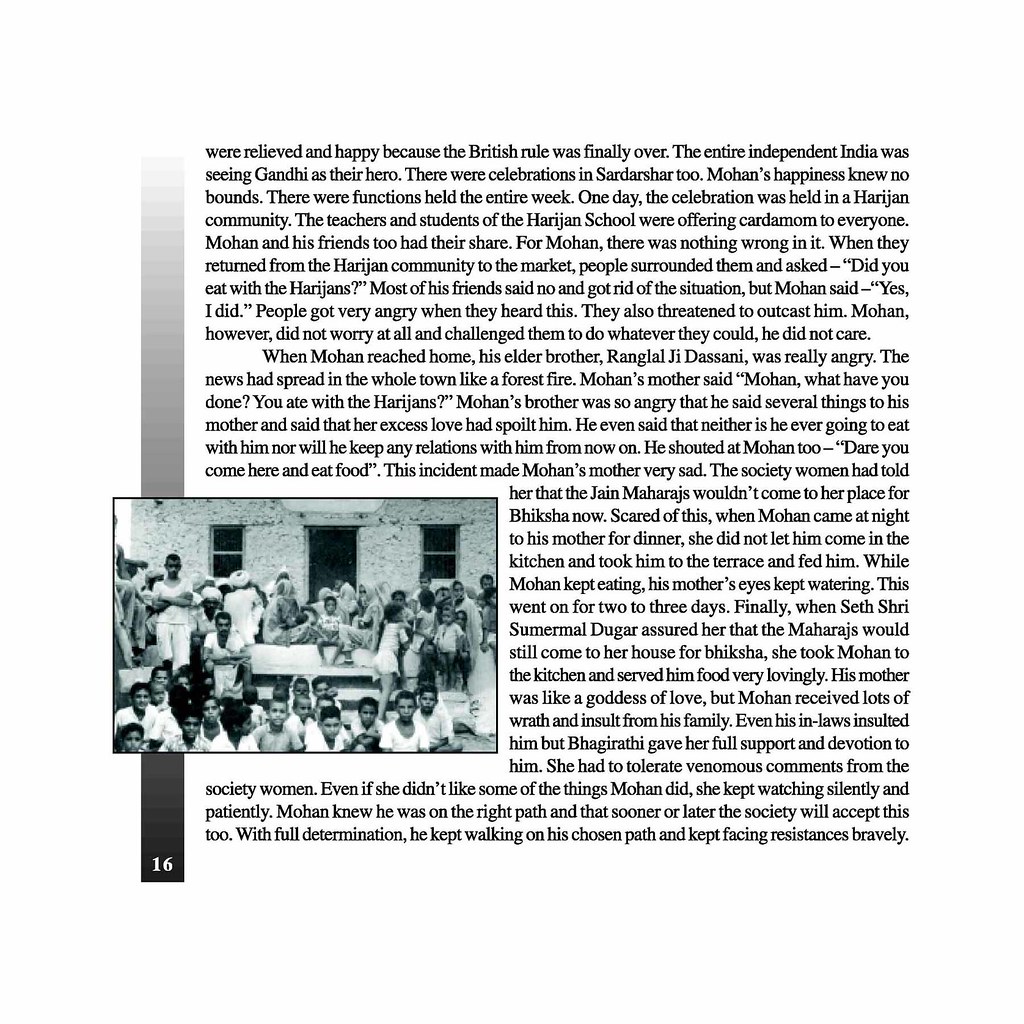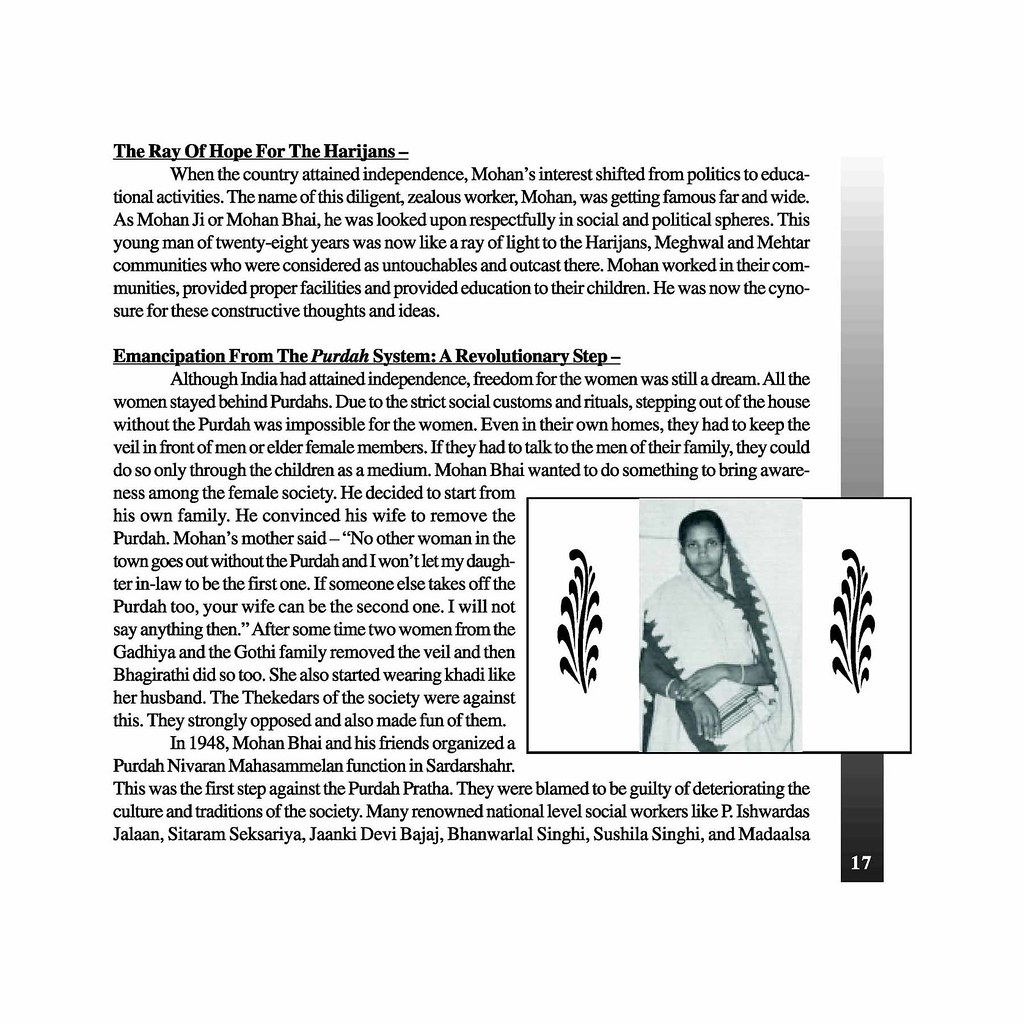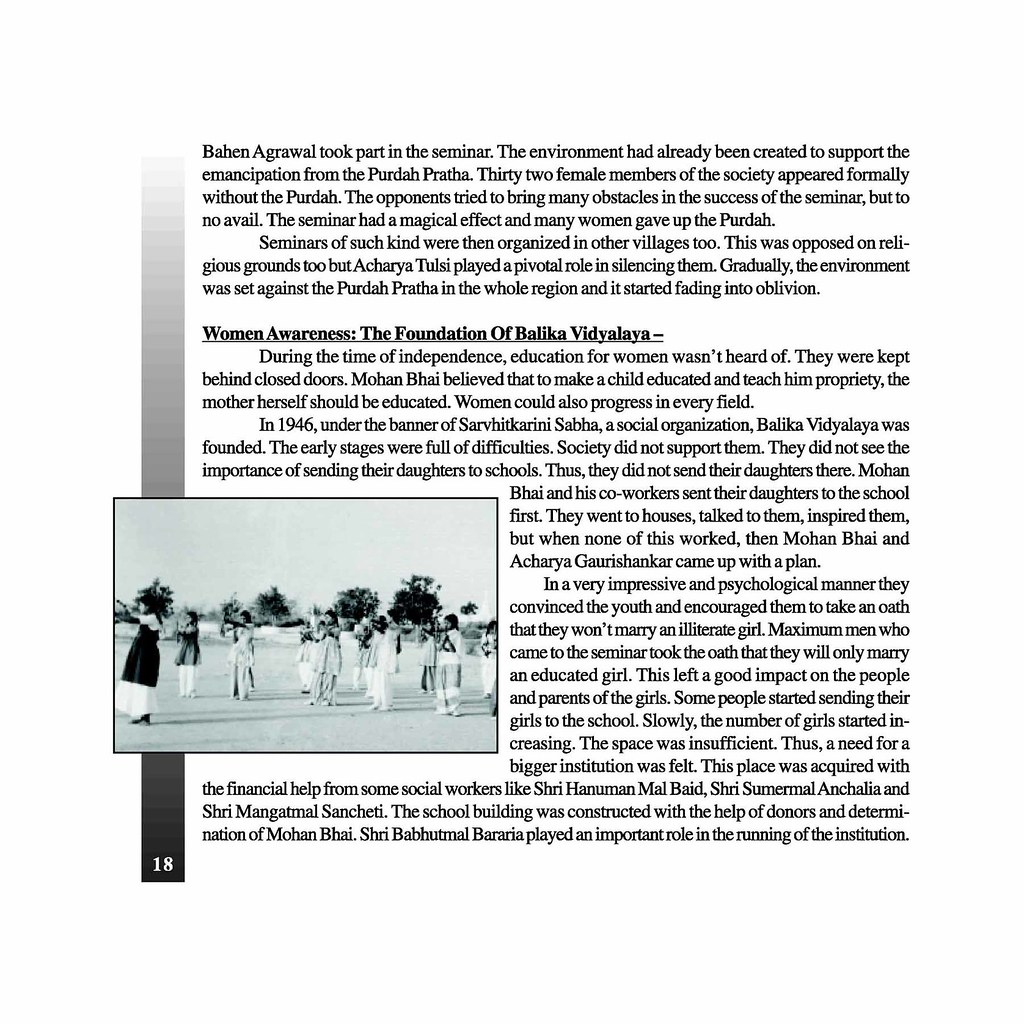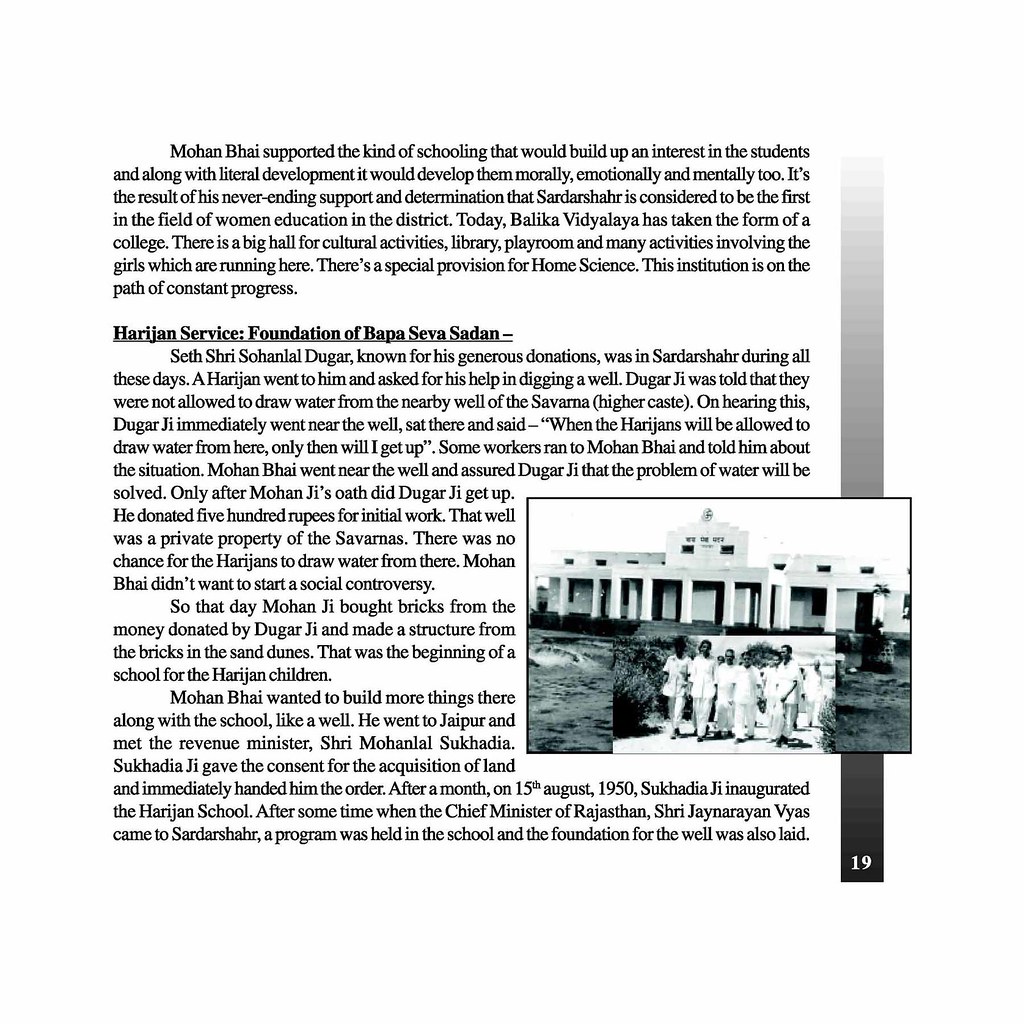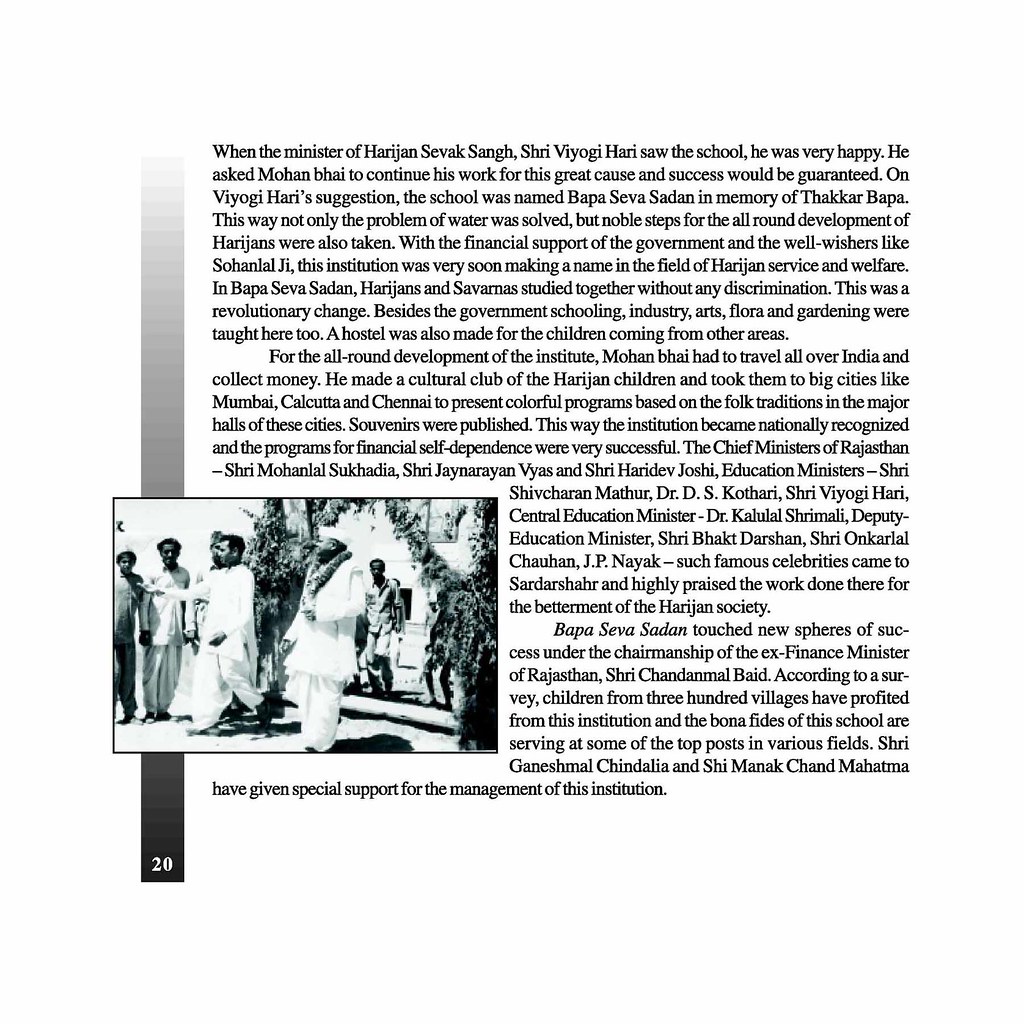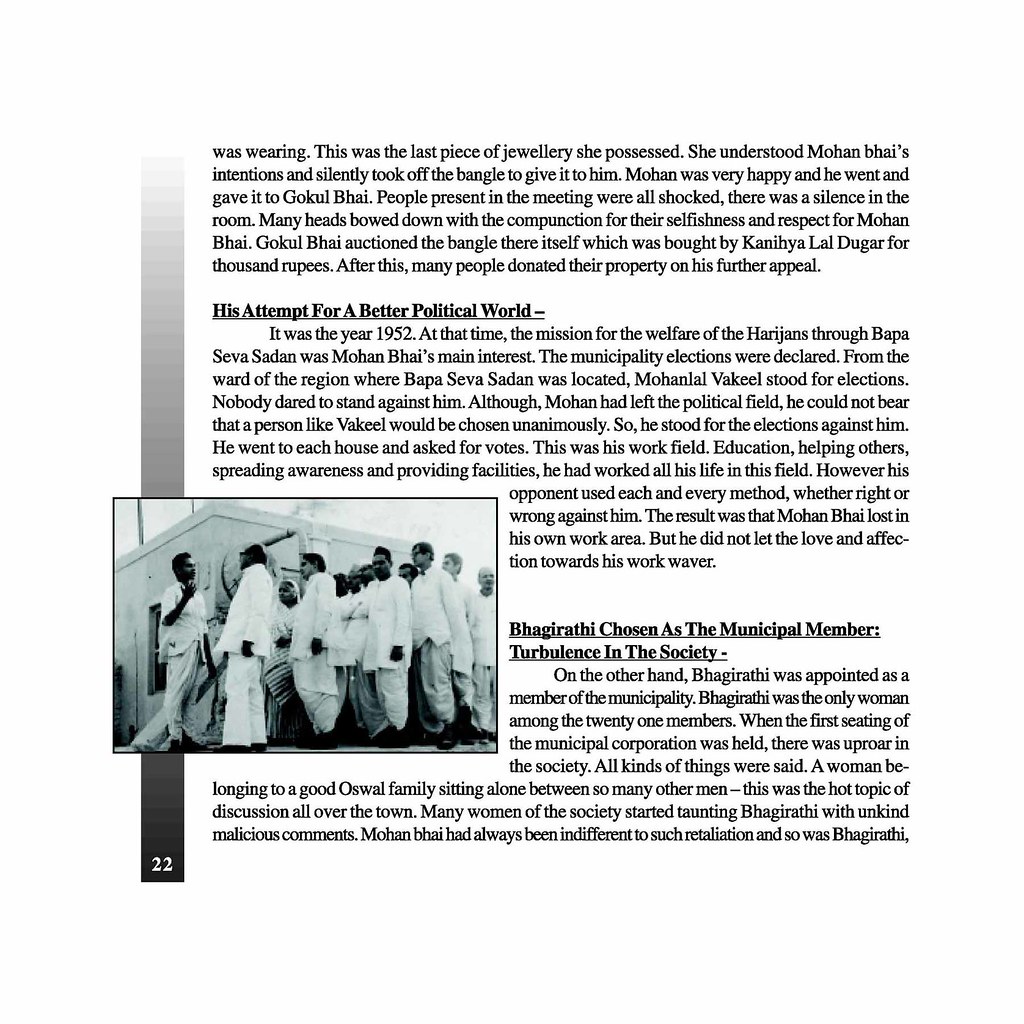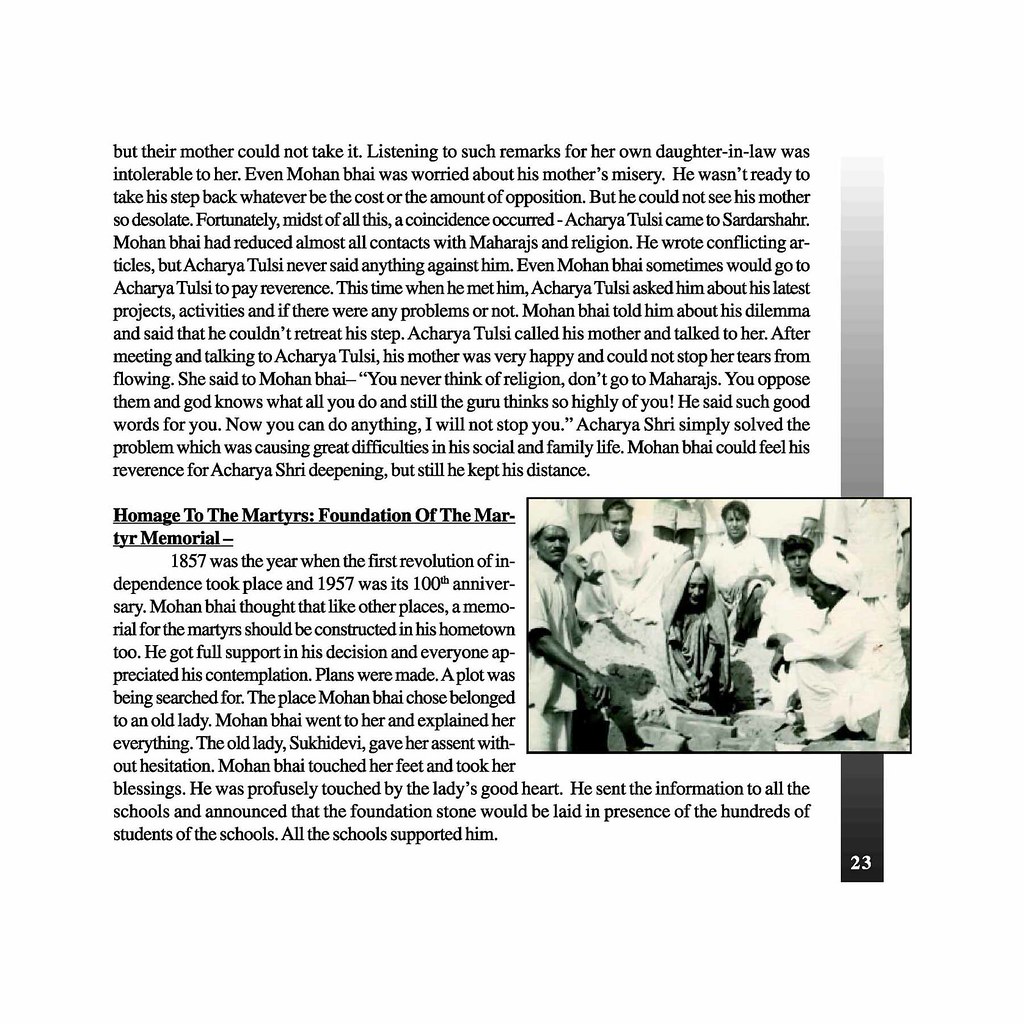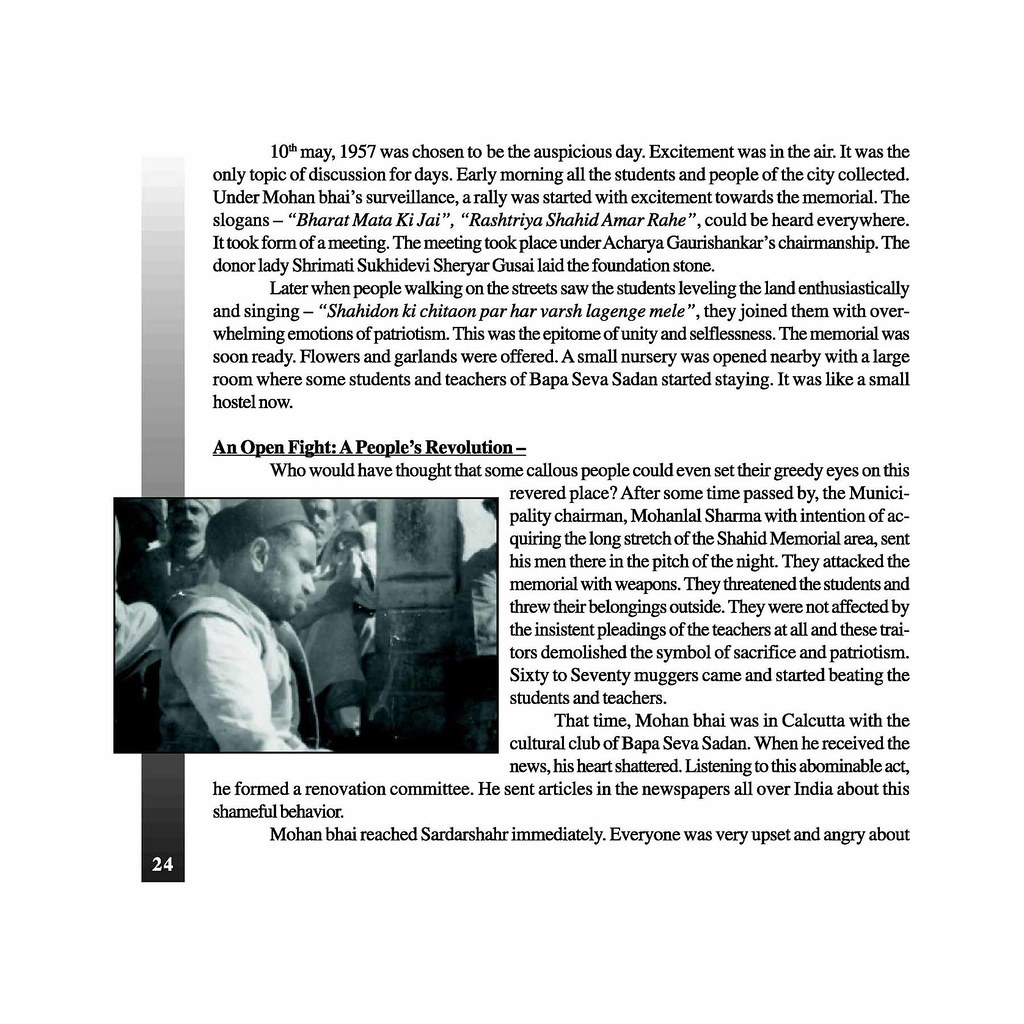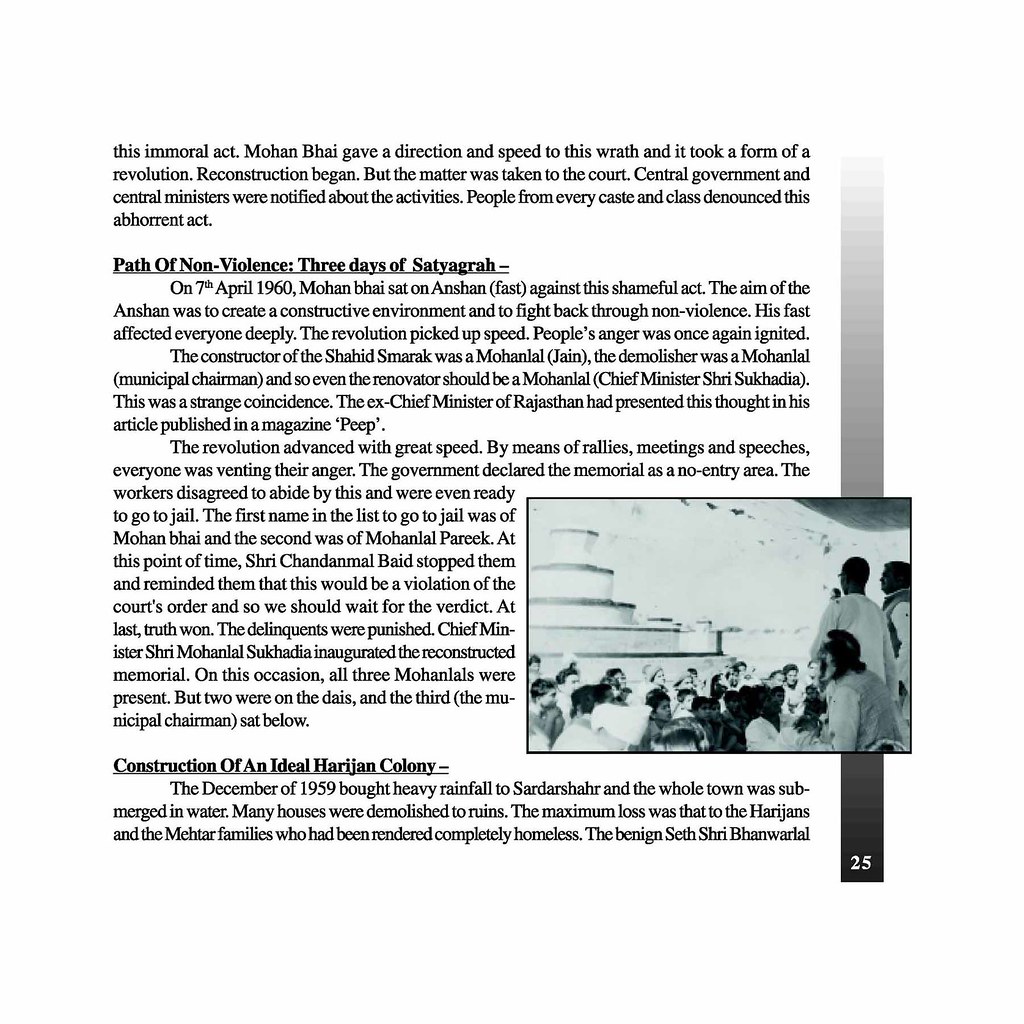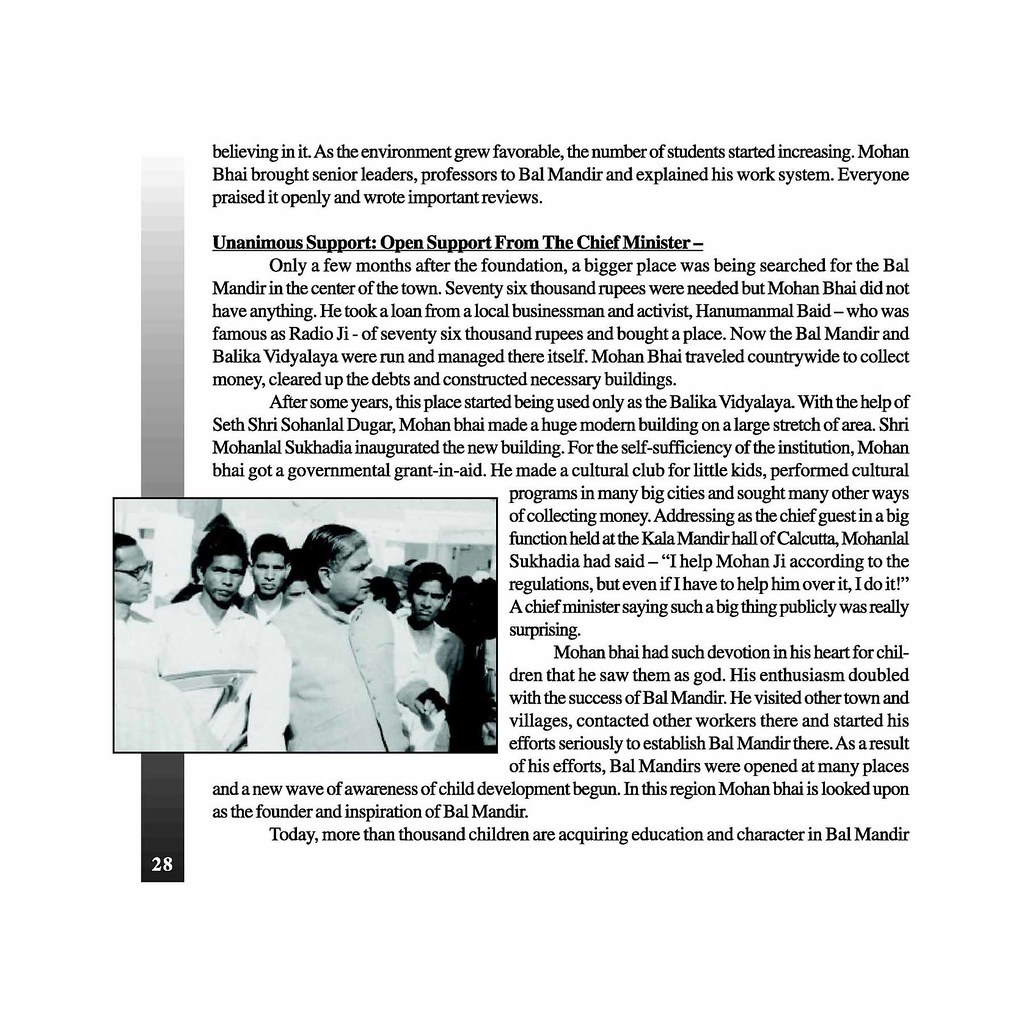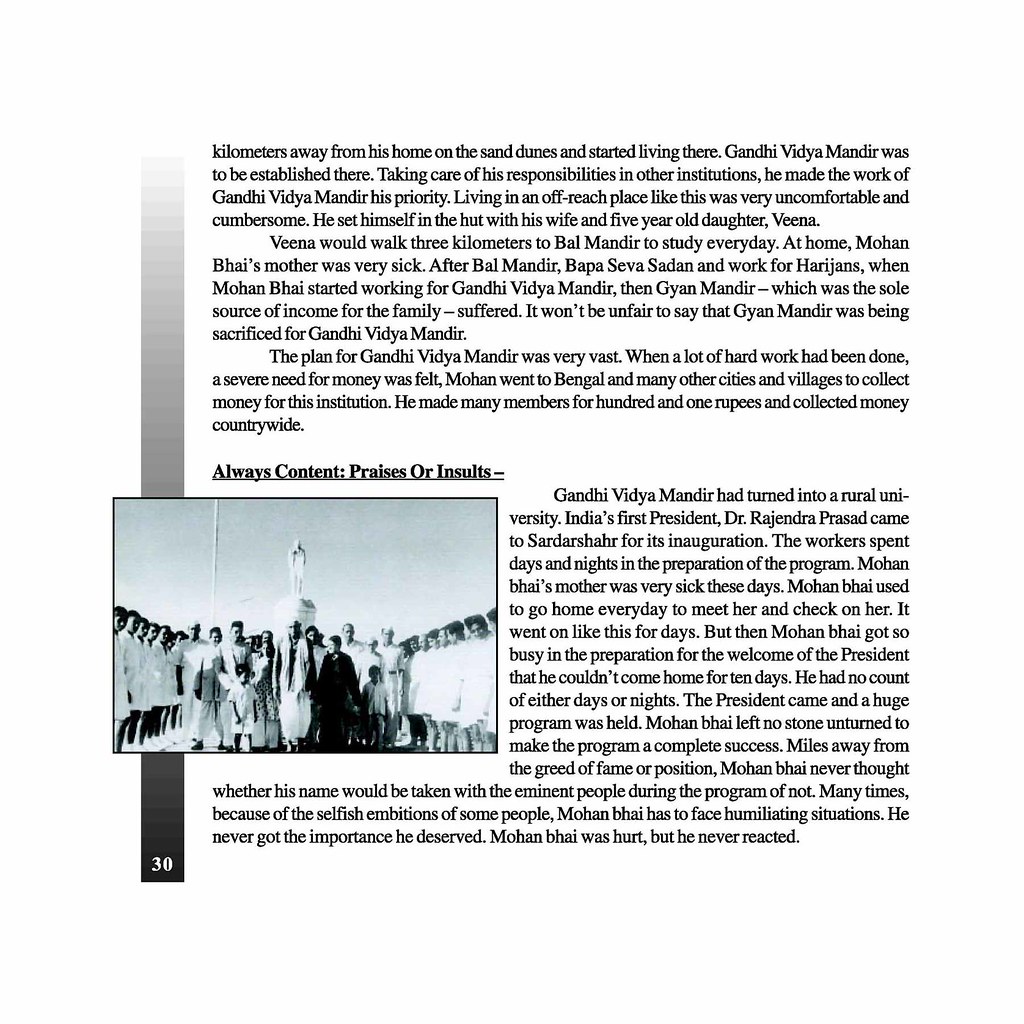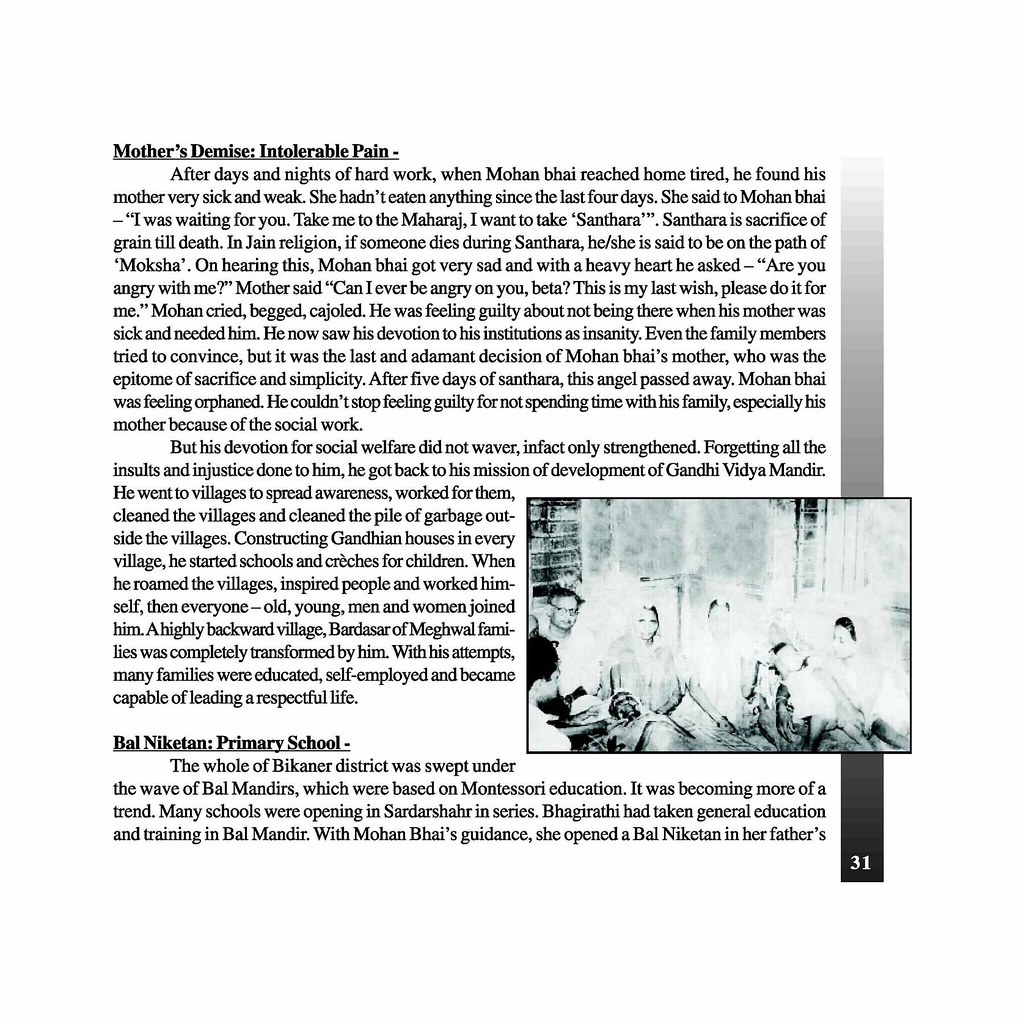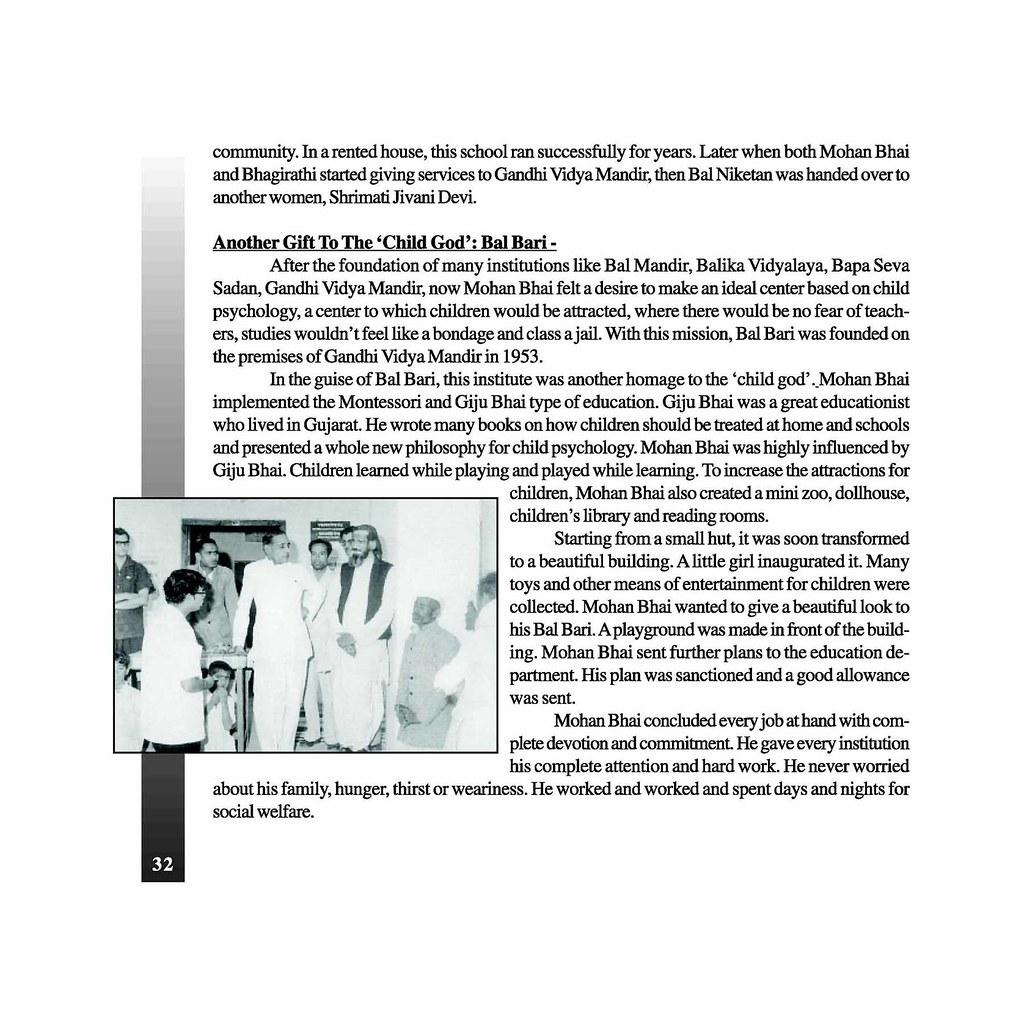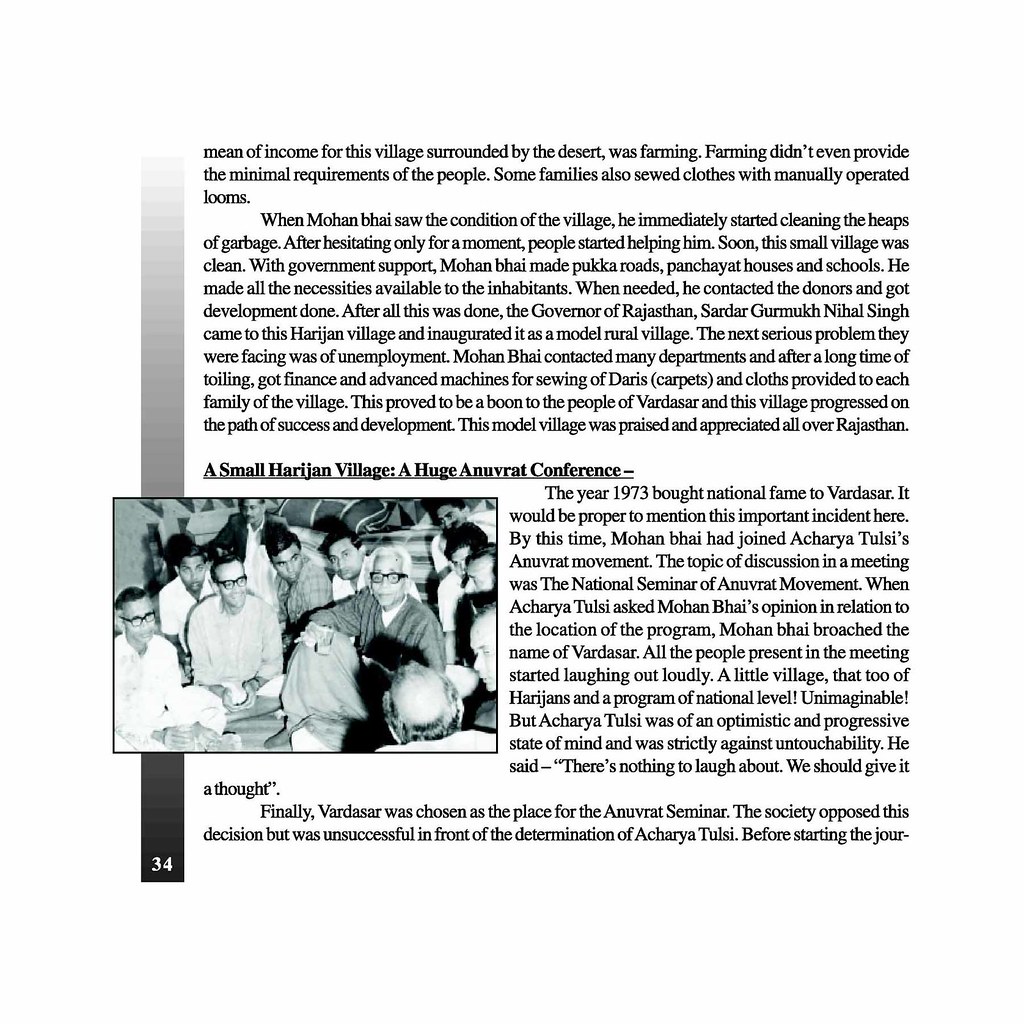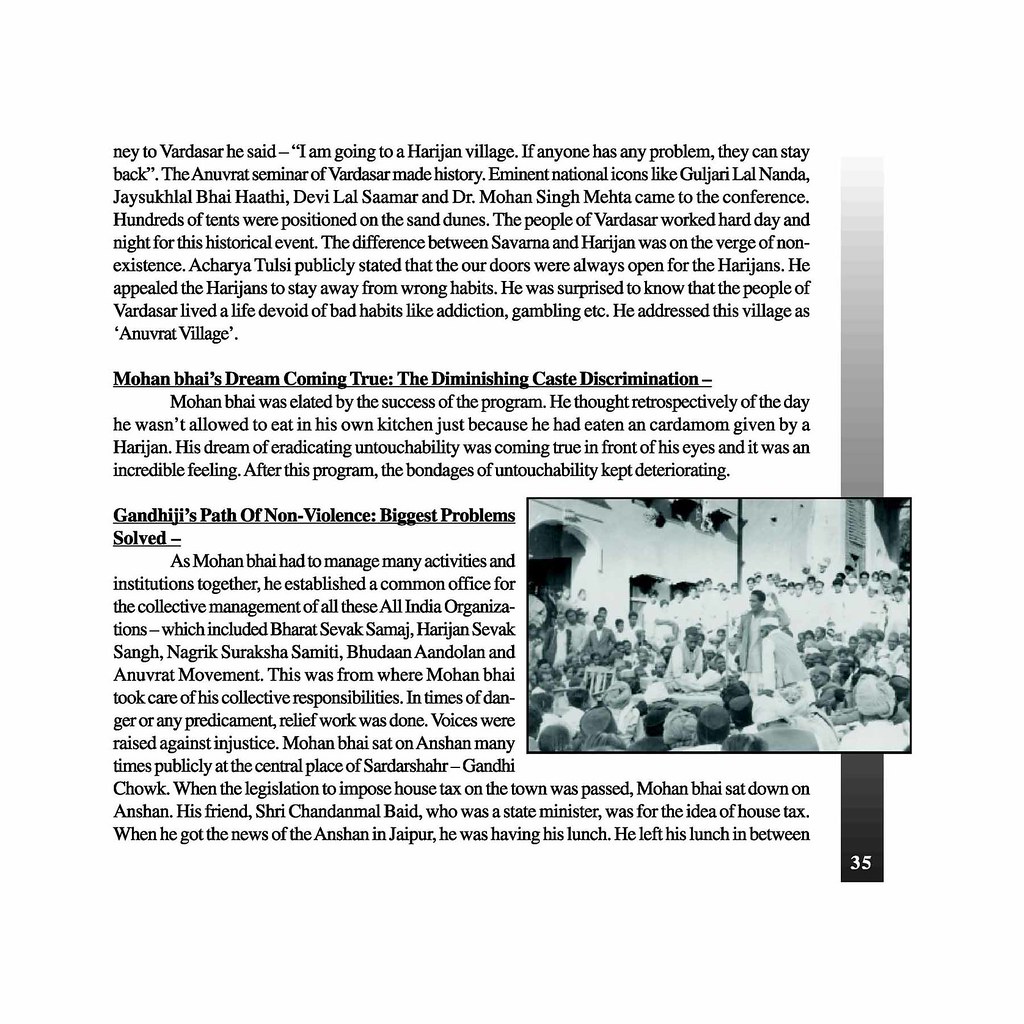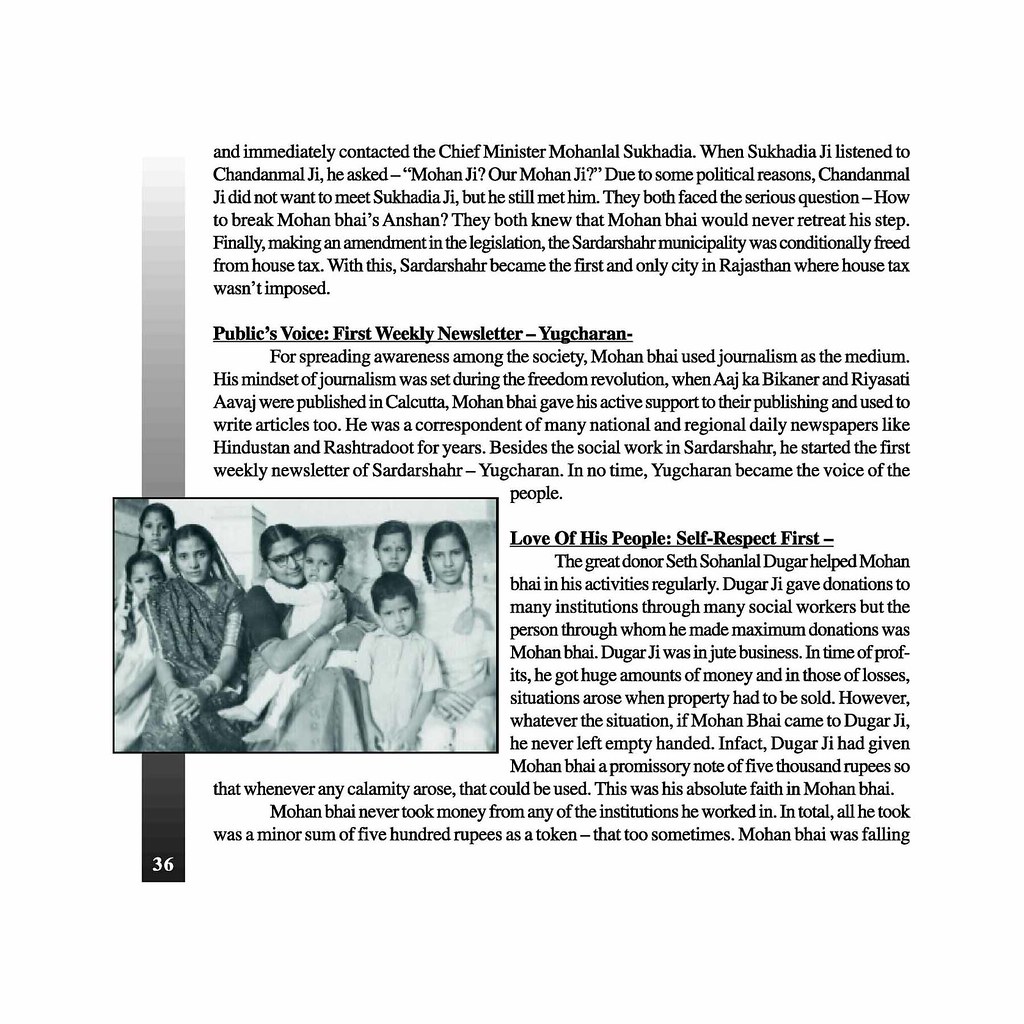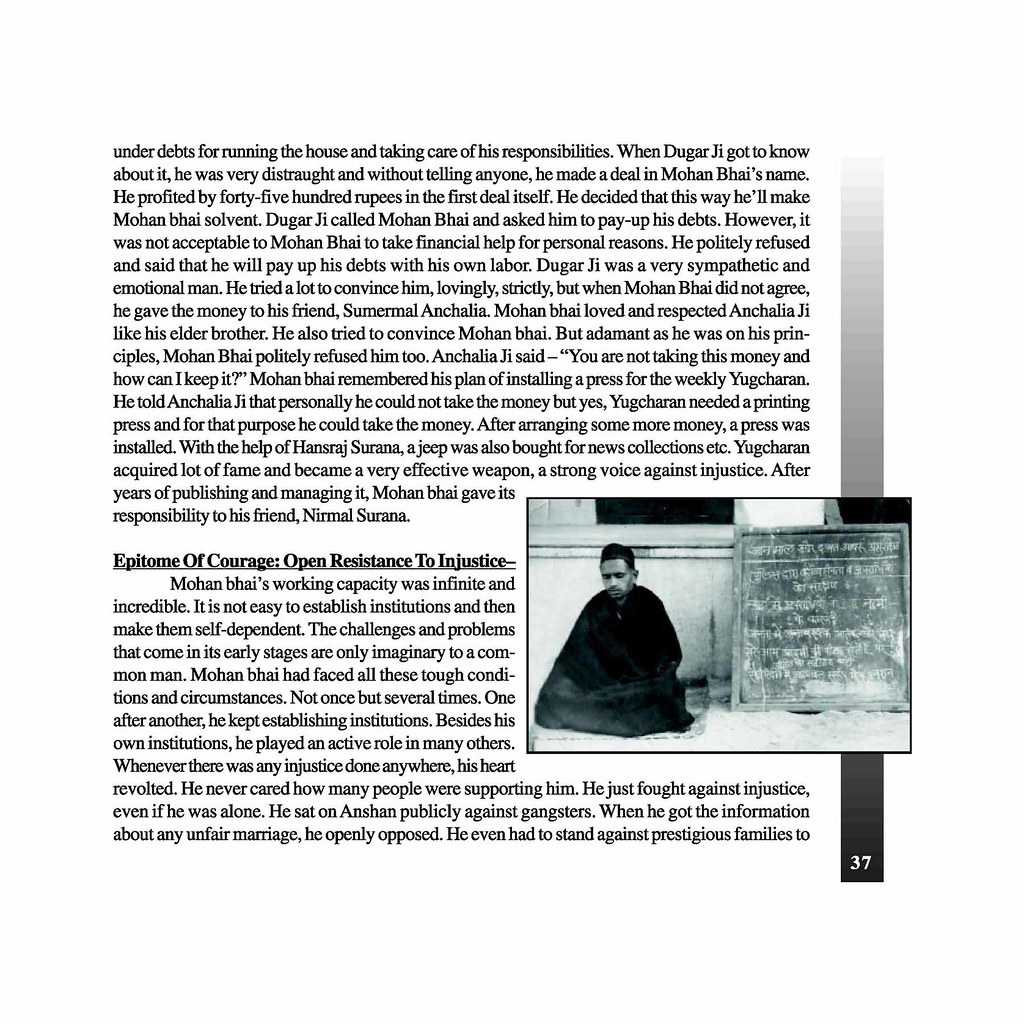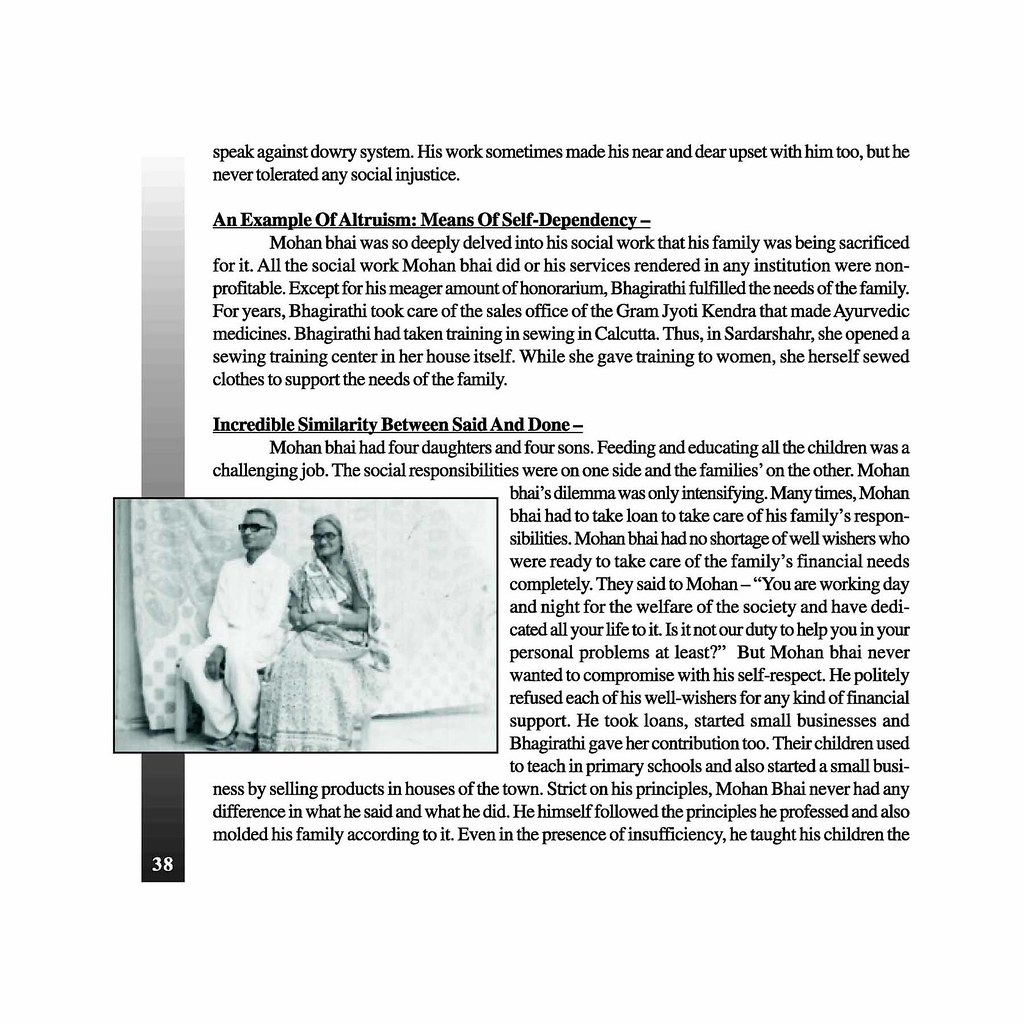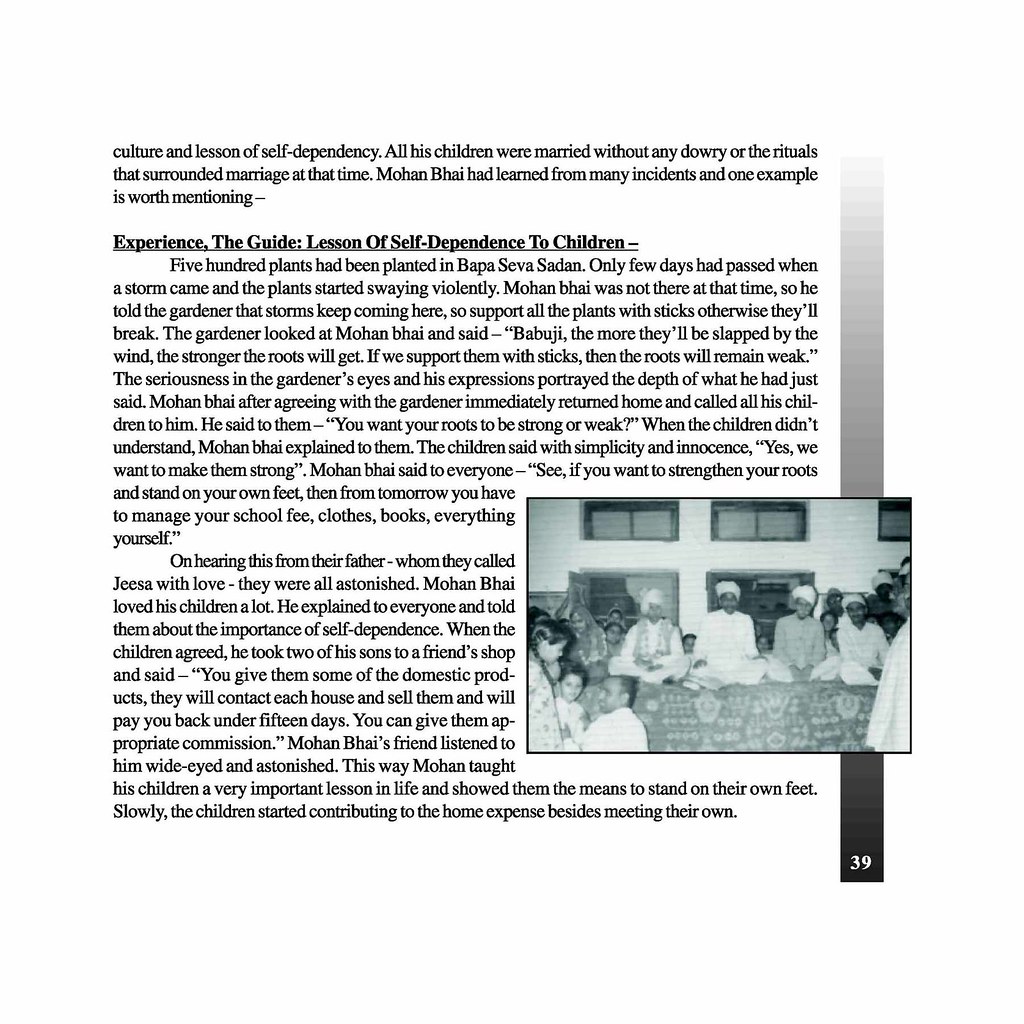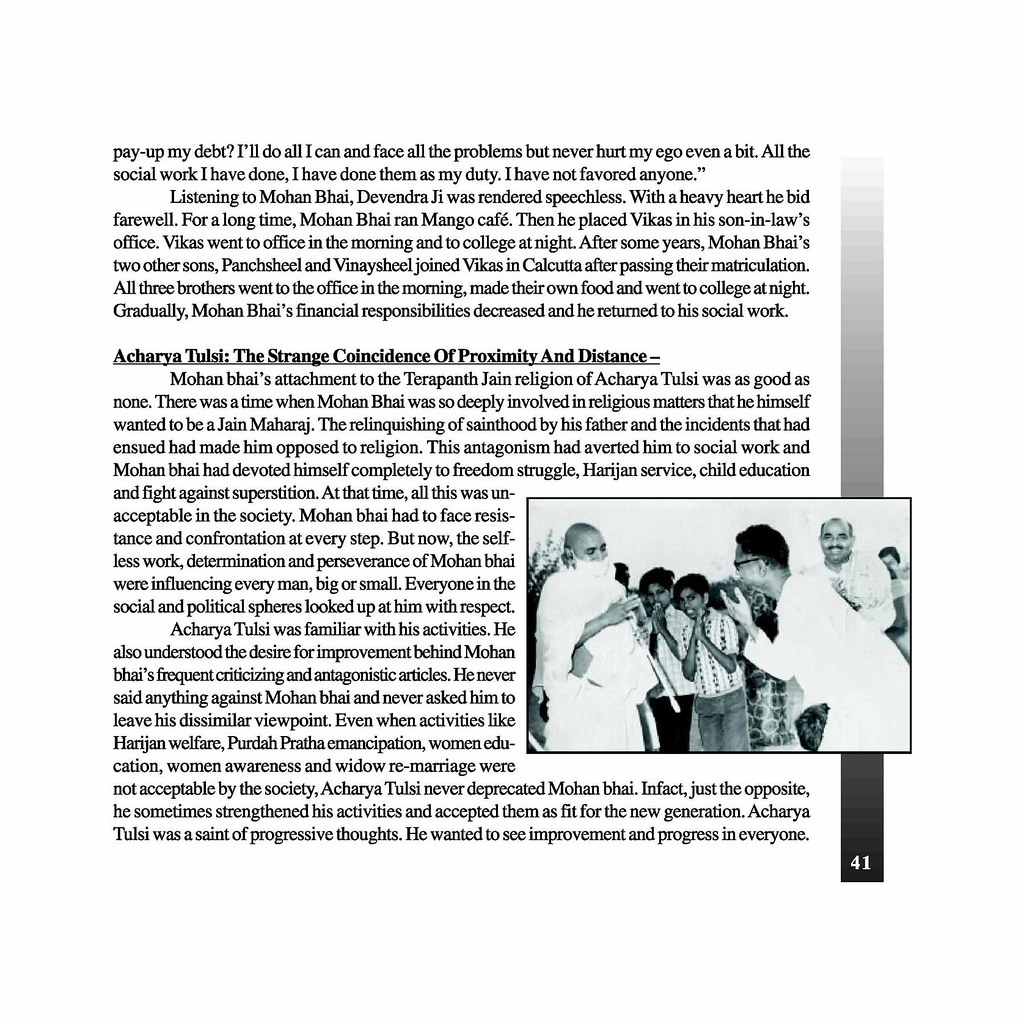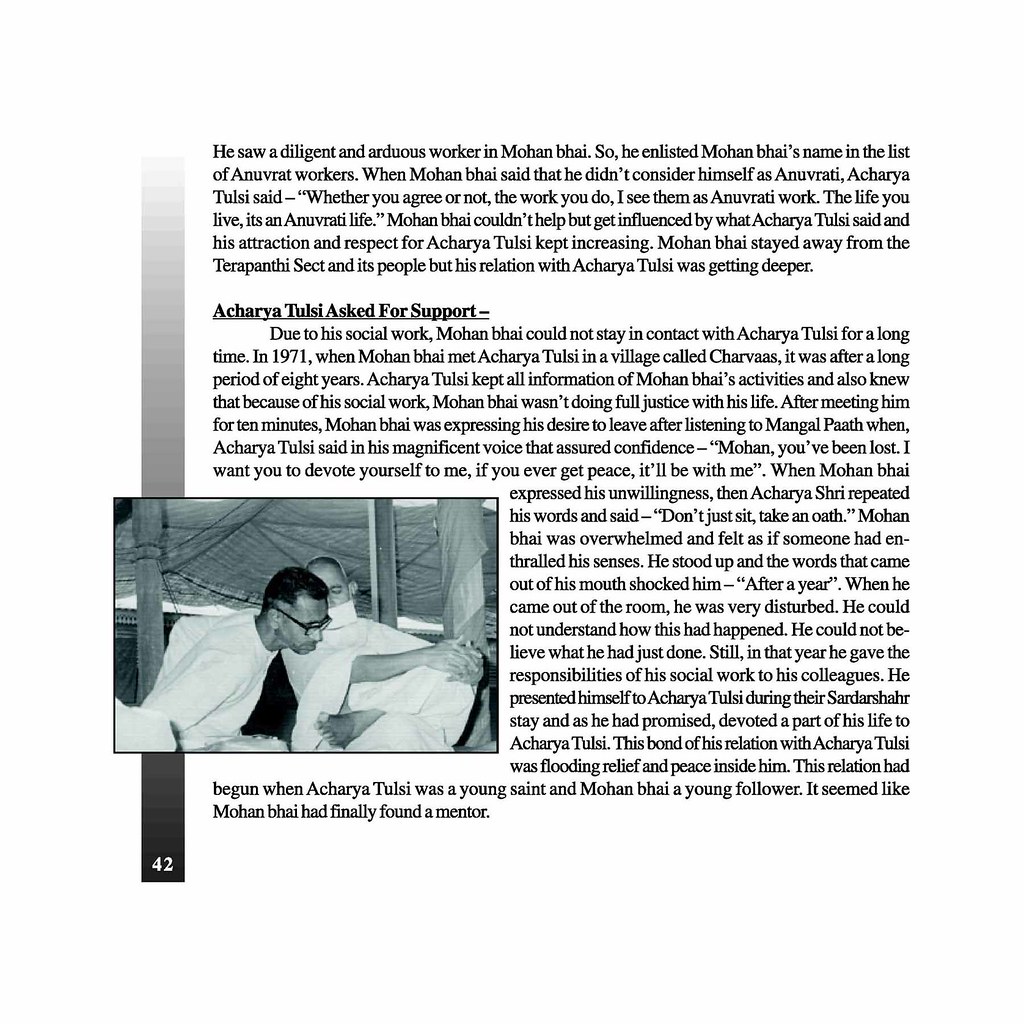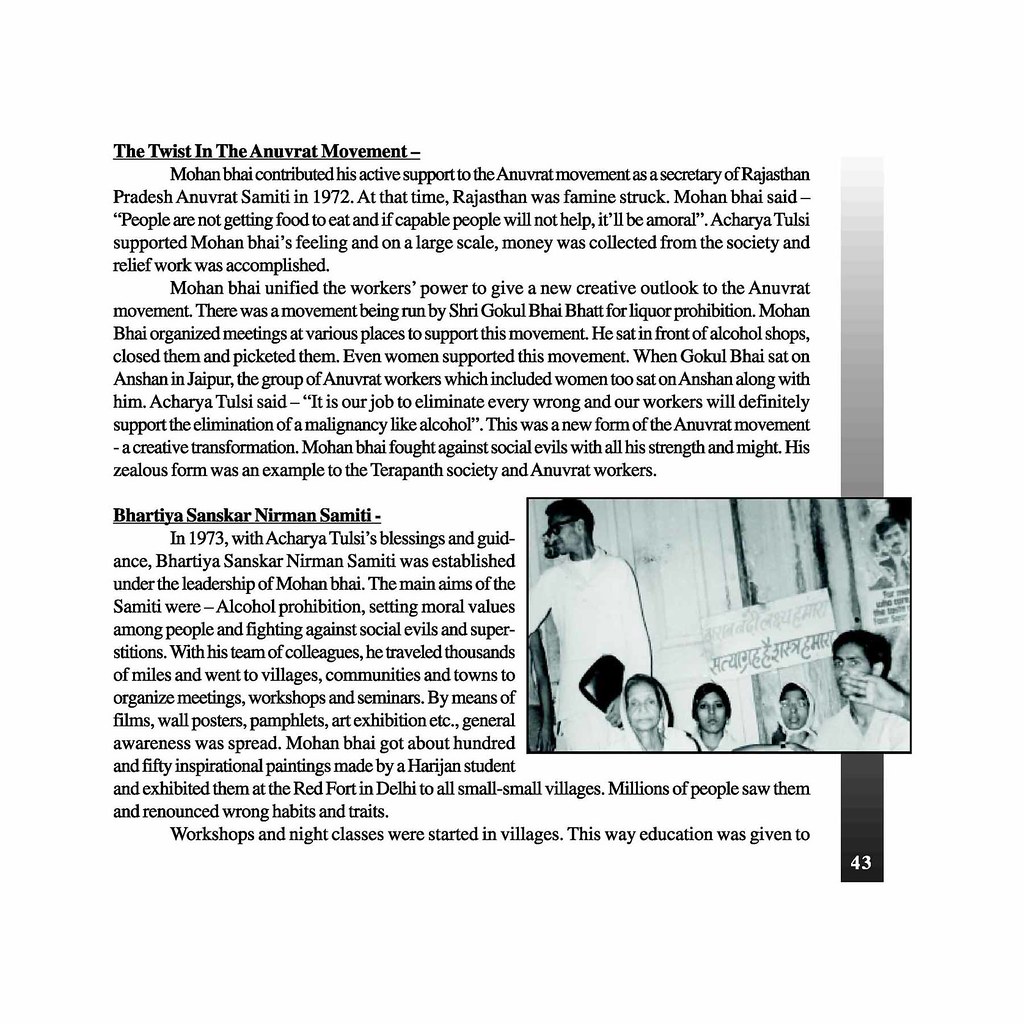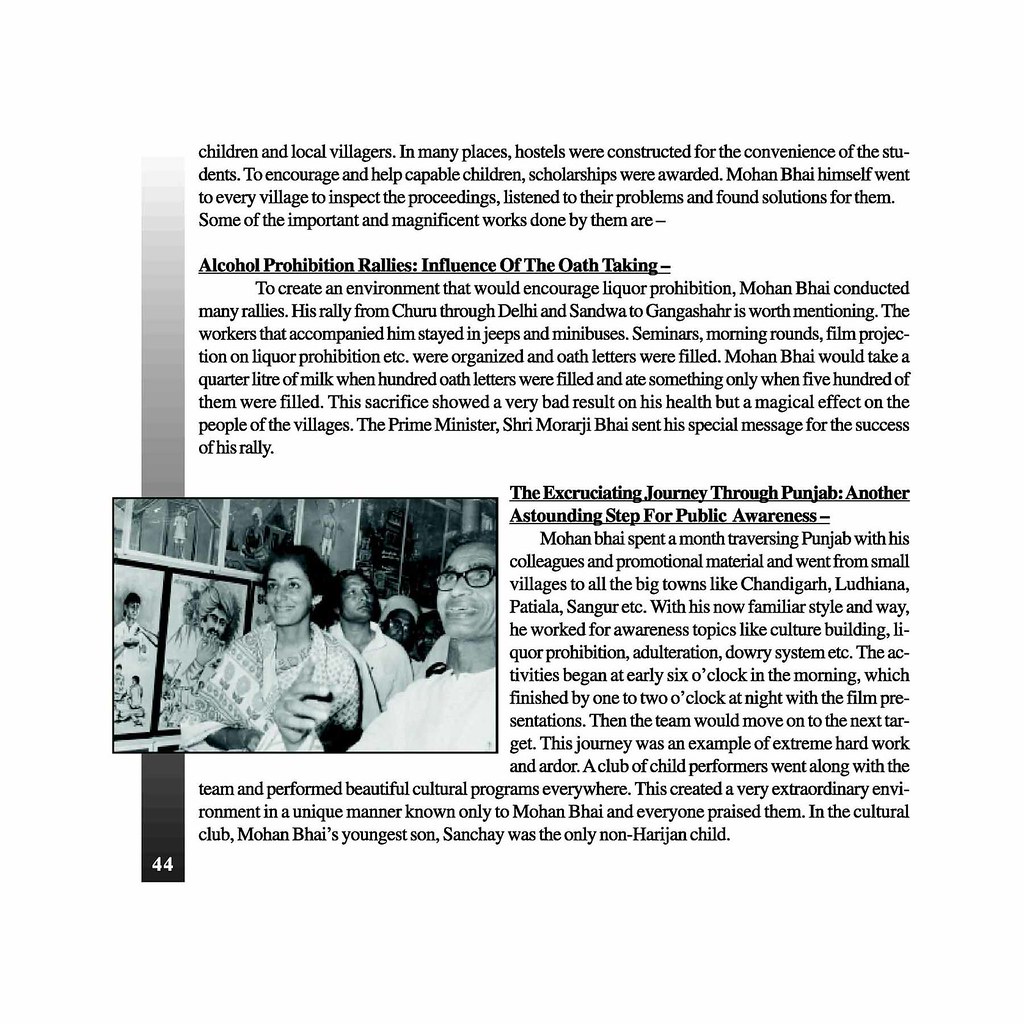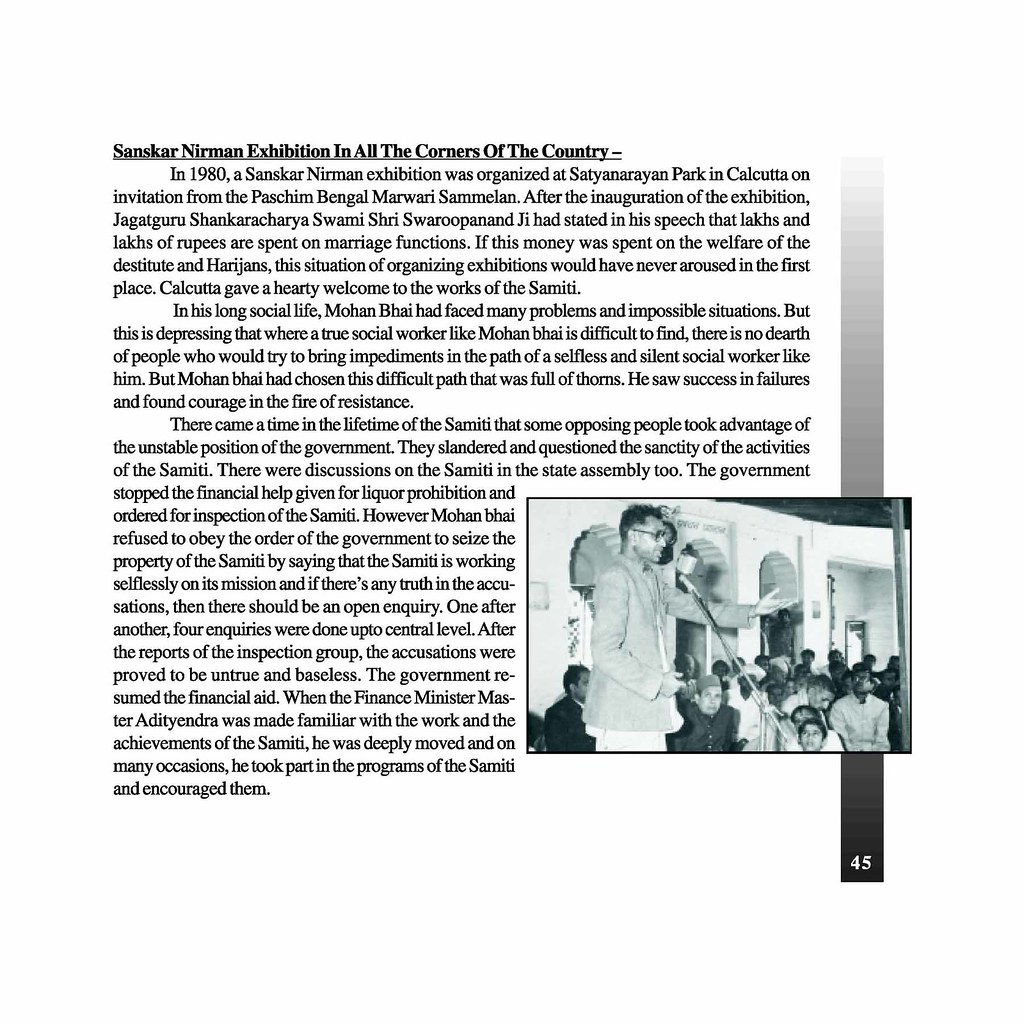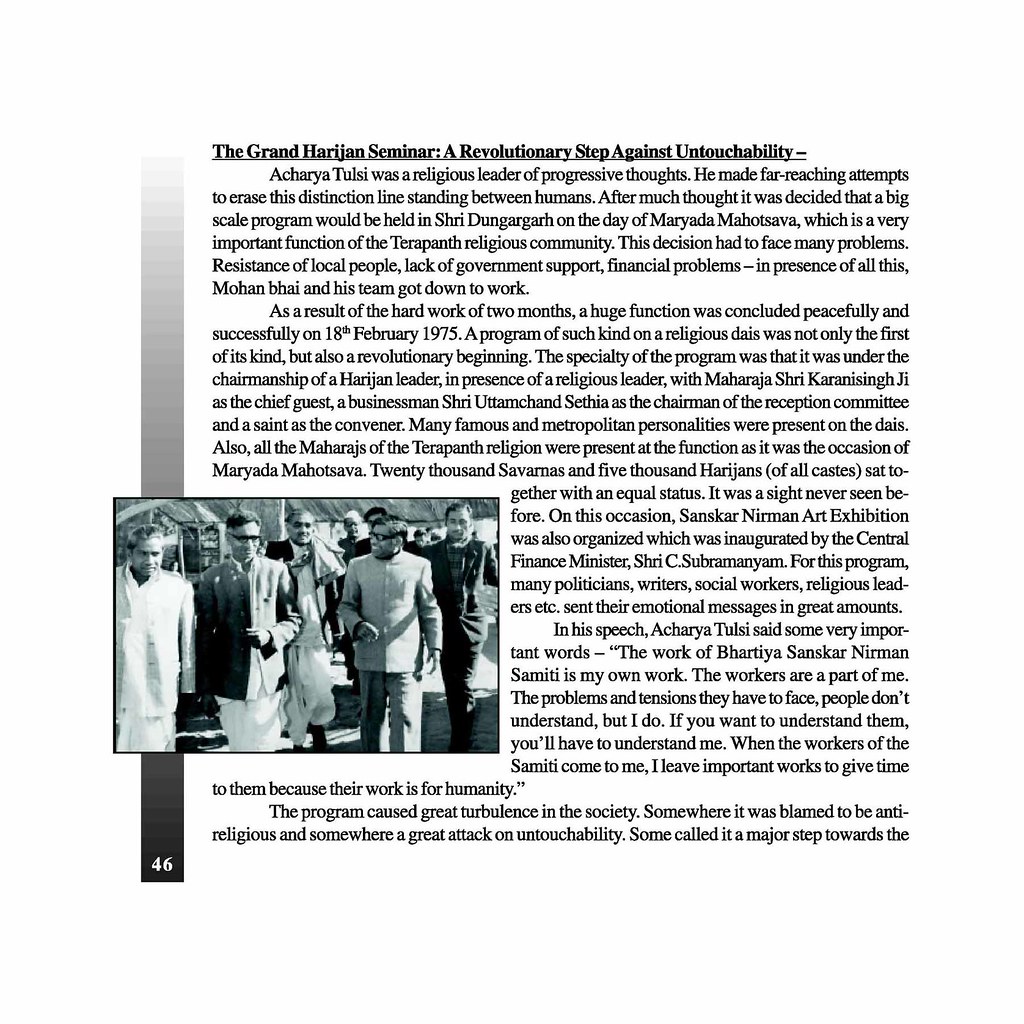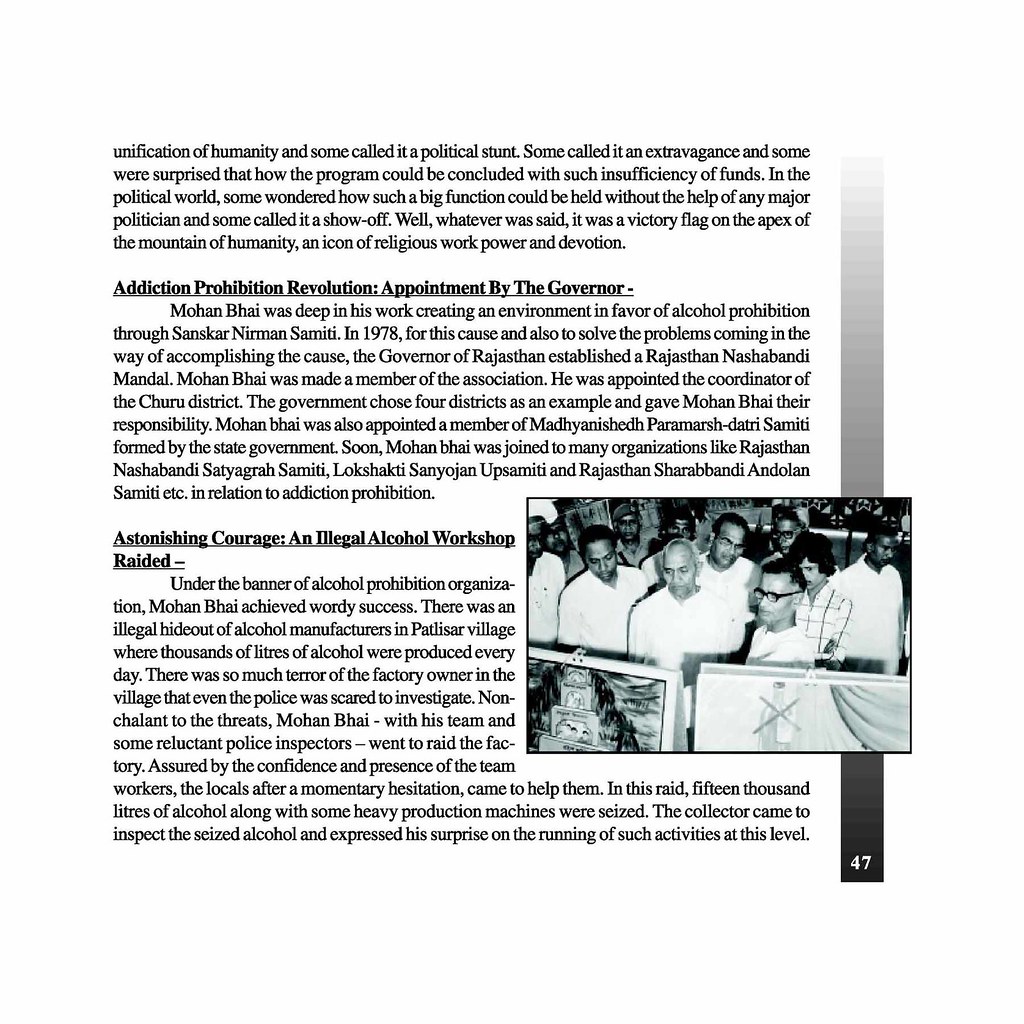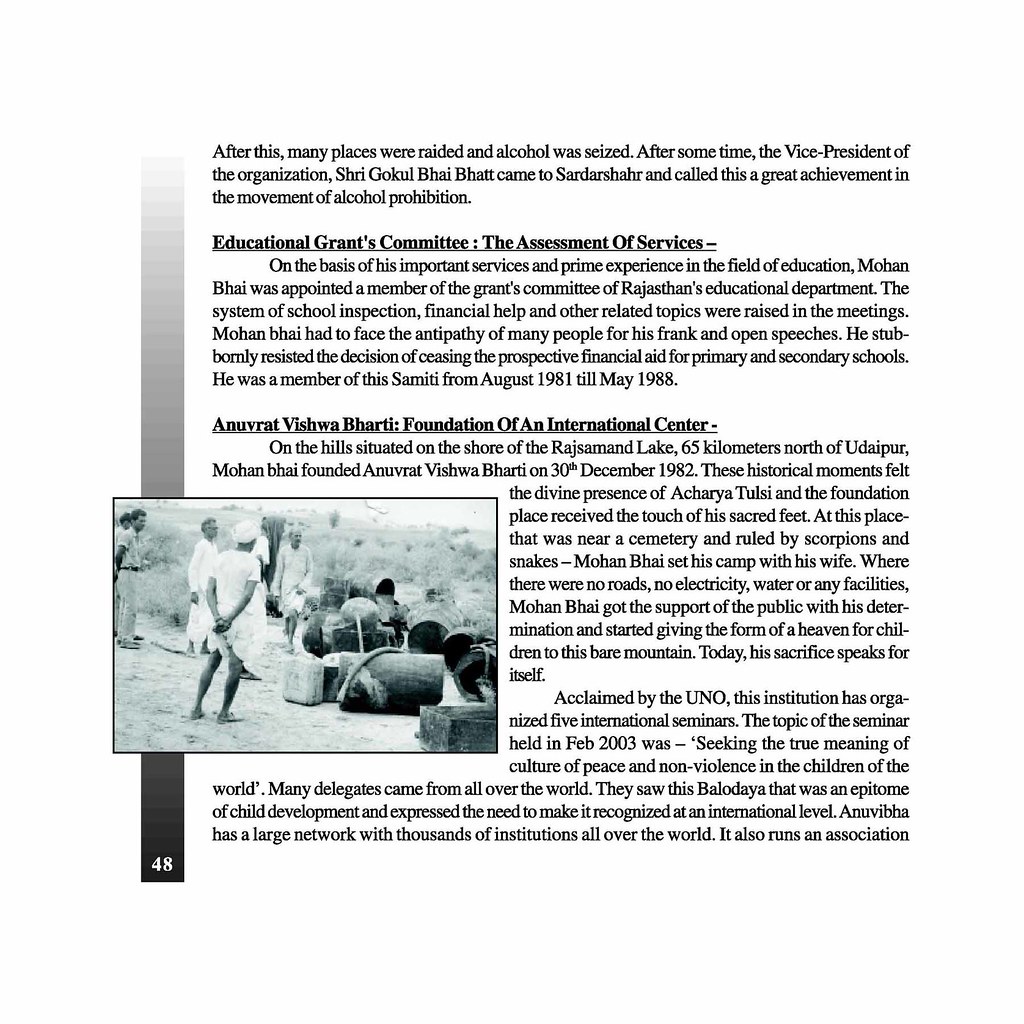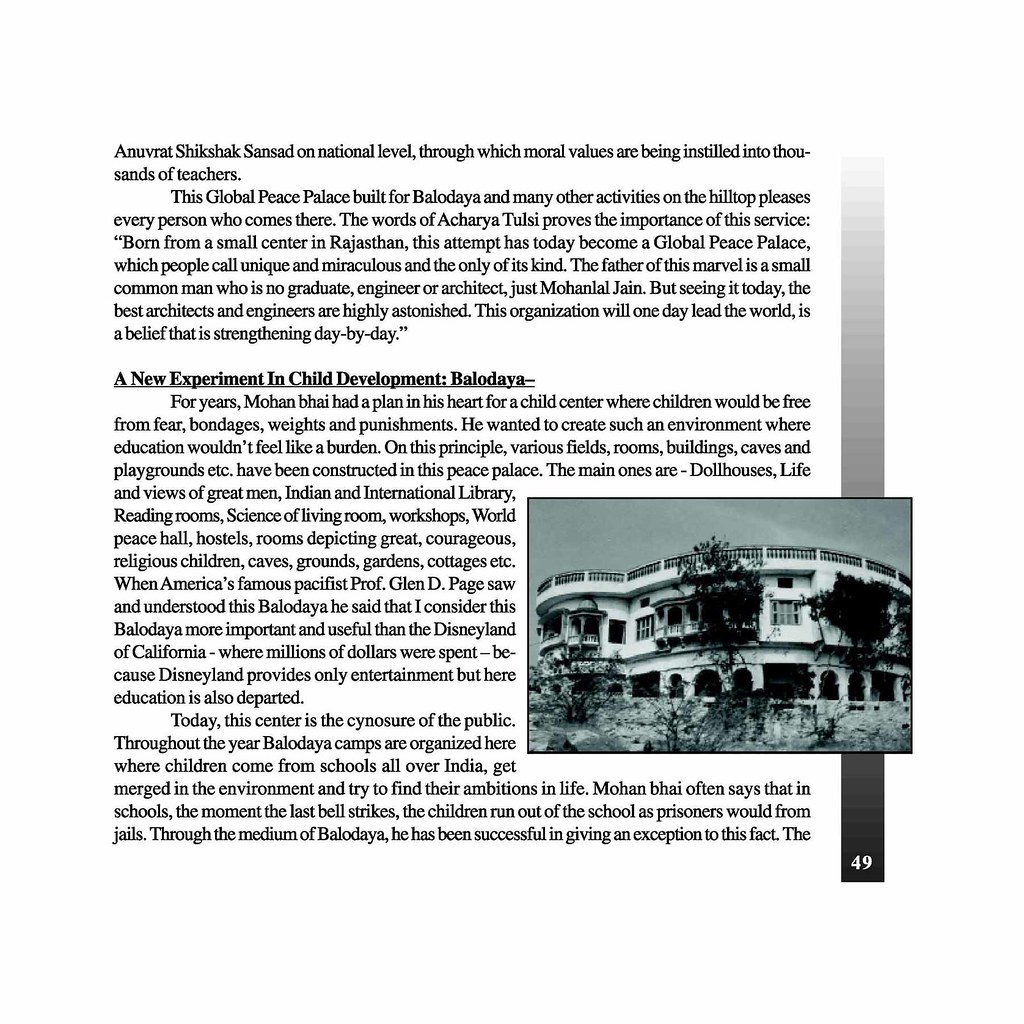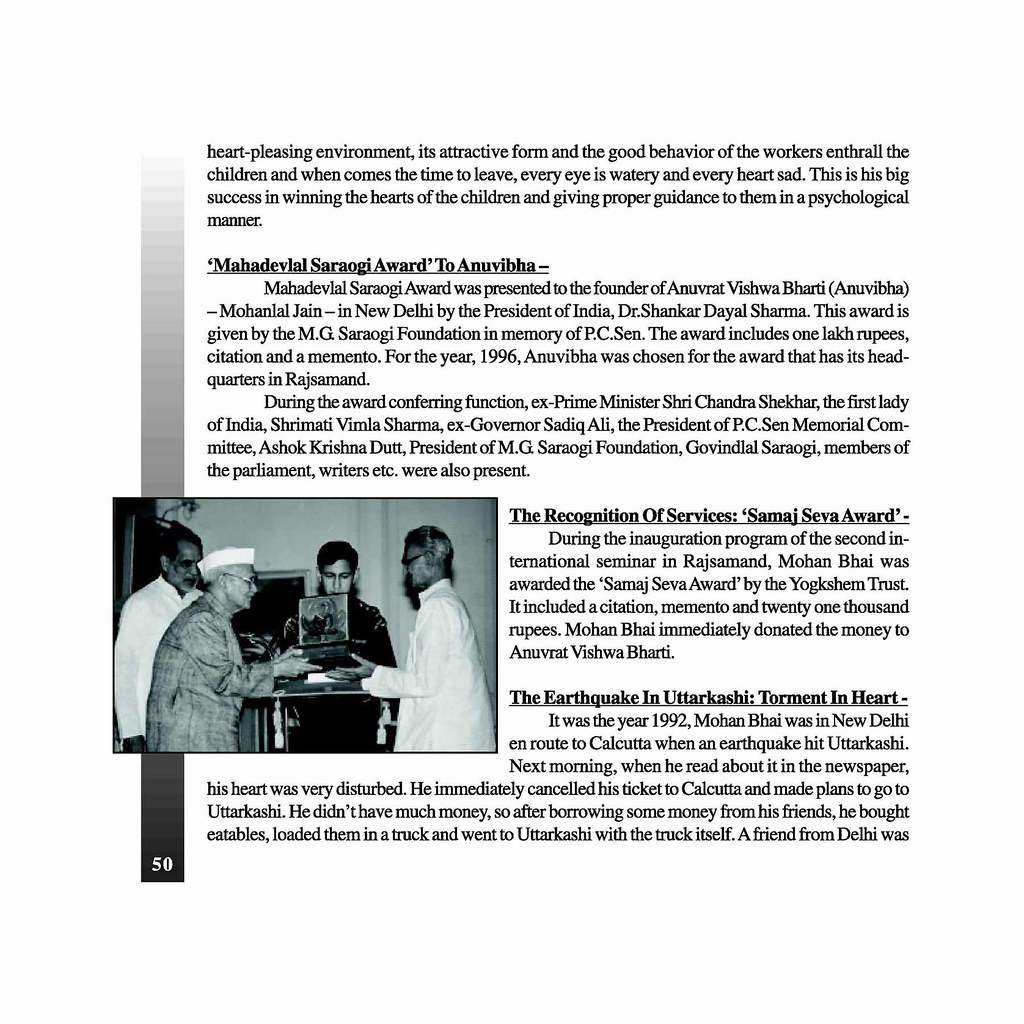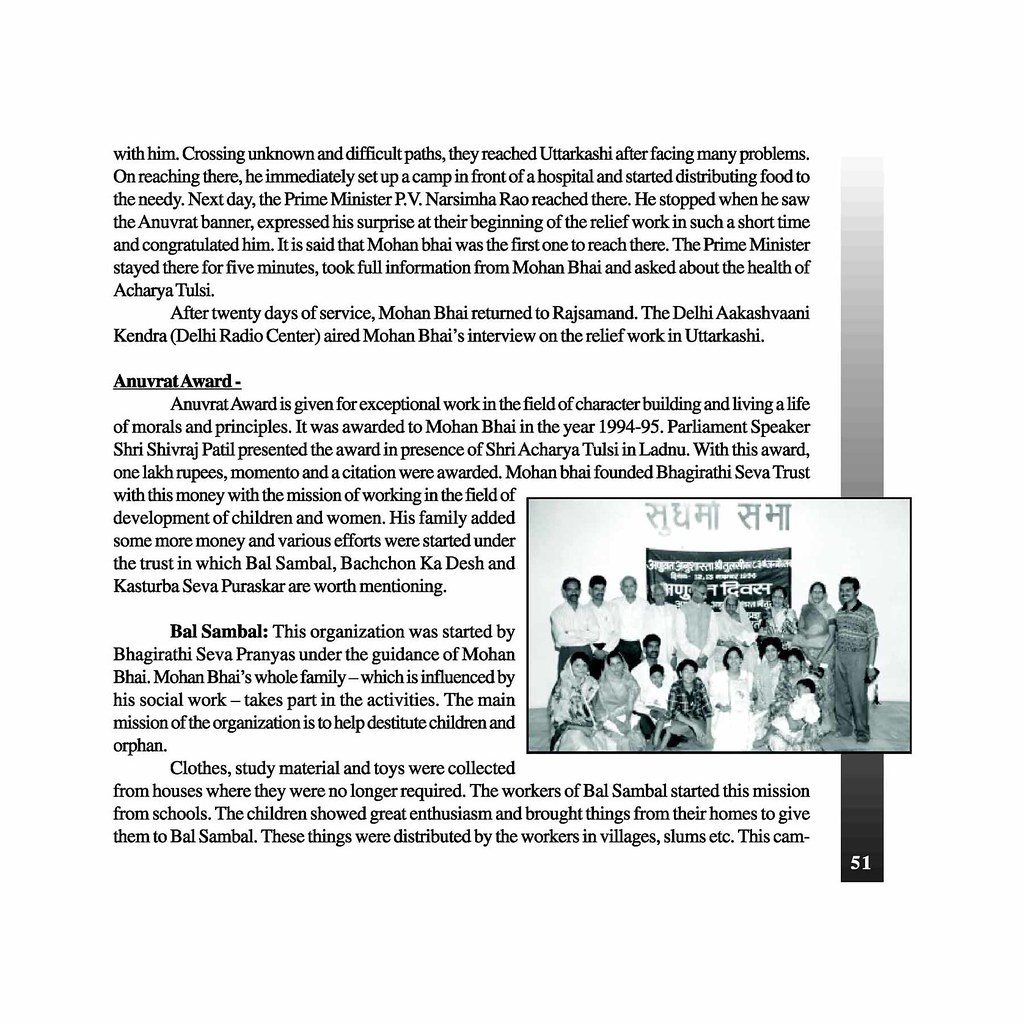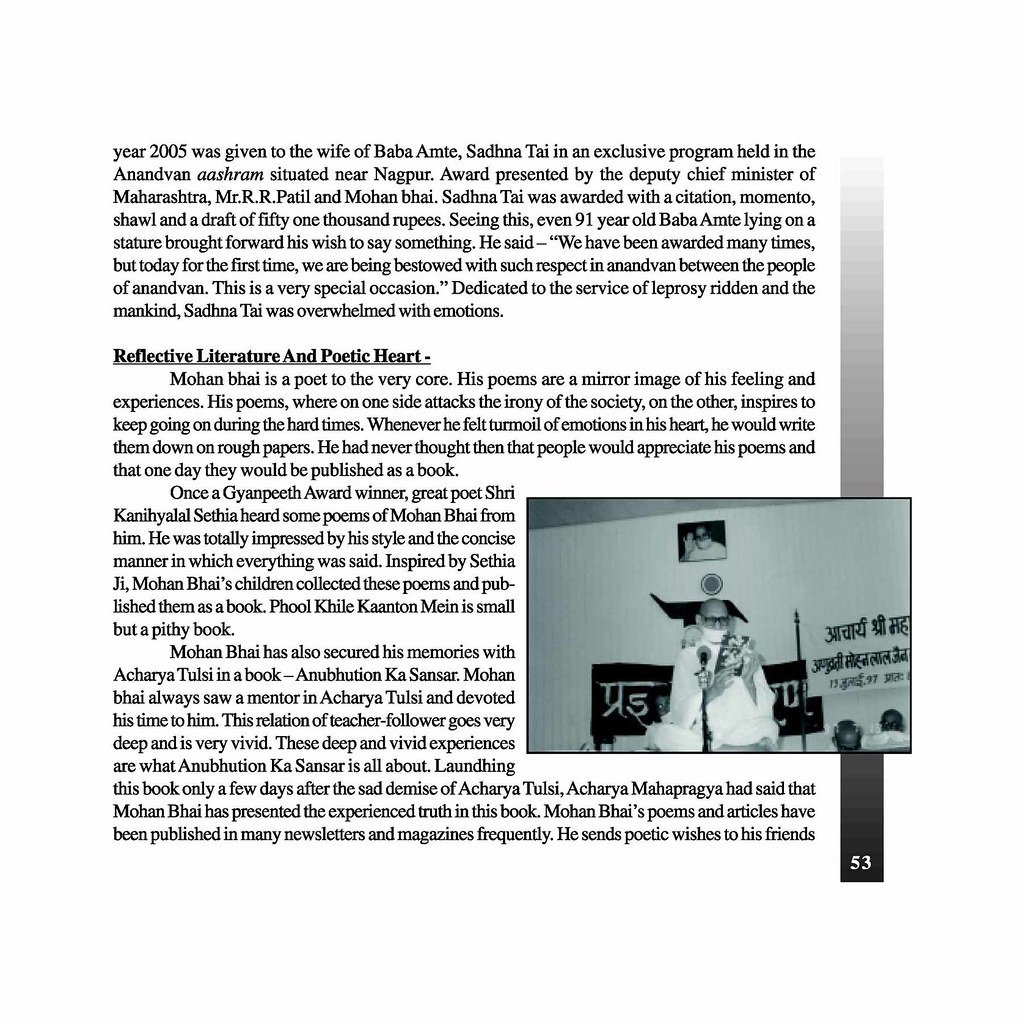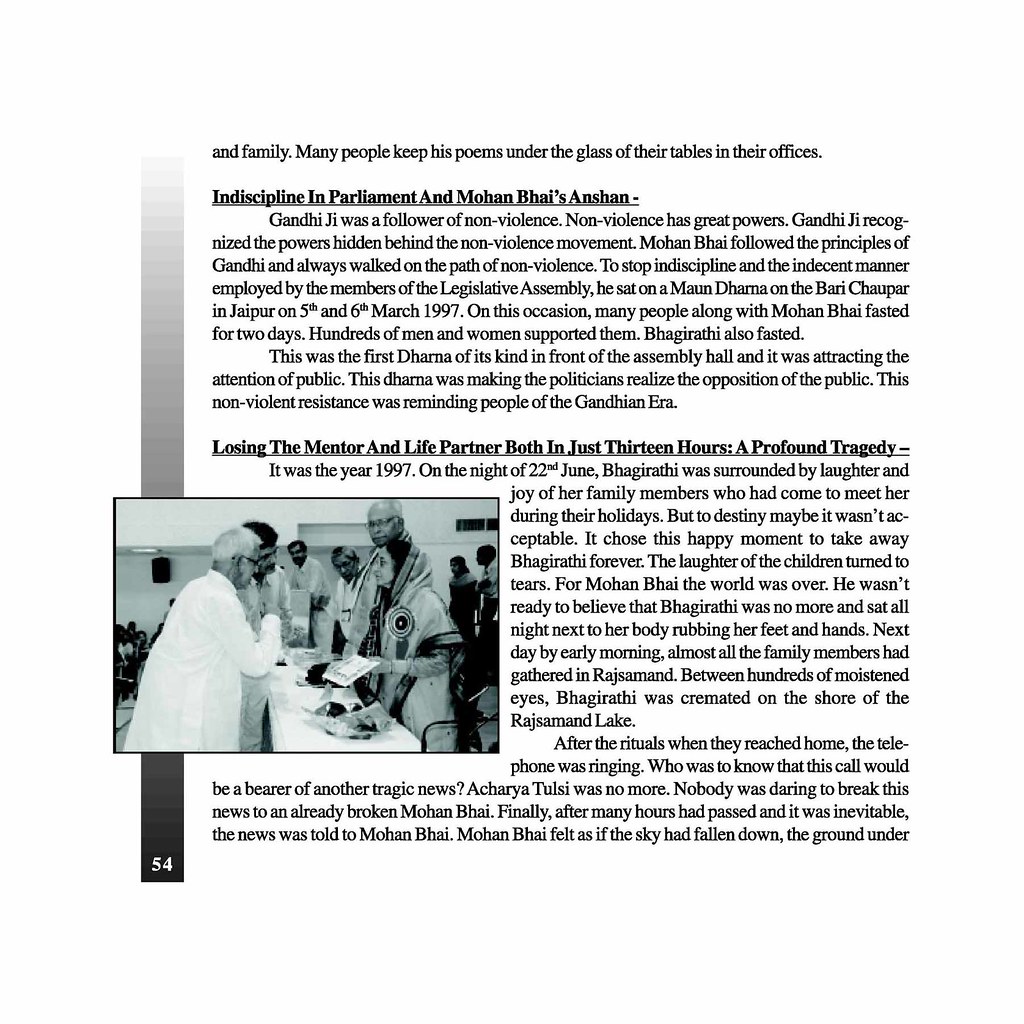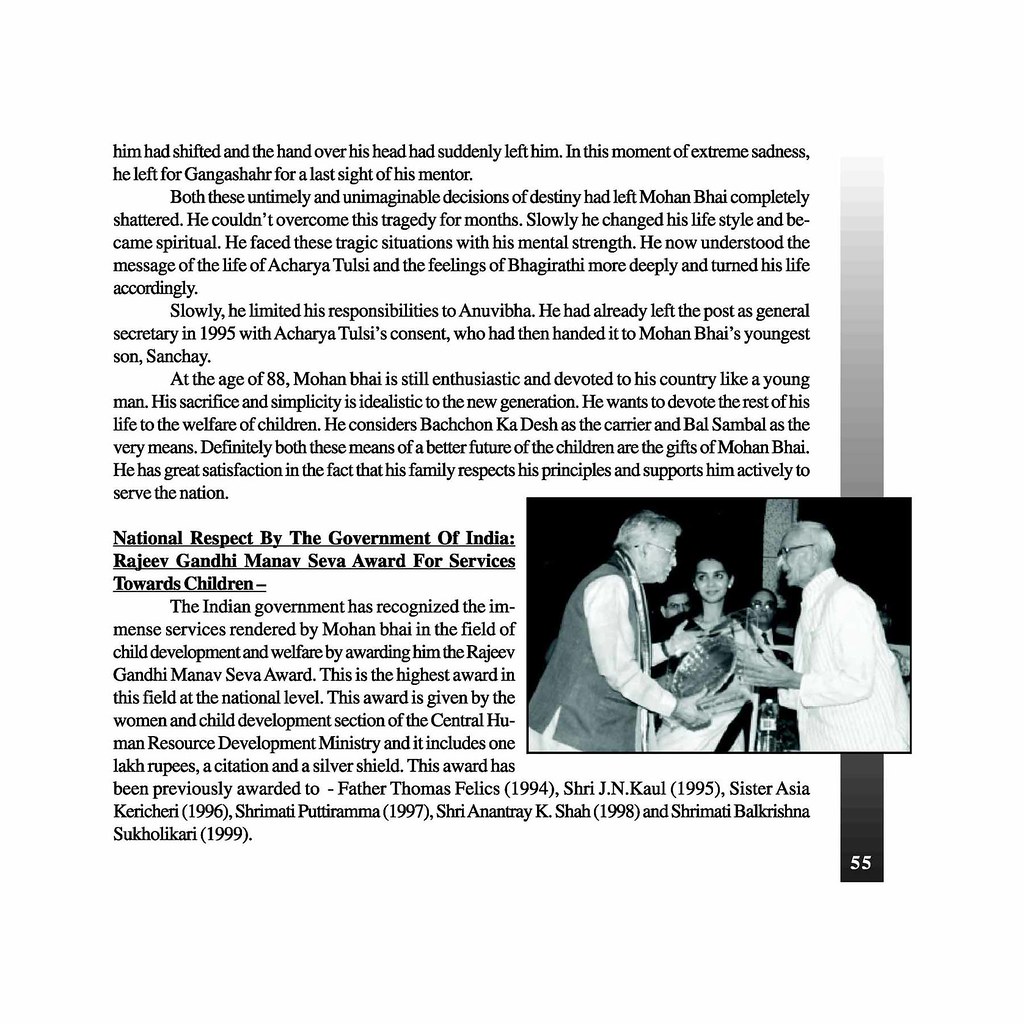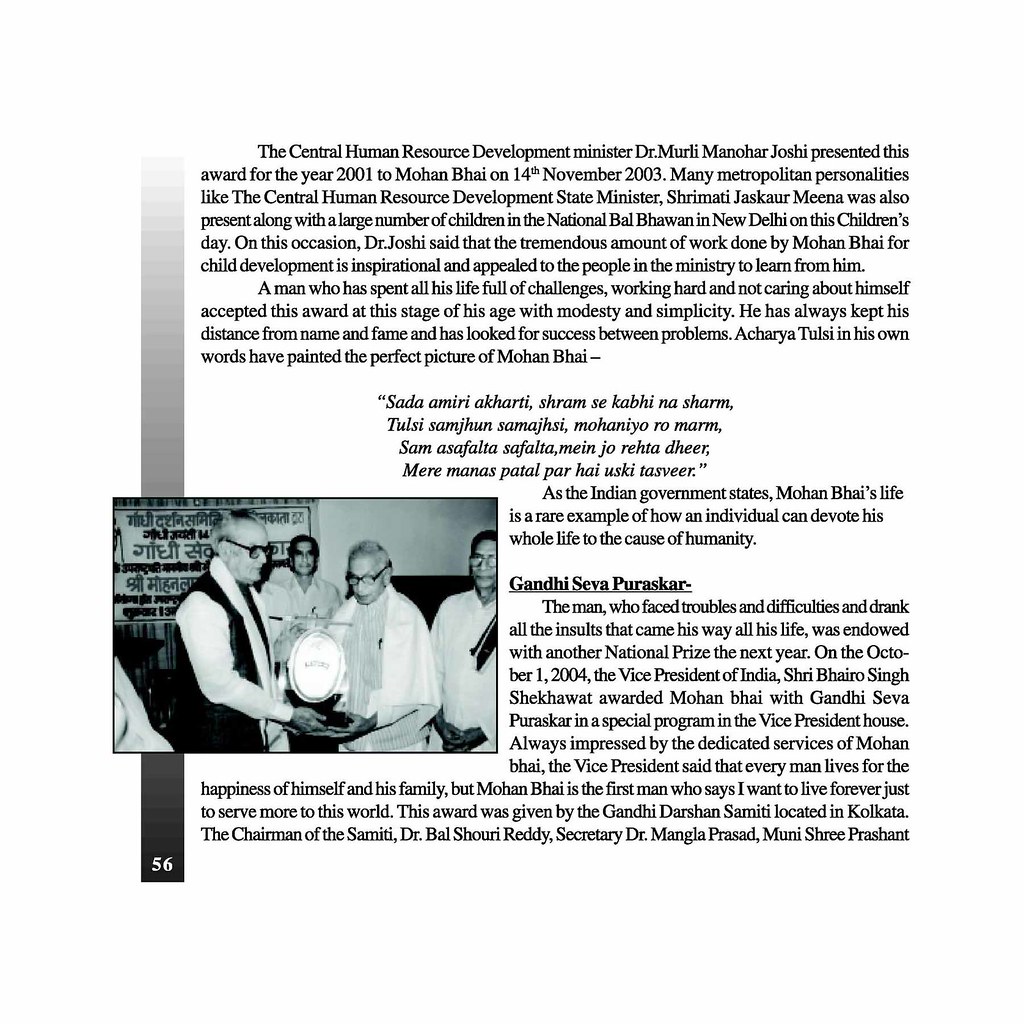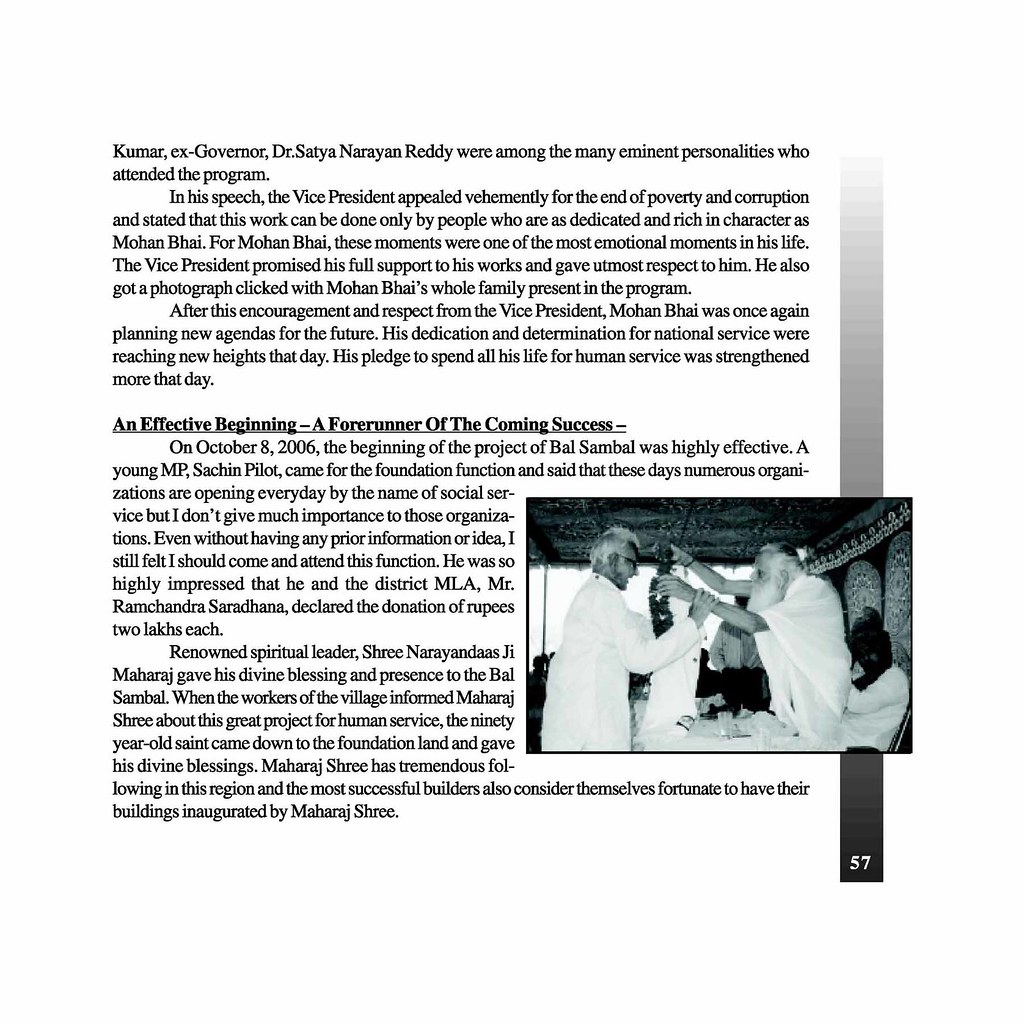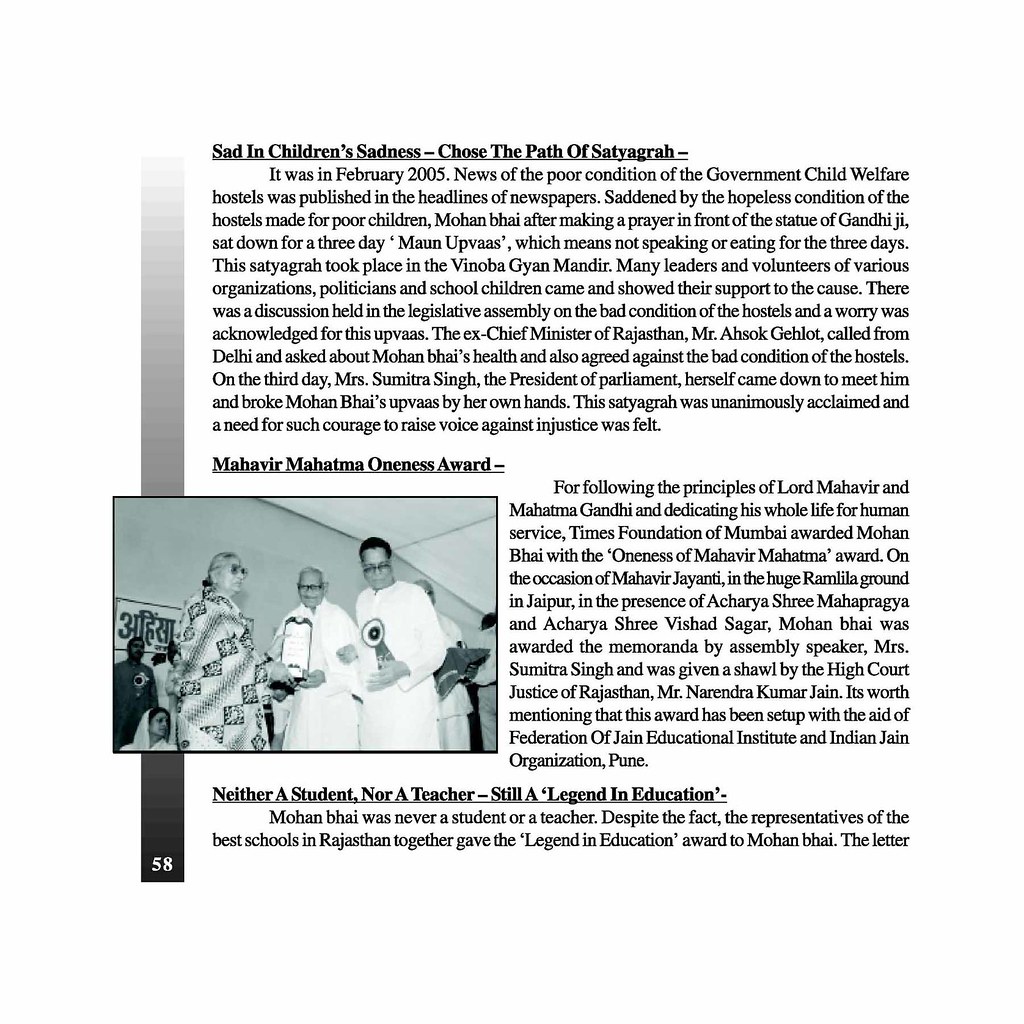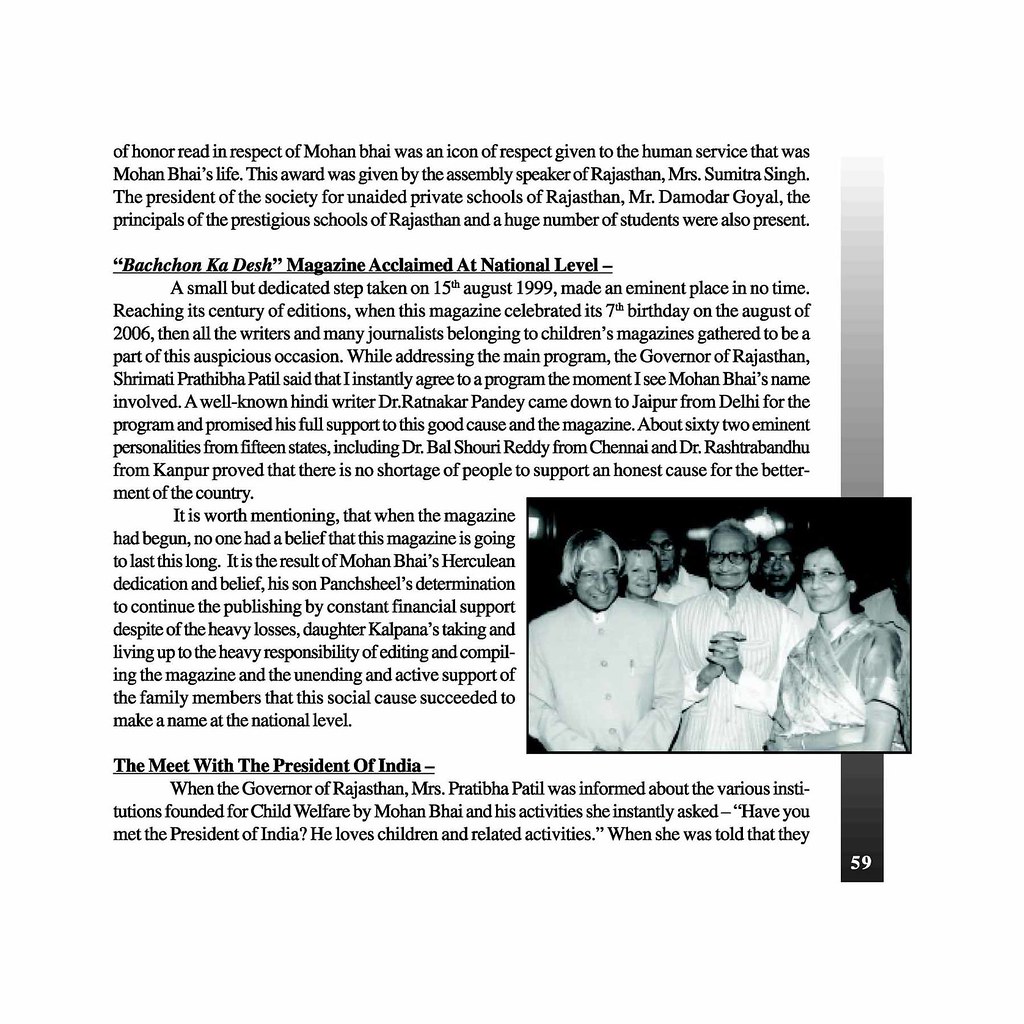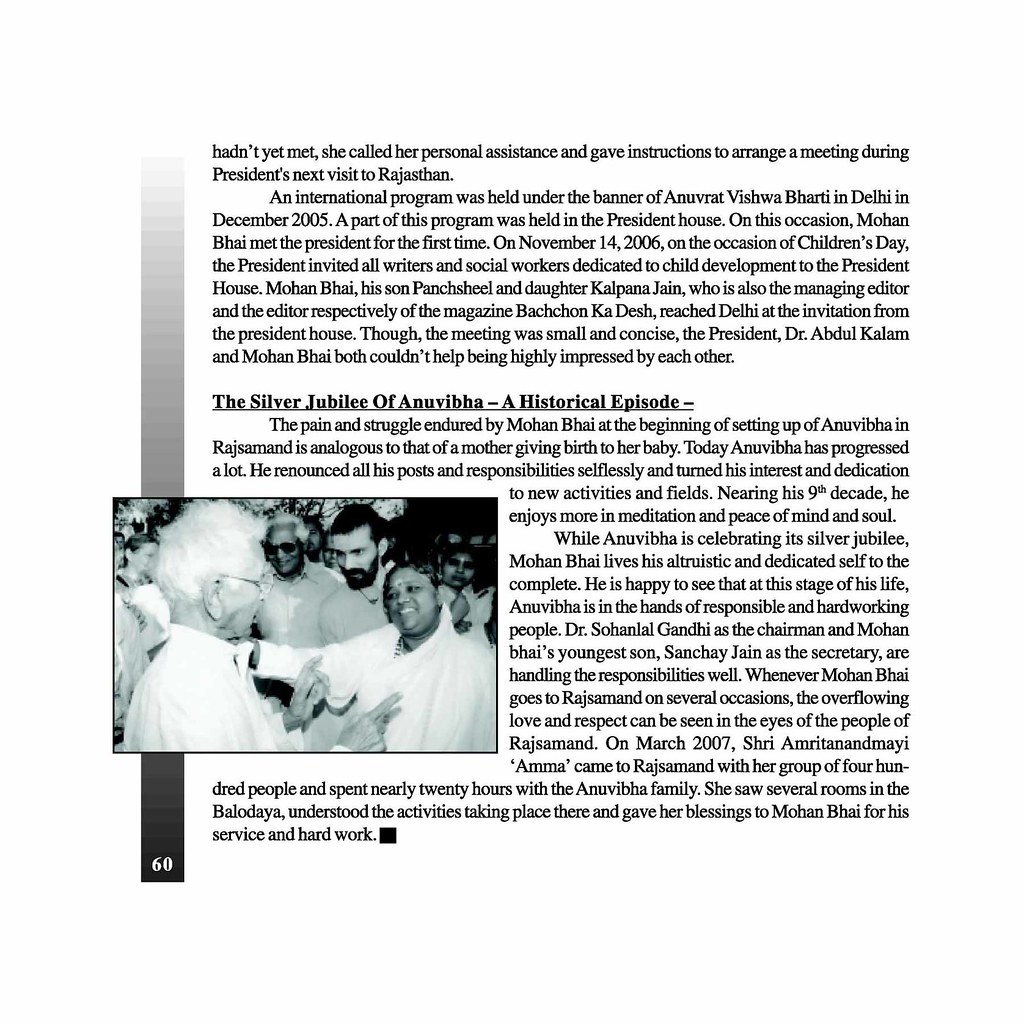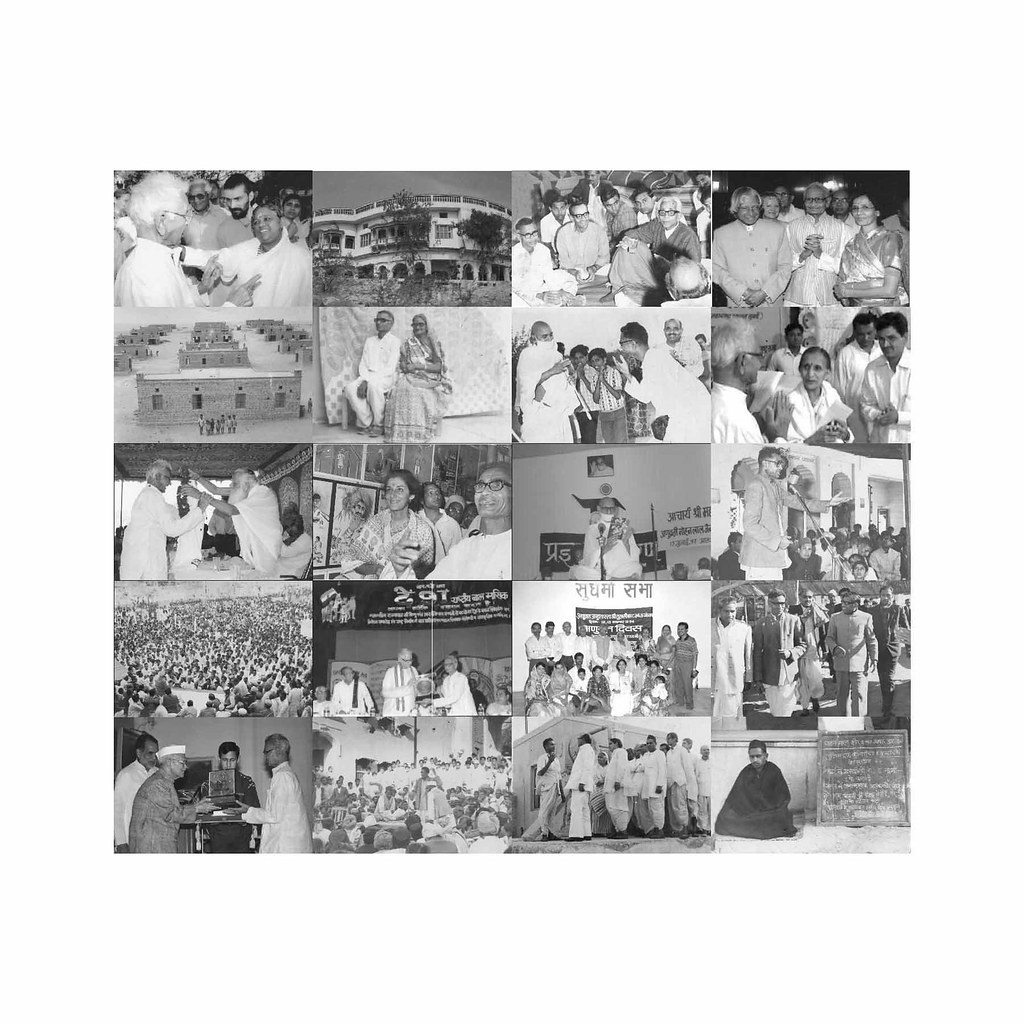Image version:
Text version:
MOHAN LAL JAIN
Seven Decades dedicated to the Service of Humanity
Introduction
Shri Mohanlal Jain was born on 24th September 1919 in Sardarshahr, district Churu, Rajasthan. He is the founder of the institution ‘Anuvrat Vishwa Bharti’. He has strongly supported harijan service and child education and has always worked actively against social rituals and taboos like dowry system, purdah system, child marriage, liquor addiction etc. Mohan Bhai, a staunch Gandhian, has led social reforms through moulding the new generation in the right direction. He has dedicated his entire life to the all-round development of children.
Though he was born in a prosperous Jain family, Mohan bhai chose a difficult path of social service. He faced strong reaction from the society and family because of his involvement with harijans. At the age of 16 years he joined the Independence revolution in Sardarshahr and was the first person who dared to start activities related to the freedom struggle in their area. Shri Mohanlal Jain founded the first educational institution ‘Bapa Seva Sadan’ for harijan children. Since then he has established several institutions in last 50 years. Some of which are Bal Mandir, Balika Vidyalaya, Gyan Mandir, Balbari, and Bhartiya Sanskar Nirman Samiti etc.
Mohan bhai’s life is a rare example of how an individual can devote his whole life to the cause of humanity. For his dedicated social work since 1934, he is being conferred the ‘Rajiv Gandhi Manav Seva Award’, for the service to children for the year 2001.
An excerpt from the citation published by the Central Human Resource Development Ministry on the occasion of being awarded with the ‘Rajiv Gandhi Manav Seva Award’ by the government of India.
Birth and Childhood
In the western far lands of Rajasthan lies Bikaner, a town circumscribed by deserts. A small village of this region, Sardarshahr, today is self-dependent in every aspect be it politics, finance, social welfare or education. Only a few decades back, it used to be a village clouded by superstition, discrimination and lack of education. The men of most of the families migrated to Bengal, Bihar or Assam in search of employment and finally settled there. This was the picture of Sardarshahr and its neighboring villages about a century back. For years, the wave of freedom had not touched them. People were used to the rule of kings and zamindars and thus, never felt the desperation for freedom. Due to religious and social narrow-mindedness, social work was close to negligible and the little that did take place was lost somewhere between the opposition.
In this superstitious and traditional environment, Mohan was born on 24th September 1919 in Sardarshahr. Being the fifth and last child of father Dhanraj ji and mother Dhapidevi, Mohan got lots of love and affection. He had two elder brothers and 2 elder sisters as his siblings. The environment in the house was very religious. Mohan’s mother, Dhapidevi, was a pious lady who was very simple, helpful and affectionate. Being part of a Jain family, she went to saints four times a day, listened to their preaching and was always ahead in religious affairs, meditation and tapasya. She always helped sick and grief-stricken people. On the other hand, Mohan’s father, Dhanraj ji was a highly egoistic and talented man who was very particular about his habits. His pan came especially from Benares, his clothes were washed in Calcutta and rosewater was used for his hukka. He had diverse interests.
In Calcutta, they had a joint family business by the name of ‘Chauthmal Dulichand’. Their firm had a good reputation in Calcutta for imported clothes. Dhanraj ji didn’t spend much time on his business. His deep interest lay in Ayurveda. He had deep knowledge of Nerve Science and herbs. He had made his special place in Ayurveda medication. He gave more importance to his interest in Ayurveda than to money and so to maintain his self-respect, he reduced his share of partnership from the firm. A strict follower of moral values, Dhanraj ji never compromised with his pride.
Childhood: the color of religion
In the midst of all this, an incident occurred that changed the life of this family completely. At the young age of 40, Dhanraj ji left his prosperous family to become a Jain saint. This was a strange and complicated situation because they were financially sound, socially secure and very happy. This was a tough time for the family. Mohan was just a 3-year-old at that time. His mother was now facing a big question of managing the house and getting them all married. The simplicity and purity of Mohan’s mother gave them the courage to fight the circumstances.
The religious environment of the home kept intensifying. These circumstances had left a deep impact on the softhearted Mohan. He started getting attracted towards religious activities. On seeing this, his family admitted him to a Madarsa, but he did not like it there and constantly fled to the saint’s dwelling. The indifference of teachers, physical punishments and the reiteration system of education made him repulsive to schools and further attracted to religious practices. Mohan was also sent to a compulsory school run by the government, but he couldn’t study there for long. A tutor used to come at his maternal house. Mohan used to study there sometimes with his cousins. This way, though he learnt how to read and write, he never acquired formal schooling, as he couldn’t appear for any exam.
By the age of nine, Mohan was so deep in religion that he started walking barefoot, spent most of his time with the saints and had learnt by-heart the most difficult mantras of Jainism. He used to fast regularly. His family started worrying about his deep interest in religion. He had decided to become a saint. Kalugani maharaj of Terapanth sect personally knew Mohan. When he turned thirteen, he succeeded in getting his Acharya’s consent that if his family approved Mohan would be given Diksha. Now, Mohan devoted all his time in proving his sanctity and purity and started working towards his goal.
Fight against social dogmas
However, destiny had something else in store for Mohan. After eleven years of sainthood, Mohan’s father, Muni Dhanraj ji made an unimaginable decision. To maintain his self-respect and grace of sainthood, he sacrificed sainthood. Muni Dhanraj ji had been given responsibility of treating an ailing saint because of his known knowledge in Ayurveda. But a prominent disciple was of a different view than that of Dhanraj ji in this matter. This difference could not be solved and instead of indulging in any kind of controversy, he decided to forgo sainthood.
The sacrifice of sainthood at that time was an unimaginable and unacceptable thing and thus, this caused great turbulence in the society. The so-called leaders of the society threatened to outcast the family. Dhanraj ji though had not given up sainthood to return to his family. He stayed at his friend, Dr. Shyam Narayan’s house for a day, but the society terrorized and troubled him so much that he left the house at midnight for Allahabad, where no one knew him or no terapanthi lived.
The torture, however, had not ended for Mohan and his family. They were not even lenient to the innocent Mohan or his mother and made it impossible for them to even step out of their house. At this time, his dream of sainthood was at its prime. This incident shook his resolve tremendously. Mohan could feel the pain of a flowering bud being crushed ruthlessly. Religion, which Mohan had accepted as his work-area, now seemed more like a war-front. He considered society as his family, but today, the society had left him alone in the world. A desire to revolt was growing in his heart. Being a silent audience to this incident all through, he could feel the pain in his heart for months incessantly.
Though his family never spoke a word to the society, Mohan never lost any opportunity to speak up without hesitation in front of the leaders and Mukhiyas. After all, how long could one live in the suffering and pain? By now, he had forgone his decision to become a saint. In fact, the behavior of the society had just the opposite reaction on him and he was driven to the path of revolution. It was prohibited by the society to meet Dhanraj ji. Nobody in the family went to meet him. Mohan could not tolerate that some third person could stop him from meeting his own father. Without giving society and family a second thought, he left for Allahbad to meet his father. Such a brave step from a fifteen year old was an indication of the future that lay ahead of him. Mohan’s mother and elders of the family started worrying about him night and day.
They were realizing how Mohan’s heart was being deeply affected by these incidents. To take his mind off from all these tensions and set him up in business, they sent Mohan to Calcutta.
He joined the family business in Calcutta. They wanted him to forget everything and concentrate on business. He was prohibited to meet his father on family level too now. Mohan could not concentrate on business. He couldn’t even get familiar to the environment there. Even after the ban, he went to live with his father, who had now shifted to Lucknow. Mohan wanted to stand on his own feet and become financially sound. For that he needed his father’s consent, who refused. Dhanraj ji had gained great fame for his deep grasp of Ayurveda and effective medication. He had close contacts with the nawab family and had made great progress in the field of medicine. He was honored with an ‘A’ certificate from the management without any formal educational degree. In these conditions, Dhanraj ji didn’t want Mohan to work for financial reasons. In this way, Mohan spent few indecisive years between Sardarshahr, Calcutta and Lucknow.
Marriage: Fight against the orthodox
Whenever the topic of his marriage arose, Mohan would disagree. When pressurized too much, he would run away. One night, when Mohan was sleeping, his mother came and sat down holding his feet. When Mohan felt the sensation and got up to see his mother holding his feet, he got scared and requested his mother to leave his feet immediately. His mother said - “I will not, until you agree to get married.” Mohan respected his mother too much. He gave in to her wish and only then did his mother leave his feet. She made him promise that he would not run away. Tied by his mother’s promise, a marriage was decided between Mohan and Bhagirathi, the daughter of the famous Chindalia family. His heart kept opposing this decision. He wanted to run away and disappear somewhere. But his mother’s words kept him bound; he couldn’t break his promise.
At that time, many rites and rituals were associated with marriage. Mohan fought against them. He broke many traditional rituals and superstitions. In some cases, he also stepped back due to the pressure by the elders of the family. He was laughed at for not participating in these rituals. His in-laws even named him ‘Jaat-javai’. At the time of marriage, Bhagirathi was a mere 10-year-old girl. She was illiterate. Mohan taught her how to read and write and tried to make her a partner in his style of living. Simple and innocent Bhagirathi slowly molded herself to Mohan’s beliefs.
The first lesson of patriotism
After some time Mohan went back to Lucknow to be with his father. In Allahbad-Lucknow, with help of Shri Sohanlal Baid, he succeeded in acquiring a confectionary. Sohanlal ji was an acquaintance from Sardarshahr who had close ties with Mohan’s family. After lots of difficulty, he managed to get his father’s consent also. Mohan worked hard and smart and soon money started coming in. The company was gaining reputation in its field. Seeing his success, some jealous opponent acquired his company by unlawful methods and deception. Saddened by this, Mohan quit this work and left for Benares. When Sohanlal ji got to know about this, he tried his best to dissuade Mohan and stop him from going to Benares. However, Mohan had made up his mind and one day without telling anyone, he left. He had no money with him. He kept walking, and was thoroughly exhausted. With the desire to go to Calcutta, he went to the railway station, and requested people, but no one was ready to take him along. Finally, he slept on the platform. Sohanlal ji, with his manager, was searching for Mohan and found him lying there. He was very angry. He felt deep empathy for Mohan. He believed that this egoistic, hardworking and brave man had immense capacities. He somehow convinced Mohan to come along with him. On the shore of Ganges, he rented a boat and set out for a sail with Mohan for two hours. Sohanlal ji was a very patriotic man. He was always well informed of the Independence revolution and was a follower of Gandhi. He told Mohan lots of stories and incidents of patriotism. He told him about the freedom revolution and about Gandhi. On hearing all this, Mohan felt his heart fill up with patriotism. He could now see his future. Sohanlal ji had given a new direction to the fire of revolution inside Mohan’s heart. The next day he gave some money to Mohan to go to Calcutta and so once again, Mohan was in Calcutta.
Road to self-dependence - Inviting trouble
By the time he reached Calcutta, Mohan had made his decision. Now he was thinking of earning. Joining his family business or some service was not his idea of work, and hence, out of question. On the Siyaldah station, he saw a man selling vests and shouting to attract customers. Mohan saw an acquaintance from Sardarshahr standing nearby. Mohan talked to him and joined the vest-seller on his stall. Now with his companion, Mohan also started selling vests and shouting loudly - “Four and a half annas!” in front of a dilapidated house on the Siyaldah station. This was his routine from evening 4 o’clock to night 10 o’clock. Living on the footpath, sleeping, bathing, washing on the footpath and using the railway restroom when needed- this was his life. Profits started coming in soon. He donated all the expensive clothes of his marriage to the poor and destitute people. He bought a khadi dhoti, a kurta and towel and swore that from that day onwards he’ll only wear khadi. All this was the result of the patriotic flame in the heart of Mohan kindred by Sohanlal ji.
Whenever there were any rallies of freedom fighters, Mohan took part in them and shouted slogans enthusiastically. He also took part in seminars and meetings. In this way he tried to give maximum participation to the freedom revolution and gain as much information as possible.
When his family got to know about his movements and his life on the streets, they were very anxious. It was a matter of honor for this well-known family. Everyone tried; even Sohanlal ji offered a job to Mohan in Benares. After too much pressure from his family, Mohan finally had to accede and with a heavy heart he left for Sardarshahr. Mohan’s life was like a battle between certainties and uncertainties between Calcutta, Lucknow and Sardarshahr. Worse the circumstances, the stronger he became. Where at one side he was desperate to flee away, social and family bondages kept him bound. He wanted to loose himself in the freedom struggle and social service, but his family and the social environment made it impossible.
Solving the society-family confusion
Mohan once again tried to end these uncertainties. This time when he left Calcutta, he left because of some acrimonious words and bad behavior of a family person. Mohan’s maternal cousin, Chandmal Dugar loved Mohan a lot and understood his feelings. His behavior made others jealous and their haughty comments pricked Mohan’s heart like arrows. Mohan wanted to go to a place where nobody would know him and nobody could gratify him. Chandmal ji tried to offer him some money, but he refused. With a mere 100 rupees, he left for Delhi. Where to go now - Mohan had no idea. He had very less money. In the enquiry office, he asked the price of the tickets to various places. Finally, when the officer got frustrated, he took the ticked to Lahore. He went to the restroom of the train, stood in front of the mirror and asked himself - “Look Mohan! You are facing a crucial situation. Where you are going, nobody knows you. Say, Lahore or Sardarshahr?” A voice from deep within cried out - Lahore! And so, Lahore it was and he went and sat on his seat.
After reaching Lahore, he met many leaders and visited many khadi workshops. He requested everyone - “Keep me with you for work. I don’t want money, just food. I’ll learn a lot from you.” But no one believed him. On someone’s advice he went to the khadi production center in Adampur, but there too he faced disappointment. Spending 6 annas everyday, his money would soon be over. Mohan went to Jalandhar, but there too no one understood him. Finally, after wandering aimlessly, he reached Amritsar. He was just leaving the guesthouse after keeping his luggage there when someone called from behind - “Seth ji, Seth ji!” When he turned around, he saw that a man, Sardar Harisingh, was calling him. A surprised Mohan went to him and told him his problem. Sardar Harisingh ji had a shop in the location of the family business of Mohan in Calcutta and they had very close relations. Sardar ji offered him a job and any amount of partnership Mohan desired, but Mohan politely refused and said he didn’t want any gratitude or help. Understanding his feelings, Sardar ji gave him an address from where Mohan bought a pair of scissors, an iron ruler and some cloth. He went about villages selling these clothes. When he had sold all and found himself with a profit of 6 annas, his happiness knew no bounds. 6 annas was his daily expenditure and he had succeeded to earn those 6 annas. Desolation finally left him. After three days, according to the rule, he had to leave the guesthouse. Sardar ji asked him to stay at his house, but it was not acceptable to Mohan. He slept on the footpath in front of the shop, bathed in the river and wandered in villages all day to sell clothes. Even after all this hard work and troubles, Mohan had put on 3 pounds of weight in 3 months because he was living his life happily at his own terms.
On the other side, Mohan’s family was very worried searching for Mohan. After receiving news from Sardar ji, his family members came to Amritsar. They told Mohan that his mother and wife are in a really bad condition and if he wanted to meet them, then he should come with them. Mohan’s emotional heart melted. After hearing about his wife and mother’s bad health, he couldn’t stop himself and came to Sardarshahr. When he reached Sardarshahr, he came to know that all this was a lie told to him so that he would return.
Youth enthusiasm
Now he had decided to stay in Sardarshahr and work for the country and society and so he started working for it with complete determination. For ten years he had wandered aimlessly with the fire of revolution burning inside. Now he felt the need for a teacher, a mentor, who could understand his feelings and show him the right way. But it seemed as if destiny had decided to be that mentor itself. Or Mohan himself had to make his way. That’s why, at the young age of twenty-three, Mohan invited many challenges and also faced them. Mohan had decided that he would take the responsibility of his family and work for the betterment of his country.
Mohan found his first mentor in Sardarshahr in Acharya Shri Gaurishankar. Under Acharya ji’s supervision, a Sahitya Samiti was formed in Sardarshahr where literature, national awareness and issues regarding freedom were discussed. The first thing Mohan did was to join the Sahitya Samiti. On the first weekly meeting of the club, everyone was supposed to speak for two minutes compulsorily. Mohan stood up, but could not speak anything. The next day, Acharya ji called him to his house and taught him the first lesson of confidence. He said –“Go alone to the sand dunes and speak loudly and practice speaking. Then promise to yourself that this is how you’ll speak in front of the public. When you are speaking, think yourself to be wiser than your audience.” Mohan found all this very strange but still followed it. In the next meeting of the club, he spoke and he spoke for the full 2 minutes, confidently. After that, he never looked back.
The beginning of the freedom struggle -
Mohan founded his first institution on encouragement from his colleagues and named it Gyan Mandir. The Sahitya Samiti gave him five hundred rupees as a loan. A cupboard in front of a tailor’s shop was the beginning of Gyan Mandir. Its main aim was the publicity of good books. Along with this, books on patriotism and moral ethics also started reaching the houses of the city. This initiative that had started with such a small step slowly grew out and started reaching the neighboring regions. Mohan devoted all his time to Sahitya Samiti and Gyan Mandir. Mohan had started enjoying going to villages with a box full of books and making contacts with libraries and homes. Profits started showing. So, he also started a khadi shop with Gyan Mandir. The dreams of patriotism and self-dependence were coming true. Now Mohan was yearning to join the freedom struggle. So, slowly he started working in this direction. There used to be meetings and discussions on the Independence revolution behind closed doors. They would go to the sand dunes when all was quiet and hoisted flags. Patriotic songs were sung together. At that time, Maharaja Gangasingh ruled the Bikaner region. He was not against the British rule and so any freedom revolution was crushed and suppressed before it could take any form. Any work associated with the freedom struggle was full of danger. In this situation, Mohan would go out at nights with his friends. Scribbling ‘Jai Hind’ on walls, slipping anti-governmental notes through the doors in shops and houses, sticking posters- these kinds of imminent activities begun. He also started sending articles to newspapers denounced the cruelty and injustice of the British rule. Thus, began the freedom revolution in Sardarshahr.
‘Bikaner Rajya Praja Parishad’
It was the October of 1943. A Bikaner Rajya Praja Parishad had been established in Bikaner. Wearing khadi was considered very dangerous and the Gandhi topi even more so. When Mohan started wearing Gandhi topi, the police started keeping an eye on him. Mohan formed a secret branch of Bikaner Rajya Praja Parishad with his 2 friends in Sardarshahr. Slowly, the number of members started increasing. Activities started picking up speed. He became more active in the freedom struggle. Noticing this, the police started looking for the man behind all this and Mohan was interrogated several times. A close watch was put on him. Activities went on surreptitiously. The police got more suspicious. At many instances, Mohan was sent to jail but he kept speeding up the struggle.
One day, the police arrested Shri Raghuvar Dayal Goyal and several others of his colleagues. They were sent somewhere under deception. When Mohan got to know, he couldn’t control his wrath. He started shouting – “Inkalab Zindabad”, “Bharat mata ki jai”, “Nadirshahi nahi chalegi”. All his friends joined him. This rally progressed. This was the first rally of this town against the British rule. Covering the town, the rally reached Gandhi Chowk. There, a meeting was held. Speeches were made. Police was criticized openly. This was the first public meeting against the government. The common people listened spellbound. Hundreds of them collected. It looked as if people were waking up from a deep slumber. The wave of awareness had finally washed here.
Now the Praja Parishad was established openly. All their secret activities were made public. Now they had the support of the people. Senior politicians started visiting this town. Mohan knew everyone. Thus, everyone stayed at his home during the visit. Bhagirathi supported him full-heartedly. She provided food to the revolutionaries and took proper care of the leaders who stayed at their home.
The foundation day of the Praja Parishad was celebrated publicly, the next year. A procession was taken out, but was interrupted by the police in between. The procession took the form of a meeting there itself. Speeches were made openly. People were acquainted with the manifesto of the Praja Parishad. The mass was encouraged to join the revolution.
Soon, excursions to villages also began. He went to those places with his colleague, Daulatram Saaran, where the zamindars were making the life of the villagers miserable. They could never find a place to stay, as the villagers were scared to accommodate the enemies of the ruler. They would thus, stay at public places or temples. During one such visit, some villagers came to him and told him about their pathetic condition. Mohan immediately began working on it. Police also came after him. Mohan raised his voice openly against this anarchism. He wasn’t scared of getting arrested. Hence, he stood against wrong with all his strength.
He was always a part of controversies for carrying the tricolor flag. In one village, a flag was hoisted in a farm of a farmer. Many Zamindars collected. They threatened to remove the flag themselves if it wasn’t taken off immediately. Chandanmal Ji Baid and Mohan accepted the challenge. The zamindars came armed and ready to fight. But at the end, the blessed emotion of patriotism succeeded. “Bharat mata ki jai” echoed everywhere.
Once, during another visit, someone took away the flag tied to their vehicle. Mohan sat on a ‘Dharna’ then and there. He said - “Till you don’t return the flag, I’m not getting up”. Though Mohan had to face many difficulties, he was adamant and got up only when the flag was returned.
Similarly, on 15th august, 1947, the symbol of the king’s rule - the red flag - was hoisted on the government building. One colleague, Pournachand Mimani expressed that the tricolor flag should be hoisted above it. Other friends took it as a joke and thought it to be impossible. But Mohan had decided that this had to be done. The job was definitely difficult. The red flag was very high. But he was not discouraged. Both of them started attaching sticks and with help of a wire started lifting it up. They dug up a hole and stabilized it there. The tricolor flag was hoisted above the red flag. Others were speechless.
Hardworking, honest and selfless - Introduction of the social worker
Between all the activities, when Sahitya Samiti was facing a monetary deficiency, Mohan sat on an ‘Anshan’ and helped them rise from the problem. Mohan’s hard work, courage, devotion and honesty gave him an identity of a social helper. Even after the cruel treatment by the government, his endeavor for independence had given him an image of a revolutionary.
Gyan Mandir’s mission of public awareness was on the move. Master Anupchand Chajher joined Mohan in this mission and together they gave Gyan Mandir the form of a huge library. During this, the king, Shadrulsingh assembled a ministry in which Acharya Gaurishankar was appointed as the education and railway minister of Rajasthan. Acharya ji told Mohan that he would give Gyan Mandir the authorization. Mohan should go and open stalls on the Bikaner state railway station and publicize the literature. This was a golden opportunity for Gyan Mandir. This could have made Gyan Mandir financially sound and more famous, but Mohan declined the offer. Mohan shared not only a public relation with Acharya ji but also a close family relation. Mohan did not want people to say that Acharya ji used his power of his position for the profit of his friends and that Mohan used his contacts with Acharya ji for his profits. This incident is a living example of the strength of Mohan’s virtues - honesty and integrity.
The coalition of Nagrik Seva Samiti -
At that time, the government controlled distribution of ration. People were facing problems in getting ration and the price of wheat suddenly went up. Mohan sat with his friends, discussed about the problem and founded the Nagrik Seva Samiti’. Ration was acquired from outside by the Nagrik Seva Samiti and made available to the public for reasonable price. Later, the Bikaner government gave the responsibility of ration distribution to this samiti. First in Sardarshahr and then in the whole district, this work was accomplished by the samiti. As he was the secretary, most of Mohan’s time and strength went in this. It proved to be very helpful in diminishing the problems of the people. However, when Mohan realized that this job could affect his participation in the freedom struggle and management of the Praja Parishad, he gave his responsibility of Nagrik Seva Samiti to others and resigned.
The deep impact of Gandhi -
Owing to his attachment to Gyan Mandir and Sahitya Samiti, Mohan started developing an interest in literature. He used to read books concerning national awareness and the freedom struggle. Though he could not take much time out from his social work, he read some weekly magazines like Bal Sakha, Baanar etc. He was always curious about the activities of Gandhi and however and whenever possible, he tried to gain more and more information about it.
Mohan enjoyed this immensely and started developing a great interest in it. Gandhi’s life was leaving a deep mark on Mohan’s conscience. He was already wearing khadi since the age of twenty-two. Active participation in the freedom revolution, going amongst harijans and working for them, fighting against social taboos - he thoroughly enjoyed all this.
Facing social resistance –
Though he walked on Gandhi’s shown path, these activities were not acceptable to the society. People stopped him at every step and pressurized him, his family and especially his mother. But Mohan’s heart was set against the society. He enjoyed doing things the society condemned. He didn’t ever care about the society. His mother understood his feelings. She could never forget the way the society had treated her. But when she got to know that Mohan used to go among the harijans, went against the government and was marked by the police, she could not stop her heart from crying. She would say to Mohan- “You never worship god and what kind of work you do! I get very scared.” But that simple hearted woman never made herself a hurdle in Mohan’s way and never openly opposed. She didn’t want to break Mohan’s heart or upset him.
Sitting with Harijans: No entry in kitchen -
India attained independence on 15th august, 1947. The whole of India was rejoicing. In every village, there was an atmosphere of festivity. With the happiness of freedom, the country was also feeling the pain of partition. The central ministers were in a dilemma but the common people were relieved and happy because the British rule was finally over. The whole independent India was seeing Gandhi as their hero. In Sardarshahr also there were celebrations. Mohan’s happiness knew no bounds. There were functions all week. One day, the celebration was held in a harijan community. The teachers and students of the Harijan School were offering Supari and Elaichi to everyone. Mohan and his friends too had their share. For Mohan, there was nothing wrong in it. When they returned from the harijan community to the market, people surrounded them and asked - “ Did you eat with the harijans?” All his friends said no and got rid of the situation, but Mohan said –“Yes, I did.” People got very angry when they heard this. They also threatened to outcast him. What not they said! Mohan, however, did not worry at all and challenged them to do whatever they could he did not care.
When Mohan reached home, his elder brother, Ranglal ji Dassani, was really angry. The news had spread in the whole city like forest fire. Mohan’s mother said - “Mohan, what have you done? You ate with the harijans?” Mohan’s brother was so angry that he said severe things to his mother and said that her excess love had spoilt him. He even said that neither is he ever going to eat with him nor will he keep any relation with him from now on. He said to his son too - “Dare you come here and eat food”. This incident made Mohan’s mother very sad. The society women had told her that the saints wouldn’t come to her place for Bhiksha now. Scared of this, when Mohan came at night to his mother for dinner, she did not let him come in the kitchen and took him to the terrace and fed him. Mohan kept eating and his mother’s eyes kept watering. This went on for 2-3 days. Finally, when Seth Shri Sumermal Dugar assured her that the saints would still come to her house for bhiksha, she took Mohan to the kitchen and served him food very lovingly. His mother was a goddess of love, but Mohan received lots of wrath and insult from his family. Even his in-laws insulted him but Bhagirathi gave her full support and devotion to him. She had to tolerate venomous comments from the society women. Even if she didn’t like some of the things Mohan did, she kept watching silently and patiently. Mohan knew he was on the right path and that sooner or later the society will accept this too. With full determination, he kept walking on his chosen path and kept facing resistance bravely.
The ray of hope for the harijans -
When the country attained independence, Mohan’s interest shifted from politics to educational activities. The name of this diligent, zealous worker, Mohan, was getting famous far and wide. As Mohan ji or Mohan Bhai, he was looked upon respectfully in social and political spheres. This young man of twenty-eight years was now like a ray of light to the harijans, meghwal and mehtar communities who were considered as untouchables and outcast there. Mohan worked in their communities, provided proper facilities and provided education to children. He was now the cynosure for these constructive thoughts and ideas.
Emancipation from Purdah system: A revolutionary step -
Although India had attained independence, freedom for women was still a dream. All women stayed behind purdahs. Due to the strict social customs and rituals, stepping out of house without the purdah was impossible for women. Even in their own homes, they had to keep the veil in front of men or elder female members. If they had to talk to the men of the family, they could do so only through the children as a medium. Mohan bhai wanted to do something to bring awareness among the female society. He decided to start from his own family. He convinced his wife to remove purdah. Mohan’s mother said - “No other women in the town goes out without the purdah and I won’t let my daughter in-law to be the first one. If someone else takes off the purdah too, your wife can be the second one. I will not say anything then.” After some time two women from Gadhiya and Gothi family removed the veil and then Bhagirathi did so too. She also started wearing khadi like her husband. The Thekedars of the society were against this. They strongly opposed and also made fun of them.
In 1948, Mohan bhai and his friends organized a Purdah Nivaran Mahasammelan function in Sardarshahr. This was the first step against the purdah pratha. They were blamed to be guilty of deteriorating the culture and traditions of the society. Many renowned national level social workers like P. Ishwardas Jalaan, Sitaram Seksariya, Jaanki Devi Bajaj, Bhanwarlal Singhi, Sushila Singhi, and Madaalsa Bahen Agrawal took part in the seminar. The environment had already been created to support the emancipation from Purdah Pratha. Thirty-two females appeared formally without purdah. The opponents tried to bring many obstacles in the success of the seminar, but to no avail. The seminar had a magical effect and many women gave up purdah.
Seminars of such kind were then organized in other villages too. This was opposed on religious grounds too but Acharya Tulsi played a pivotal role in silencing them. Gradually, the environment was set against purdah pratha in the whole region and it started fading into non-existence.
Women awareness: The foundation of Balika Vidyalaya -
At that time education for women wasn’t heard of. They were kept behind closed doors. Mohan bhai believed that to make a child educated and teach him propriety; the mother herself should be educated. Women could also progress in every field.
In 1946, in a Sarvhitkarini Sammelan, a Balika Vidyalaya was founded. The early stage was full of difficulties. Society did not support them. They did not see the importance of sending their daughters to schools. Thus, they did not send them. Mohan bhai and his co-workers sent their daughters to the schools first. They went to houses, talked to them, inspired them, but when none of this worked, then Mohan bhai and Acharya Gaurishankar came up with a plan.
In a very impressive and psychological manner they convinced the youth and encouraged them to take an oath that they won’t marry an illiterate girl. Maximum men who came to the seminar took the oath that they will only marry an educated girl. This left a good impact on the people and parents of the girls. Some people started sending their girls to the school. Slowly, the number of girls started increasing. The space was insufficient. Thus, a need for a bigger institution was felt. This place was acquired with the financial help of some social workers like Shri Hanuman mal Baid, Shri Sumermal Anchalia and Shri Mangatmal Sancheti. The school building was constructed with the help of donors and determination of Mohan bhai. Shri Babhutmal Bararia played an important role in the running of the institution.
Mohan bhai supported the kind of schooling that would build up an interest in the students and along with literal development; it would develop morally, emotionally and mentally too. It’s the result of his never-ending support and determination that Sardarshahr is considered to be the first in the field of women education in the district. Today, Balika Vidyalaya has taken the form of a university. There is a big hall for cultural activities; library, playroom and many activities involving the girls are running here. There’s a special provision for home science. This institution is on the path of constant progress.
Harijan Service: Foundation of Bapa Seva Sadan -
Seth Shri Sohanlal Dugar, known for his generous donations, was in Sardarshahr in these days. A harijan went to him and asked for his help in digging a well. Dugar ji was told that they were not allowed to draw water from the nearby well of the Savarna. On hearing this, Dugar ji immediately went near the well, sat there and said - “When the harijans will be allowed to draw water from here, only then will I get up”. Some workers ran to Mohan bhai and told him about the situation. Mohan bhai went near the well and assured Dugar ji that the problem of water will be solved. Only after Mohan ji’s oath did Dugar ji get up. That well was a private property of the Savarnas. There was no chance for the harijans to draw water from there. Mohan bhai didn’t want to start a social controversy.
That day Mohan ji bought bricks from the money donated by Dugar ji and made a structure from the bricks in the sand dunes. That was the beginning of a school for the harijan children.
Mohan bhai wanted to build more things there along with the school, like a well. He went to Jaipur and met the revenue minister, Shri Mohanlal Sukhadia. Sukhadia ji gave the consent for the acquisition of land and immediately handed him the order. After a month, on 15th august, 1950, Sukhadia ji inaugurated the Harijan School. After some time when the chief minister of Rajasthan, Shri Jaynarayan Vyas came to Sardarshahr, a program was held in the school and the foundation for the well was also laid. When the minister of Harijan Sevak Sangh, Shri Viyogi Hari saw the school, he was very happy. He asked Mohan to continue his work for this great cause and success would be guaranteed. On Viyogi Hari’s suggestion, the school was named Bapa Seva Sadan in memory of Thakkar Bapa. This way not only the problem of water was solved, but novel steps for all round development of harijans were also taken. With the consent of the government and the beneficiaries like Sohanlal ji, this institution was very soon making a name in the field of harijan service and welfare. In Bapa Seva Sadan, harijan and savarna studied together without any discrimination. This was a revolutionary change. Beside the government schooling, industry, arts, flora and gardening were taught too. A hostel was also made for children coming from other areas.
For the all-round development of the institute, Mohan bhai had to travel all over India and collect money. He made a cultural club of the harijan children of the school and took them to big cities like Mumbai, Calcutta and Chennai to present colorful programs based on folk traditions in the major halls of the cities. Memoranda were published. This way one more institution became nationally recognized and the programs for financial self-dependence were very helpful. The Chief Ministers of Rajasthan - Shri Mohanlal Sukhadia, Shri Jaynarayan Vyas and Haridev Joshi; Education Ministers - Shivcharan Mathur, Dr. D. S. Kothari, Shri Viyogi Hari; Central Education minister - Dr. Kalulal Shrimali, Vice-education Minister, Shri Bhakt Darshan, Shri Onkarlal Chauhan, J.P. Nayak - such famous celebrities came to Sardarshahr and highly praised the work done there for the betterment of the harijan society.
Presently, Bapa Seva Sadan is touching new spheres of success under the chairmanship of the ex-finance minister of Rajasthan, Shri Chandanmal Baid. According to a survey, children of 300 villages have profited from this institution and the bona fides of this school are serving at some of the top posts in various fields. Shri Ganeshmal Chindalia and Shi Manak Chand Mahatma have given special support for the management of this institution.
Donating wife’s jewellery for the country
Although money was coming from many sources, sometimes the institution had to face a serious problem of lack of finance. Once the condition was so serious that for months, salary could not be given to the teachers and workers of the institute. Mohan bhai went to his wife and said - “Give me the jewellery you have. The situation is very critical; I’ll return them to you soon.” Bhagirathi just had the jewellery that she had got on her marriage. After marriage, jewellery she got none, but whatever she had was being sacrificed for the housekeeping or for the social work. She was facing serious problems too and was just managing to feed her children, but she never lost patience. For her husband, she braced herself, took out the jewellery and gave it to him.
Many times after this, Mohan kept on taking jewellery from Bhagirathi for the financial needs of the institutes with the promise of returning them. Bhagirathi, however, knew that they would never come back. The condition of the institute would always be like that. Business there was none and Gyan Mandir -which provided some money for the home - wasn’t getting enough time and attention from Mohan. In this situation, she saw no possibility of the jewellery coming back. Once again, such a situation arose. At that time, the great Sarvodaya leader, Vinoba Bhave, was traveling nooks and corners of the country for his Sampatti Daan Aandolan. He held meeting in these places and appealed to the general public to donate whatever they could for the noble cause of distributing the money equally among the poor and the rich. In relation to this, Shri Gokul Bhai Bhatt came to Sardarshahr. The important people and workers of the town were called for a meeting. Gokul Bhai gave the information concerning the revolution and after his speech bought his kurta forward appealing for property donation. The famous and prosperous people of the town were also present in the meeting. When Gokul bhai kept standing for 3-4 minutes and nobody came forward, Mohan bhai asked his wife - who was present in the meeting too - to donate something. Bhagirathi said - “What do I give? You give something.” On this, Mohan dug both his hands in his pockets and said - “I don’t have anything.” Bhagirathi said - “What do I have?” Mohan’s eyes went on the only bangle Bhagirathi was wearing. This was the last piece of jewellery she possessed. She understood Mohan’s intentions and silently took off the bangle to give it to him. Mohan was very happy and he went and gave it to Gokul Bhai. People present in the meeting were all shocked; there was a silence in the room. Many heads bowed down with the compunction for their selfishness and respect for Mohan bhai. Gokul bhai auctioned the bangle there itself which was bought by Kanihya Lal Dugar for thousand rupees. After this, many people donated their property on his further appeal.
His attempt for a better political world
It was the year 1952. At that time, the mission of welfare of the harijans through Bapa Seva Sadan was Mohan bhai’s main interest. The municipality elections were declared. From the ward of the region where Bapa Seva Sadan was located, Mohanlal Vakeel stood for elections. Nobody dared to stand against him. Although, Mohan had left the political field, he could not endure it that a person like Vakeel would be chosen unanimously. So, he stood for the elections against him. He went to each house and asked for votes. This was his work field. Education, helping others, spreading awareness and providing facilities; he had worked all his life in this field. However his opponent used each and every method, whether right or wrong. The result was that Mohan bhai lost in his own work area. But he did not let the love and affection towards his work waver.
Bhagirathi chosen as the Municipal member: Turbulence in Society
On the other hand, Bhagirathi was appointed as a member of the municipality. Bhagirathi was the only woman among the 21 members. When the first seating of the municipal corporation was held, there was uproar in the society. All kinds of things were said. A woman belonging to a good Oswal family sitting alone between so many other men - this was the hot topic of discussion all over the town. Many women of the society started taunting Bhagirathi with unkind malicious comments. Mohan had always been indifferent to such retaliation and so was Bhagirathi, but their mother could not take it. Listening to such remarks for her own daughter-in-law was intolerable to her. Even Mohan was worried about his mother’s misery. He wasn’t ready to take his step back whatever be the cost or the amount of opposition. But he could not see his mother so desolate. Fortunately, midst of all this, a coincidence occurred - Acharya Shri Tulsi came to Sardarshahr. Mohan bhai had reduced almost all contacts with saints and religion. He wrote conflicting articles, but Acharya Tulsi never said anything against him. Even Mohan sometimes would go to pay homage to Acharya Tulsi. This time when he met him, Acharya Tulsi asked him about his latest projects, activities and if there were any problems or not. Mohan told him about his dilemma and said that he couldn’t retreat his step. Acharya Tulsi called his mother and talked to her. After meeting and talking to Acharya Shri, his mother was very happy and could not stop her tears from flowing. She said to Mohan– “You never think of religion, don’t go to saints. You oppose them and god knows what all you do and still the guru thinks so highly of you! He said such good words for you. Now you can do anything, I will not stop you.” Acharya Tulsi’s simplicity and clarity had solved the problem for Mohan. Mohan could feel his reverence for Acharya Shri deepening, but still he kept his distance.
Homage to the martyrs: Foundation of the Martyr Memorial
1857 was the year when the first revolution of independence took place and 1957 was its 100th anniversary. Mohan thought that like other places, a memorial of the martyrs should be constructed in his hometown too. He got full support in his decision and everyone appreciated his contemplation. Plans were made. A plot was being searched for. The place Mohan chose belonged to an old lady. Mohan went to her and explained her everything. The old lady, Sukhidevi, gave her assent without hesitation. Mohan bhai touched her feet and took her blessings. He was profusely touched by the lady’s good heart. He sent the information to all the school and announced that the foundation stone would be laid in presence of the hundreds of students of the schools. All the schools supported him.
10th may, 1957 was chosen to be the fateful day. Excitement was in the air. It was the only topic of discussion for days. Early morning all the students and people of the city collected. Under Mohan bhai’s surveillance, a rally was started with excitement towards the memorial. The slogans - “Bharat Mata Ki Jai”, “Rashtriya Shahid Amar Rahe”, could be heard everywhere. It took form of a meeting. There under Acharya Gaurishankar’s chairmanship, the meeting took place. The donor Shrimati Sukhidevi Sheryar Gusai laid the foundation stone.
Later when people walking in the streets saw the students started leveling the land enthusiastically, singing - “Shahid ki chintao par har varsh lagenge mele”, they joined them with overwhelming emotions of patriotism. This was the epitome of unity and selflessness. The memorial was soon ready. Flowers and garlands were offered. A small nursery was opened nearby with a large room where some students and teachers of Bapa Seva Sadan started staying. It was like a small hostel now.
An open fight: A people’s revolution
Who would have thought that some callous people could even set their greedy eyes on this revered place. After some time passed by, the municipality chairman, Mohanlal Sharma with intention of acquiring the long stretch of the Shahid Memorial area, sent his men there in the pitch of the night. They attacked the memorial with weapons. They threatened the students and threw their belongings outside. They were not affected by the insistent pleadings of the teachers at all and these traitors demolished the symbol of sacrifice and patriotism. Sixty to Seventy muggers came and started beating the students and teachers.
That time, Mohan bhai was in Calcutta with the cultural club of Bapa Seva Sadan. When he received the news, his heart shattered. Listening to this abominable act, he formed a renovation committee. He sent articles in the newspapers all over India about this shameful behavior.
Mohan reached Sardarshahr immediately. Everyone was very upset and angry about this immoral act. Mohan bhai gave a direction and speed to this wrath and it took a form of a revolution. Reconstruction began. But the matter was taken to the court. Central government and central ministers were notified about the activities. People of every caste and every class denounced this abhorrent act.
Path of non-violence: 3-day Fast
On 7th April 1960, Mohan sat on Anshan against this shameful act. The aim of the Anshan was to create a constructive environment and to fight back through non-violence. His fast affected everyone deeply. The revolution picked up speed. People’s anger was once again ignited.
The constructor of the Shahid Smarak was Mohanlal (Jain), the demolisher was a Mohanlal (municipal chairman) and so the renovator should be a Mohanlal (chief minister Shri Sukhadia) too. This was a strange coincidence. The ex-chief minister of Rajasthan had presented this thought in his article published in a magazine ‘Peep’.
The revolution advanced with great speed. By means of rallies, meetings and speeches, everyone was venting their anger. The government declared the memorial as a no-entry area. The workers disagreed to abide by this and were even ready to go to jail. The first one to go to jail was Mohan Bhai and the second was Mohanlal Pareek. That time, Shri Chandanmal Baid stopped them and reminded them that this was a violation of the court laws and so we should wait for the verdict. At last, truth won. The delinquents were punished. Chief minister Shri Mohanlal Sukhadia inaugurated the reconstructed memorial. On this occasion, all 3 Mohanlals were present. But two were on the dais, and the third (the municipal chairman) sat below.
Construction of the ideal harijan community
The December of 1959 bought heavy rainfall to Sardarshahr and the whole city was submerged in water. Many houses were demolished to ruins. The maximum loss was that to the harijans and mehtar families who had been rendered completely homeless. The benign Seth Shri Bhanwarlal Dugar had foreseen the imminent and before dusk he called Mohan bhai to his house and expressed a chance of this misfortune. Mohan bhai had just left the house after making a relief plan with Dugar ji when it started raining heavily. By the time he reached home, the whole city was flooded. Mohan bhai, Bhanwarlal ji and their colleagues started relief work. They made plans for the reconstruction of the harijan community and for this they contacted the central government and received financial support. With help from the chief minister, Shri Sukhadia ji and Shri Chandanmal Baid, they got the assent for building Pukka houses for 171 harijan families. Under the chairmanship of the block officer, a construction committee was formed and the main responsibility was given to Mohan bhai. Plans were made for an ideal harijan community. This required more money than what was provided by the government. But due to the sudden demise of Seth Bhanwarlal Ji in a road accident this work faced a major setback and could not be concluded. In this situation, Mohan bhai took the cultural club of Bapa Seva Sadan to Calcutta and performed many programs to collect money for the establishment of the community. Advertisements were placed and money was collected. Other donors were also contacted and told about the serious situation. This way construction of the harjian community was completed.
On 21st November 1965, Shri Mohanlal Sukhadia inaugurated the model harijan community and complimented it on being the biggest and most beautiful community of Rajasthan. The houses, roads, panchayat house, well, school - everything was made with the latest technology. Mohan bhai’s devoted hard work had changed the lives of the harijan families and a new light was shining on their life. The result of this change can be seen in the success these people have attained in their respective fields. They are serving many fields such as administration, business, arts and teaching at respectful posts. Today, when they remember the services of Mohan bhai, their hearts are filled with emotions and gratitude. They see him reverently as their savior.
Saddened by the disparagement of children: Oath to serve Children -
While harijan service was his favorite, Mohan bhai also had extreme fondness for children. The manner in which the children were treated at home and schools made him really sad. He went to various cities of India to see the Bal Mandirs there and studied their mode of working. He wanted to start an institution in Sardarshahr for the all-round development of children. The awareness of people towards education was very poor. The Madarsas ran at personal level and Guruji exercised extreme severity. The parents had given them full freedom for physical punishment. Child psychology had no importance. Mohan bhai had himself gone through this stage in his childhood and thus, he wanted to bring a drastic change in the field of education.
The foundation of first Bal Mandir in Bikaner Region -
Mohan bhai had no resources for the foundation of an educational institution. Determination, hard work and moral strength inspired him to set higher aims and he followed these aims with extreme devotion and zeal. He asked for a ‘Nohra’ (a place with one or two rooms and an open ground) from Seth Shri Sumermal Dugar and founded Bal Mandir with his colleague’s children and his own as students. He bought things for children to sit, study, and play etc. from here and there asking his friends and other people. He called one of the best teachers of Rajasthan - Bhanwarlal Tiwari and his wife Shanta Tiwari and appointed them there. This was the beginning of Bal Mandir. He worked hard all day, contacted every house, requested parents to admit their children in Bal Mandir and somehow managed to bring the number of children to forty. But soon this number decreased to seventeen. Those who were left were children of Mohan and his friends. Sending two-three year old children to school was a ludicrous idea to the people of the city and so they made fun of him.
Mohan bhai knew that it would take time to break this ice of conservatism and make people understand the need of education. He didn’t give up. Based on Montessori schooling, it was the first of its kind in Bikaner. Slowly, Bal Mandir became reputed and everyone identified it. People started believing in it. As the environment grew favorable, the number of students started increasing. Mohan bhai brought senior leaders, professors to Bal Mandir and explained his work system. Everyone praised it openly and wrote important reviews.
Unanimous support: Open support from the chief minister -
Only some months after the foundation, a bigger place was being searched for Bal Mandir in the center of the city. Seventy six thousand rupees were needed but Mohan bhai did not have anything. He took a loan from a local businessman and activist, Hanumanmal Baid - who was famous as Radio ji - of seventy six thousand rupees and bought a place. Now Bal Mandir and Balika Vidyalaya were run and managed there itself. Mohan bhai traveled countrywide to collect money, cleared up debts and constructed important buildings.
After some years, this place started being used only as the Balika Vidyalaya. With the help of Seth Shri Sohanlal Dugar, Mohan bhai made a huge modern building on a large stretch of area. Shri Mohanlal Sukhadia inaugurated the new building. For the self-sufficiency of the institution, Mohan bhai got a governmental help consented. He made a cultural club for little kids, performed cultural programs in many big cities and sought many other ways of collecting money. Addressing as the chief guest in a big function held at the Kala Mandir hall of Calcutta, Mohanlal Sukhadia had said - “ I help Mohan according to the regulations, but even if I have to help him over it, I’ll do it!” A chief minister saying such a big thing so publicly was really surprising.
Mohan bhai had such devotion in his heart for children that he saw them as God. His enthusiasm doubled with the success of Bal Mandir. He visited other communities and villages, contacted other workers there and started his efforts seriously to establish Bal Mandir there. As a result of his efforts, Bal Mandir was established at many places and a new wave of awareness of child development had begun. In this region Mohan bhai is looked upon as the father and inspiration of Bal Mandir.
Today, more than 1000 children are acquiring education and culture in the Bal Mandir founded by Mohan bhai. A huge building technologically updated, open big classrooms, recreation centers, gardens, hostels, swimming pools, reading rooms - this property worth crores is a model in the world of child education. For 19 years after its foundation, Mohan bhai developed it with all his devotion, made it independent and then handed it to capable hands that are taking it to new heights of progress.
His love for life full of struggle: No greed for post -
Living a life full of struggle was Mohan bhai’s habit now. Infact, we should say, it was his hobby. When his established institutions started working successfully and became self-sufficient he felt his job was completed. He was seen inviting new challenges. This did not happen once or twice but many times. Today, all his various institutions are running successfully, but he never fell for greed or love for some post. This was the reason that, in his life, he founded various institutions, ran many revolutions, constructed many harijan communities, constructed the ideal village and reached unknown heights in many social spheres.
The well being of society his priority: Beginning of Gandhi Vidya Mandir -
One educational institution that received a major contribution from Mohan Bhai is Gandhi Vidya Mandir. Seth Shri Kanihyalal Dugar belonged to the richest and most reputed family of Sardarshahr. His family was known for their commitment to ethical principles. He had plans to do something for the people of Sardarshahr. So, during his visit to Mumbai, he wrote a letter to Mohan bhai explaining his wish to start a very big institution and so asked him to suggest a plan. Mohan bhai and his friend Anupchand Chhajher together made a plan for an educational institution and sent it to him. When Dugar ji came to Sardarshahr, they had a detailed discussion on the plan. Dugar ji gave 5 lakhs from his property and thus Gandhi Vidya Mandir was established. The responsibility was mainly on Acharya Gaurishankar, Anupchand Chhajher and Mohan bhai. Mohan bhai made a small hut 5 kilometers away from his home on the sand dunes and started living there. Gandhi Vidya Mandir was to be constructed there. Taking care of his responsibilities in other institutions, he made the work of Gandhi Vidya Mandir his priority. Living in an off-reach place like this was very uncomfortable and cumbersome. He set himself in the hut with his wife and 5-year old daughter, Veena.
Veena would walk three kilometers to Bal Mandir to study everyday. At home, Mohan bhai’s mother was very sick. After Bal Mandir, Bapa Seva Sadan and work for harijans, when Mohan bhai started working for Gandhi Vidya Mandir too, then Gyan Mandir - which was the sole source of income for the family - suffered. It won’t be unfair to say that Gyan Mandir was being sacrificed for Gandhi Vidya Mandir.
The plan for Gandhi Vidya Mandir was very vast. When a lot of hard work had been done and a severe need for money was felt, Mohan went to Bengal and many other cities and villages to collect money for this institution. He made many members for hundred and one rupees and collected money countrywide.
Always content: Praises or insults
Gandhi Vidya Mandir had turned into a local university. India’s first president, Dr. Rajendra Prasad came to Sardarshahr for its inauguration. The workers spent days and nights in the preparation of the program. Mohan bhai’s mother was very sick these days. Mohan bhai used to come home everyday to meet her and check on her. It went on like this for days. But then Mohan bhai got so busy in the preparation for the welcome of the president that he couldn’t come home for 10 days. He had no count of either days or nights. The president came and a huge program was held. Mohan bhai left no stone unturned to make the program a complete success. Miles away from the greed of fame or position, Mohan bhai never thought that his name would be taken with the eminent people during the program. Some people, because of their ambitions, tried to humiliate Mohan. He never got the importance he deserved. Mohan was hurt, but he never reacted.
Mother’s demise: Intolerable pain
After days and nights of hard work, when Mohan reached home tired, he found his mother very sick and weak. She hadn’t eaten anything since the last four days. She said to Mohan - “I was waiting for you. Take me to the chief saint, I want to take ‘Santhara’”. Santhara is sacrifice of grain till death. In Jain religion, if someone dies during Santhara, he is said to have attained ‘Moksha’. On hearing this, Mohan got very sad and with a heavy heart he asked - “Are you angry with me?” Mother said “Can I ever be angry on you, beta? This is my last wish, please do it for me.” Mohan cried, begged, cajoled. He was feeling guilty about not being there when his mother was sick and needed him. He now saw his devotion to his institutions as insanity. Even the family members tried to convince, but it was the last and adamant decision of Mohan bhai’s mother, who was the epitome of sacrifice and simplicity. After five days of santhara, this angel passed away. Mohan bhai was feeling orphaned. He couldn’t stop feeling guilty for not spending time with his family, especially his mother because of the social work.
But his devotion for social welfare did not waver, infact only strengthened. Forgetting all the insults and injustice done to him, he got back to his mission of development of Gandhi Vidya Mandir. He went to villages to spread awareness, worked for them, cleaned villages, cleaned the pile of garbage outside the villages. Constructing Gandhian houses in every village, he started schools and crèches for children. When he roamed the villages, inspired people and worked himself, then everyone - old, young, men, women joined him. A highly backward village, Bardasar of meghwal families was completely transformed by him. With his attempts, many families were educated, self-employed and capable of leading a respectful life.
Bal Niketan: Primary School
The whole of Bikaner district was swept under the wave of Bal Mandirs, which were based on Montessori a kind of education. It was becoming more of a trend. Many schools were opening in Sardarshahr in series. Bhagirathi had taken general education and training in Bal Mandir. With Mohan bhai’s guidance, she opened a Bal Niketan in her father’s community. In a rented house, this school ran successfully for years. Later when both Mohan bhai and Bhagirathi started giving services to Gandhi Vidya Mandir, then Bal Niketan was handed over to another women, Shrimati Jivani Devi.
Another gift to the ‘child god’: Bal Bari
After the foundation of many institutions like Bal Mandir, Balika Vidyalaya, Bapa Seva Sadan, Gandhi Vidya Mandir, now Mohan bhai felt a desire to make an ideal center based on child psychology, a center to which children would be attracted, where there would be no fear of teachers, studies wouldn’t feel like a bondage and class a jail. With this mission, Bal Bari was founded on the premises of Gandhi Vidya Mandir in 1953.
In the guise of Bal Bari, this institute was another homage to the ‘child god’. Mohan bhai implemented the Montessori and Giju bhai type of education. Giju bhai was a great educationist who lived in Gujarat. He wrote many books on how children should be treated at home and schools and presented a whole new philosophy for child psychology. Mohan bhai was highly influenced by Giju bhai. Children learned while playing and played while learning. To increase the attraction for children, Mohan bhai also created a mini zoo, dollhouse, children’s library and reading rooms.
Starting from a small hut, it was soon transformed to a beautiful building. A little girl inaugurated it. Many toys and other means of entertainment for children were collected. Mohan bhai wanted to give a beautiful look to his Bal Bari. A playground was made in front of the building. Mohan bhai sent further plan to the education department. His plan was sanctioned and a good allowance was sent.
Mohan bhai concluded every job at hand with complete devotion and commitment. He gave every institution his complete attention and hard work. He never worried about his family, hunger, thirst or weariness. He worked and worked and spent days and nights for social welfare.
Made Gandhi his ideal: implemented him in life
Since the birth of Gandhi Vidya Mandir, Mohan bhai had been a part of it for about 10 years. This was the childhood stage of the institution. Mohan bhai had felt and faced the deep pain of going through the early stage of any institution. He faced many ups and downs, suffered insults, accepted praises, had his moments of happiness and sadness and kept advancing on his chosen path. Only one question troubled him, how to free the society from the bondage of illiteracy, superstition, untouchability and backwardness? How to prepare the new generation of India, how to live up to the dreams of Gandhi? Gandhi was his ideal. It was his earnest desire to live and work like Gandhi. He just did not let Gandhi dwell in his heart, but also implemented him and his principles in his life. Problems, bondages or confusion never bent his adamant devotion. The storms of time could never stop him. Mohan bhai sought his own path, full of thorns, sans flowers, and remaining unaffected, walked on and is still going strong.
Development and Transformation of Harijan Village
Midst the foundation and development work of Bapa Seva Sadan and Gandhi Vidya Mandir, Mohan bhai tried to bring awareness to many villages. With the help of the government and the wealthier people, he made many creative attempts for the improvement of the lifestyles of harijans. He played a pivotal role in spreading the light of knowledge in these villages and freeing them from superstitions and orthodoxy. For financial stability, he started many small-scale businesses for the rural people and made many Sehkari Samiti (Government Centers). Mohan bhai’s work area was becoming more and more comprehensive with each passing day. In some villages he worked immensely. Bardasar (recently, christened to Ideal Village Vardasar) became his favorite and most important village. This village of 70-80 meghwal families was extremely backward. The roads were so narrow that if two women with pots came in front of each other, it was difficult to save the pots from clashing. Water had to be fetched from far away; electricity didn’t reach here. There was neither any school nearby nor any environment for education. The only means of income for this village surrounded by deserts, was farming.
Farming didn’t even provide the minimal requirements of the people. Some families also sewed clothes with manually operated looms. When Mohan bhai saw the condition of the village, he immediately started cleaning the heaps of garbage. After hesitating only for a moment, people started helping him. Soon, this small village was clean. With government support, Mohan bhai made pukka roads, panchayat houses and schools. He made all the necessities available to the inhabitants. When needed, he contacted the donors and got development done. After all this was done, the governor of Rajasthan, Sardar Gurmukh Nihal Singh came to this harijan village and inaugurated it as a model rural village. The next serious problem they were facing was of unemployment. Mohan bhai contacted many departments and after a long time of toiling, got finance and advanced machines for sewing of Daris (carpets) and cloth provided to each family of the village. This proved to be a boon to the people of Vardasar and this village progressed on the path of success and development. This model village was praised and appreciated all over Rajasthan.
A small Harijan Village: A huge Anuvrat Conference
The year 1973 bought national fame to Vardasar. It would be proper to mention this important incident here. By this time, Mohan bhai had joined Acharya Tulsi’s Anuvrat movement. The topic of discussion in a meeting was The National Seminar of Anuvrat Movement. When Acharya Tulsi asked Mohan bhai’s opinion in relation to the location of the program, Mohan bhai broached the name of Vardasar. All the people present in the meeting started laughing out loudly. A little village, that too of harijans and a program of national level! Unimaginable! But Acharya Tulsi was of an optimistic and progressive state of mind and was strictly against untouchability. He said - “There’s nothing to laugh about. We should give it a thought”.
Finally, Vardasar was chosen as the place for the Anuvrat Seminar. The society opposed this decision but was unsuccessful in front of the determination of Acharya Tulsi. Before starting the journey to Vardasar he said - “I am going to the harijan village.
If anyone has any problem, they can stay back”. The Anuvrat seminar of Vardasar made history. Eminent national icons like Guljari Lal Nanda, Jaysukhilal Bhai Haathi, Devi Lal Saamar, Dr. Mohan Singh Mether came to the conference. Hundreds of tents were positioned on the sand dunes. The people of Vardasar worked hard day and night for this historical event. The difference between savarna and harijan was on the verge of non-existence. Acharya Tulsi publicly stated that the doors of saints were always open for the harijans. They appealed the harijans to stay away from wrong habits. He was surprised to know that the people of Vardasar lived a life devoid of bad habits like addiction, gambling etc. He addressed this village as ‘Anuvrat Village’.
Mohan bhai’s dream coming true: The diminishing caste discrimination
Mohan bhai was elated by the success of the program. He thought retrospectively of the day he wasn’t allowed to eat in his own kitchen just because he had eaten an elaichi given by a harijan. His dream of eradicating untouchability was coming true in front of his eyes and it was an incredible feeling. After this program, the bondages of untouchability kept deteriorating.
Gandhiji’s path of non-violence: Biggest problems solved
As Mohan bhai had to manage many activities and institutions together, he established a common office for the collective management of all of them. Akhil Bhartiya Sanstha - which included Bharat Sevak Samaj, Harijan Sevak Sangh, Nagrik Suraksha Samiti, Bhudaan Aandolan, and Anuvrat Movement - was from where Mohan bhai took care of his collective responsibilities. In times of danger or any predicament, relief work was done. Voice were raised against injustice. Mohan bhai sat on Anshan many times publicly at the main place of Sardarshahr - Gandhi Chowk. When the legislation to apply house tax on the city was passed, Mohan bhai sat down on Anshan. His friend, Shri Chandanmal Baid, who was a central minister, was for the idea of house tax. When he got the news of the Anshan in Jaipur, he was having his lunch. He left his lunch in between and immediately contacted the Chief Minister Mohanlal Sukhadia. When Sukhadia ji listened to Chandanmal ji, he asked - “Who Mohan ji? Our Mohan ji?” Due to some political reasons, Chandanmal Ji did not want to meet Sukhadia Ji, but he still met him. They both faced the serious question - How to break mohan bhai’s Anshan? They both knew that Mohan bhai would never retreat his step. Finally, making an amendment in the legislation, the Sardarshahr municipality was conditionally freed from house tax. With this, Sardarshahr became the first and only city in Rajasthan where house tax wasn’t implemented.
Public’s voice: First weekly newsletter - Yugcharan
For spreading awareness among the society, Mohan bhai used journalism as the medium. His mindset of journalism was set during the freedom revolution, when Aaj ka Bikaner and Riyasati Aavaj were published from Calcutta. Mohan bhai gave his active support to their publishing and used to write articles too. He was a correspondent of many national and regional daily newspapers like Hindustan and Rashtradoot for years. Besides the social work in Sardarshahr, he started the first weekly newsletter of Sardarshahr - Yugcharan. In no time, Yugcharan became the voice of the people.
Love of his people: Self-respect first
The great donor Seth Sohanlal Dugar helped Mohan bhai in his activities regularly. Dugar ji donated to many institutions through many social workers but the person through whom he made maximum donations was Mohan bhai. Dugar ji was in jute business. In time of profits, he got immense money and in those of losses, situations arose when property had to be sold. However, whatever the situation, if Mohan ji came to Dugar ji, he never left empty handed. Infact, Dugar Ji had given Mohan bhai a promissory note of five thousand so that whenever any calamity arose, that could be used. This was his absolute faith in Mohan bhai.
Mohan bhai never took money from any of the institutions he worked in. In total, all he took was a minor sum of five hundred rupees as a formality - that too sometimes. Mohan bhai was falling under debts for running the house and taking care of his responsibilities. When Dugar ji got to know about it, he was very distraught and without telling anyone, he made a deal in Mohan bhai’s name. He profited by forty-five hundred rupees in the first deal itself. He decided that this way he’ll make Mohan bhai solvent. Dugar ji called Mohan bhai and asked him to pay-up his debts. However, it was not acceptable to Mohan bhai to take financial help for personal reasons. He politely refused and said that he will pay up his debts with his own labor. Dugar ji was a very sympathetic and emotional man. He tried a lot to convince him, lovingly, strictly, but when Mohan bhai did not agree, he gave the money to his friend, Sumermal Anchalia. Mohan bhai loved and respected Anchalia ji like his elder brother. He also tried to convince Mohan bhai. But adamant as he was on his principles, Mohan bhai politely refused him too. Anchalia ji said - “You are not taking this money and how can I keep it?” Mohan bhai remembered his plan of installing a press for the weekly Yugcharan. He told Anchalia Ji that personally he could not take the money but yes, Yugcharan needed a printing press and for that purpose he could take the money. After arranging some more money, a press was installed. With the help of Hansraj Surana, a jeep was also bought for news collection etc. Yugcharan acquired lot of fame and became a very effective weapon, a strong voice against injustice. After years of publishing and managing it, Mohan bhai gave its responsibility to his friend, Nirmal Surana.
Epitome of courage: Open resistance to injustice
Mohan bhai’s working capacity was infinite and incredible. It is not easy to establish institutions and then make them self-dependent. The challenges and problems that come in its early stages are only imaginary to a common man. Mohan bhai had faced all these tough conditions and circumstances. Not once but several times. One after another, he kept establishing institutions. Besides his own institutions, he played an active role in many others. Whenever there was any injustice done anywhere, his heart revolted. He never cared how many people are supporting him. He just fought against injustice, even if he was alone. He sat on Anshan publicly against gangsters. When he got the information of any unfair marriage, he openly opposed. He even had to stand against famous families to speak against dowry system. His work sometimes made his near and dear upset with him too, but he never tolerated any social injustice.
An example of altruism: Means of self-dependency
Mohan bhai was so deeply delved into his social work that his family was being sacrificed for it. All the social work Mohan bhai did or his services rendered in any institution were non-profitable. Except for his meager amount of salary, Bhagirathi fulfilled the needs of the family. For years, Bhagirathi took care of the sales office of the Gram Jyoti Kendra that made Ayurvedic medicines. Bhagirathi had taken training in sewing in Calcutta. Thus, in Sardarshahr, she opened a Silai Prasikshan Kendra (Sewing training center) in her house itself. While she gave training to women, she herself sewed clothes to support the needs of the family.
Incredible similarity between said and done
Mohan bhai and Bhagirathi had 4 daughters and 4 sons. Feeding and educating all the children was a challenging job. The social responsibilities were on one side and the families’ on the other. Mohan bhai’s dilemma was only intensifying. Many times, Mohan bhai had to take loan to take care of his family responsibilities. Mohan bhai had no shortage of well wishers who were ready to take care of the family’s financial needs completely. They said to Mohan - “You are working day and night for the welfare of the society and have dedicated all your life to it. Is it not our duty to help you in your personal problems at least?” But Mohan bhai never wanted to compromise with his ego. He politely refused each of his well-wishers for any kind of financial support. He took loans, started small businesses and Bhagirathi gave her contribution too. Their children taught in school and started a small business by selling products in houses of the city. Strict on his principles, Mohan bhai never had any difference in what he said and what he did. He himself followed the principles he professed and also molded his family to it. Even in the presence of insufficiency, he taught his children the culture and lesson of self-dependency. Mohan bhai has learned from many incidents and one example is worth mentioning -
Experience, the guide: Lesson of self-dependence to children
Five hundred plants had been planted in Bapa Seva Sadan. Only few days had passed when a storm came and the plants started swaying violently. Mohan bhai was not there at that time, so he told the gardener that storms keep coming here, so support all the plants with sticks otherwise they’ll break. The gardener looked at Mohan bhai and said - “Babuji, the more they’ll be slapped by the wind, the stronger the roots will get. If we support them with sticks, then the roots will remain weak.” The seriousness in the gardener’s eyes and his expressions portrayed the depth of what he had just said. Mohan bhai after agreeing with the gardener immediately returned home and called all his children to him. He said to them - “You want your roots to be strong or weak?” When the children didn’t understand, Mohan bhai explained to them. The children said with simplicity and innocence, “Yes, we want to make them strong”. Mohan bhai said to –everyone - “See, if you want to strengthen your roots and stand on your own feet, then from tomorrow you have to manage your school fee, clothes, books, everything yourself.”
On hearing this from their father - whom they called Jeesa with love - they were all astonished. Mohan bhai loved his children a lot. He explained to everyone and told them about the importance of self-dependence. When the children agreed, he took two of his sons to a friend’s shop and said - “You give them some domestic products, they will contact each house and sell them and will pay you back under fifteen days. You can give them appropriate commission.” Mohan bhai’s friends listened to him wide-eyed and astonished. This way Mohan taught his children a very important lesson in life and showed them the means to stand on their own feet. Slowly, the children started contributing to the house expenses besides meeting their own.
Profit or loss: Epitome of principles
In 1967, Mohan bhai started a business of Papad to free him of debts and take care of his family. He limited his social work also. He made all the arrangements in his house itself and Bhagirathi joined the business full time. Even the children gave their time after school. Mohan bhai gave full attention to the quality and sold it at very less profit. Because of the good quality and his wide contacts, the business was soon successful. Most of the produce went to Calcutta.
On the other side, he wasn’t completely free of his social responsibilities. He had to give time to his social work too. When the workload increased, he employed a man as his partner. Once he had to stay in Calcutta for long in relation to some work of one of the institutions. In greed of more profit, the partner compromised with the quality of papad. When in Calcutta, Mohan bhai received the complaints of bad quality he got very upset. He asked them to return all the papad. When he returned to Sardarshahr, he was told that the quality had to be reduced because of the loss. When Mohan bhai was unable to increase the quality again, he closed the business with a heavy heart.
Burden of personal debt: Another effort to free himself
Near 1969-70, after Mohan bhai had shut down his papad business, he went to Calcutta with his eldest son, Vikas and opened a teashop on 3, Mangolane, Dalhousie by the name of Mango Café. At that time, Vikas was studying in the 10th class in Sardarshahr. The spreader of knowledge, Mohan bhai had to make his own son quit studies and come with him to Calcutta. There, Mohan bhai himself sat in the café and Vikas helped him.
One day, when Mohan bhai’s friend and an Anuvrat worker, Devendra Karnawat came to mango café to meet him, Mohan bhai was cleaning the used cups. The cleaning man was on leave that day. When Devendra Ji saw this, he started crying out loudly. He said - “Mohan bhai, are your genre of people made for this? You have devoted all your life to the country and society welfare and I cannot see you like this. You come with me.” Mohan bhai asked - “Devendra Ji, you are my friend. Do you want that I forego my self-respect and take favors for my family’s sake and to pay-up my debt? I’ll do all I can and face all the problems but never hurt my ego even a bit. All the social work I’ve done, I’ve done them as my duty. I have not favored anyone.”
Listening to Mohan bhai, Devendra Ji was rendered speechless. With a heavy heart he bid farewell. For a long time, Mohan bhai ran Mango café. Then he placed Vikas at his son-in-law’s office. Vikas went to office in the morning and to college at night. After some years two other sons of Mohan bhai, Panchsheel and Vinaysheel joined Vikas in Calcutta after passing their matriculation. All three brothers went to office in the morning, made their own food and went to college at night. Gradually, Mohan bhai’s financial responsibilities decreased and he returned to his social work.
Acharya Tulsi: The strange coincidence of proximity and distance
Mohan bhai’s attachment to the Terapanth Jain religion of Acharya Tulsi was as good as none. There was a time when Mohan bhai was so deeply involved in religious matters that he himself wanted to be a Jain saint. The relinquishing of sainthood by his father and the incidents that had ensued had made him opposed to religion. This antagonism had averted him to social work and Mohan bhai had devoted himself completely to freedom revolution, harijan service, child education and fight against superstition. At that time, all this was unacceptable in the society. Mohan bhai had to face resistance and confrontation at every step. But now, the selfless work, determination and perseverance of Mohan bhai were influencing every man, big or small. Everyone in the social and political spheres looked up at him with respect.
Acharya Tulsi was familiar with his activities. He also understood the desire for improvement behind Mohan bhai’s frequent criticizing and antagonistic articles. He never said anything against Mohan and never asked him to leave his dissimilar viewpoint. Even when activities like harijan welfare, purdah pratha emancipation, women education, women awareness and widow remarriage were not acceptable by the society, Acharya Tulsi never deprecated Mohan bhai. Infact, just the opposite, he sometimes strengthened his activities and accepted them as fit for the new generation. Acharya Tulsi was a saint of progressive thoughts. He wanted to see improvement and progress in everyone. He saw a diligent and arduous worker in Mohan bhai. So, he enlisted Mohan bhai’s name in the list of Anuvrat workers. When Mohan bhai said that he didn’t consider himself as Anuvrati, Acharya Tulsi said - “Whether you agree or not, the work you do, I see them as Anuvrati work. The life you live, its an Anuvrati life.” Mohan bhai couldn’t help but get influenced by what Acharya Tulsi said and his attraction and respect for Acharya Tulsi kept increasing. Mohan bhai stayed away from the terapanthi saints and its people but his relation with Acharya Tulsi was getting deeper.
Acharya Tulsi asked for support
Due to his social work, Mohan bhai could not stay in contact with Acharya Tulsi for a long time. In 1971, when Mohan bhai met Acharya Tulsi in a village called Charvaas, it was after a long period of eight years. Acharya Tulsi kept all information of Mohan bhai’s activities and also knew that because of his social work, Mohan bhai wasn’t doing full justice with his life. After meeting for ten minutes, Mohan bhai was expressing his desire to leave after listening to mangal paath when, Acharya Tulsi said in his magnificent voice that assured confidence - “Mohan, you’ve been lost. I want you to devote yourself to me, if you ever get peace, it’ll be with me". When Mohan bhai expressed his unwillingness, then Acharya repeated his words and said - “Don’t just sit, take an oath.” Mohan bhai was overwhelmed and felt as if someone had enthralled his senses. He stood up and the words that came out of his mouth shocked him - “After an year”. When he came out of the room, he was very disturbed. He could not understand how this had happened. He could not believe what he had just done. Still, in that year he gave the responsibilities of his social work to his colleagues. He presented himself to Acharya Tulsi during their Sardarshahr stay and as he had promised, devoted all his life to Acharya Tulsi. This bond of his relations with Acharya Tulsi was flooding relief and peace inside him. This relation had begun when Acharya Tulsi was a young saint and Mohan bhai a young follower. It seemed like Mohan bhai had finally found a mentor.
The twist in the Anuvrat Movement
Mohan bhai started his active support to the Anuvrat movement as a minister of Rajasthan Pradesh Anuvrat Samiti in 1972. At that time, Rajasthan was famine struck. Mohan bhai said - “People are not getting food to eat and if capable people will not help, it’ll be amoral”. Acharya Tulsi supported Mohan bhai’s feeling and on a large scale, money was collected from the society and relief work was accomplished.
Mohan bhai unified the workers’ power to give a new creative outlook to the Anuvrat movement. There was a movement being run by Shri Gokul Bhai Bhatt for liquor prohibition. Mohan bhai organized meetings at various places to support this movement. He sat in front of alcohol shops, closed them and picketed them. Even women supported this movement. When Gokul Bhai sat on Anshan in Jaipur, the group of Anuvrat workers - which included women too - sat with him in sequence. Acharya Tulsi said - “It is our job to eliminate every wrong and our workers will definitely support the elimination of a malignancy like alcohol”. This was a new form of the Anuvrat movement - a creative transformation. Mohan bhai fought against social evils with all his strength and might. His zealous form was an example to the Terapanth society and Anuvrat workers.
Bhartiya Sanskar Nirman Samiti
In 1973, with Acharya Tulsi’s blessings and guidance, Bhartiya Sanskar Nirman Samiti was established under Mohan bhai. The main aims of the Samiti were - Alcohol prohibition, setting moral values among people and fighting against social evils and superstitions. With his team of colleagues, he traveled thousands of miles and went to villages, communities and towns to organize meetings, workshops and seminars. By means of films, wall posters, pamphlets, art exhibition etc., general awareness was spread. Mohan bhai got about hundred and fifty pictures made by a harijan child and exhibited them from the Red Fort of Delhi to all small-small villages. Millions of people saw them and renounced wrong habits and traits. Some of the important and magnificent works done by them are -
Workshops and night classes were started in villages. This way education was given to children and people of the village. In many places, hostels were constructed for the convenience of the students. To encourage children and help capable children, scholarships were awarded. Mohan bhai himself went to every village to inspect the proceedings, listened to their problems and found solutions for them.
Alcohol prohibition rallies: Influence of the oath taking
To create an environment that would encourage liquor prohibition, Mohan bhai conducted many rallies. His rally from Churu through Delhi and Sandwa to Gangashahr is worth mentioning. The workers that accompanied him stayed in jeeps and minibuses. Seminars, morning rounds, film projection on liquor prohibition etc. were organized and oath letters were filled. Mohan bhai would take 1/4th liter of milk when hundred oath letters were filled and ate something only when five hundred of them were filled. This sacrifice showed a very bad result on his health but a magical effect on the people of the villages. The prime minister, Shri Morarji Bhai sent his special message for the success of his rally.
The excruciating journey through Punjab: Another astounding step for public awareness
Mohan bhai spent a month traversing Punjab with his colleagues and their belongings and went from small villages to all the big towns like Chandigarh, Ludhiana, Patiala, Sangur etc. With his now familiar style and way, he worked for awareness topics like culture building, liquor prohibition, adulteration, dowry system etc. The activities began at early six o’clock, which finished by one to two o’clock at night with the film presentations. Then the team would move on to the next target. This journey was an example of extreme hard work and ardor. A club of child performers went along with the team and performed beautiful cultural programs everywhere. This created a very extraordinary environment in a unique manner known only to Mohan bhai and everyone praised them. In the cultural club, Mohan bhai’s youngest son, Sanchay was the only non-harijan child.
Sanskar Nirman Exhibition in all corners of the country
In 1980, a Sanskar Nirman exhibition was organized at the Satyanarayan Park of Calcutta on invitation from the Paschim Bengal Marwari Sammelan. After the inauguration of the exhibition, Jagatguru Shankaracharya Swami Shri Swaroopanand Ji had stated in his speech that lakhs and lakhs of rupees are spent on marriage functions. If this money was spent for the welfare of the destitute and harijans, this situation would have never aroused in the first place. Calcutta gave a hearty welcome to the works of the Samiti.
In his long social life, Mohan bhai had faced many problems and impossible situations. But this is depressing that where a true social worker like Mohan bhai is difficult to find, there is no dearth of people who would try to bring impediments in the path of a selfless and silent social worker like him. But Mohan bhai had chosen this difficult path that was full of thorns. He saw success in failures and found courage in the fire of resistance.
There came a time in the lifetime of the Samiti that some opposing people took advantage of the unstable position of the government. They slandered and questioned the sanctity of the activities of the Samiti. There were discussions on the Samiti in the Parliament too. The government stopped the financial help given for liquor prohibition and ordered for inspection of the Samiti. However Mohan bhai refused to obey the order of the government to seize the property of the Samiti by saying that the Samiti is working selflessly on its mission and if there’s any truth in the accusations, then there should be an open inspection. One after another, four inspections were done on central level. After the reports of the inspection group, the accusations were proved to be untrue and baseless. The government resumed the financial aid. When the finance minister Master Adityendra was made familiar with the work and achievement of the Samiti, he was deeply moved and on many occasions, he took part in the programs of the Samiti and encouraged them.
The grand Harijan Seminar: A revolutionary step against untouchability
Acharya Tulsi was a religious leader of progressive thoughts. He made far-reaching attempts to erase this distinction line standing between humans. After much thought it was decided that a vast scaled program would be held in Shri Dungargarh on the day of Maryada Mahotsava, which is a very important function of the Terapanth religious community. This decision had to face many problems. Resistance of local people, lack of government support, financial problems - in presence of all this, Mohan and his team got down to work.
As a result of the hard work of two months, a huge function was concluded peacefully and successfully on 18th February 1975. A program of such kind on a religious dais was not only the first of its kind, but also a revolutionary beginning. The specialty of the program was that it was under the chairmanship of a harijan leader, in presence of a religious leader, with a maharaja Shri Karanisingh Ji as a chief guest, a wealthy man Shri Uttamchand Sethia as the chairman of the reception committee and a saint as the host. Many famous and metropolitan personalities were present on the dais. Also, all the saints of the Terapanth religion were present at the function as it was the occasion of Maryada Mahotsava. Twenty thousand savarnas and five thousand harijans (of all castes) sat together with an equal status. It was a sight never seen before. On this occasion, Sanskar Nirman Art Exhibition was also organized which was inaugurated by the central finance minister, Shri C.Subramanyam. For this program, many politicians, writers, social workers, saints etc. sent their emotional messages in great amounts.
In his speech, Acharya Tulsi said some very important words - “The work of Bhartiya Sanskar Nirman Samiti is my own work. The workers are part of me. The problems and tensions they have to face, you don’t understand, but I do. If you want to understand them, you’ll have to understand me. When the workers of the Samiti come to me, I leave important work to give time to them because their work is for humanity.”
The program caused turbulence in the society. Somewhere it was blamed to be anti-religious and somewhere a great attack on untouchability. Some called it a major step towards the unification of humanity and some called it a political stunt. Some called it an extravagance and some were surprised that how could the program be concluded with such insufficiency of funds. In the political world, some wondered how could such a big function be held without the help of any major politician and some called it a show-off. Well, whatever was said, it was a victory flag on the apex of the mountain of humanity, an icon of a religious work power and devotion.
Addiction prohibition revolution: Appointment by the governor
Mohan bhai was deep in his work creating an environment in favor of alcohol prohibition through Sanskar Nirman Samiti. In 1978, for this cause and also to solve the problems coming in the way of accomplishing the cause, the governor of Rajasthan established a Rajasthan Nashabandi Mandal. Mohan bhai was made a member of the association. He was appointed the coordinator of the Churu district. The government chose 4 districts as an example and gave Mohan bhai their responsibility. Mohan bhai was also appointed a member of Madhyanishedh Paramarsh-datri Samiti formed by the central government. Soon, Mohan bhai was joined to many organizations like Rajasthan Nashabandi Satyagrah Samiti, Lokshakti Sanyojan Upsamiti, and Rajasthan Sharabbandi Andolan Samiti etc. in relation to addiction prohibition.
Astonishing courage: An illegal alcohol workshop raided
Under the banner of alcohol prohibition organization, Mohan bhai achieved wordy success. There was an illegal hideout of alcohol manufacturers in Patlisar village where thousands of liters of alcohol were produced per day. There was so much terror of the factory owner in the village that even the police was scared to investigate. Nonchalant to the threats, Mohan bhai - with his team and some reluctant police inspectors - went to raid the factory. Assured by the confidence and presence of the team workers, the locals after a momentary hesitation, came to help them. In this raid, fifteen thousand liters of alcohol along with some heavy production machines were seized. The collector came to inspect the seized alcohol and expressed his surprise on the running of such activities at this level. After this, many places were raided and alcohol seized. After some time, the vice-president of the organization, Shri Gokul Bhai Bhatt came to Sardarshahr and called this a great achievement in the revolution of alcohol prohibition.
Shiksha Vibhag Anudan Samiti: The assessment of services
On the basis of his important services and prime experience in the field of education, Mohan bhai was appointed a member of the Anudan Samiti of Rajasthan Shiksha Vibhag. The system of school inspection, financial help and other related topics were raised in meetings. Mohan bhai had to face the antipathy of many people for his frank and open speeches. He stubbornly resisted the decision of ceasing the prospective financial aid for primary and secondary schools. He was a member from August 1981 till May 1988.
Anuvrat Vishwa Bharti: Foundation of an international center
On the hills situated on the shore of the Rajsamand Lake, 65 kilometers north of Udaipur, Mohan bhai placed the foundation of Anuvrat Vishwa Bharti on 30th December 1982. These historical moments felt the divine presence of the Anuvrat saint Acharya Tulsi and the foundation place received the touch of his sacred feet. At this place- that was near a cemetery and ruled by scorpions and snakes - Mohan bhai set his camp with his wife. Where there were no roads, no electricity, water or any facilities, Mohan bhai got the support of public with his determination and started giving the form of a heaven for children to this bare mountain. Today, his sacrifice speaks for itself.
Acclaimed by the UNO, this institution has organized five international seminars. The topic if the seminar held in Feb 2003 was - ‘ Seeking the true meaning of culture of peace and non-violence in the children of the world’. Many delegates came from all over the world. They saw this Balodaya that was an epitome of child development and expressed the need to make it recognized at an international level. Anuvibha has a large network with thousands of institutions all over the world. It also runs an association Anuvrat Shikshak Sansad on national level through which moral values are being instilled into thousand of teachers.
This Vishwa Shanti Nilayam built for Balodaya and many other activities on the mountain of Rajsamand pleases every person who comes there. The words of Acharya Tulsi proves the importance of this service: “Born from a small center in Rajasthan, this attempt has today become a Vishwa Shanti Nilayam, which people call unique and miraculous and the only of its kind. The father of this marvel is a small common man who is no graduate, engineer or architect, just Mohanlal Jain. But seeing it today, the best architects and engineers are highly astonished. That this organization will one day lead the world is a belief that is strengthening day-by-day.”
A new experiment in child development: Balodaya
For years, Mohan bhai had a plan in his heart for a child center where children would be free from fear, bondages, weights and punishments. He wanted to create such an environment where education wouldn’t feel like a burden. On this principle, various fields, rooms, buildings, caves and playgrounds etc. have been constructed in this Nilayam. The main ones are - dollhouses, life and views of great men, Indian and international library, reading rooms, free dais, life science room, workshops, world peace hall, hostels, rooms depicting great, courageous, religious children, caves, grounds, gardens, cottages etc. When America’s famous pacifist Prof. Glen D. Page saw and understood this Balodaya he said that I consider this Balodaya more important and useful than the Disneyland of California - where millions of dollars were spent - because Disneyland provides only entertainment but here education is also departed.
Today, this center is the cynosure of the public. Every year a Balodaya camp is organized here where children come from schools all over India, get merged in the environment and try to find their ambitions in life. Mohan bhai often says that in schools, the moment the last bell strikes, the children run out of the school as prisoners would from jails. Through the medium of Balodaya, he has been successful in giving an exception to this fact. The heart-pleasing environment, its attractive form and the good behavior of the workers enthrall the children and when comes the time to leave, every eye is watery and every heart sad. This is his big success in winning the hearts of the children and giving proper guidance to them in a psychological manner.
‘Mahadevlal Saraogi Award’ to Anuvibha
Mahadevlal Saraogi Award was presented to the founder of Anuvrat Vishwa Bharti – Mohanlal Jain - in New Delhi by the president of India, Dr.Shankar Dayal Sharma. This award is given by the M.G. Saraogi foundation in memory of P.C.Sen. The award includes 1 lakhs rupees, citation letter and a memento. For the year, 1996, Anuvibha Vishwa Bharti was chosen for the award that has its headquarters in Rajsamand.
During the award conferring function, ex-prime minister Shri Chandra Shekhar, first lady of India, Shrimati Vimla Sharma, Ex-governor Sadiq Ali, the president of P.C.Sen memorial committee, Ashok Krishna Dutt, president of M.G. Saraogi foundation, Govindlal Saraogi, some respected people of the parliament, writers etc. were also present.
The recognition of services: ‘Samaj Seva Award’
During the inauguration program of the second international seminar in Rajsamand, Mohan bhai was awarded the ‘Samaj Seva Award’ by the Yogkshem trust. It included a citation letter, memento and 21 thousand rupees. Mohan bhai immediately donated the money to Anuvrat Vishwa Bharti.
The earthquake in Uttarkashi: Torment in heart
It was the year 1992. Mohan bhai was in New Delhi en route to Calcutta when an earthquake hit Uttarkashi. Next morning, when he read about it in the newspaper, his heart was very disturbed. He immediately cancelled his ticket to Calcutta and made plans to go to Uttarkashi. Money he didn’t have much. After borrowing some money from his friends, he bought eatables, loaded them in a truck and went to Uttarkashi with the truck itself. A friend from Delhi was with him. Crossing unknown and difficult paths, they reached Uttarkashi after facing many problems. On reaching there, he immediately set a camp in front of a hospital and started distributing food to the needy. Next day, the Prime Minister P.V. Narsimha Rao reached there. He stopped when he saw the Anuvrat banner, expressed his surprise at their beginning the relief work in such a short time and congratulated him. It is said that Mohan bhai was the first one to reach there. The prime minister stopped for five minutes, took full information from Mohan bhai and asked about the health of Acharya Tulsi.
After twenty days of service, Mohan bhai returned to Rajsamand. The Delhi Aakashvaani Kendra (Delhi Radio Center) aired Mohan bhai’s interview on the relief work in Uttarkashi.
Anuvrat Award
Anuvrat Award is given for exceptional work in the field of character building and living a life of morals and principles. It was awarded to Mohan bhai in the year 1994-95. Parliament chairman Shri Shivraj Patil presented the award in presence of Shri Acharya Tulsi in Ladnu. With this award, one lakhs rupees and a citation letter were awarded. Mohan bhai founded Bhagirathi Seva Trust with this money with the mission of working in the field of development of children and women. His family added some more money and various efforts were started under the trust in which Sambal, Bachchon Ka Desh and Kasturba Seva Puraskar are worth mentioning.
Sambal: This organization was started under Bhagirathi Seva Pranyas under the guidance of Mohan bhai. Mohan bhai’s whole family - which is influenced by his social work - takes part in the activities. The main mission of the organization is to help destitute children by collecting and providing clothes, study material, toys etc.
These things are collected from houses where they are no longer required. The workers of Sambal started this mission from schools. The children showed great enthusiasm and brought things from their homes to give to Sambal. These things are distributed by the workers in villages, slums etc. This organization was inaugurated by the chief minister of Rajasthan, Honorable Shri Ashok Gehlot who himself provided things from his house. This organization is working constantly to accomplish its mission. Their slogan is - “Bachchon ko bachchon ka pyar - hum sabka sehkar”.
Bachchon Ka Desh: Mohan bhai had been working for children education, culture enhancement and all-round development all his life. In this series, according to his wishes, the publishing of a children’s magazine, Bachchon Ka Desh, was started. The mission of this magazine is - Developing patriotism and inculcating culture and good manners in children. The governor of Rajasthan, his highness Shri Anshumaan Singh, inaugurated it on 17th August 1999 in Jaipur. This magazine is getting support throughout India. On strength of its regular and successful publishing in such a small time, this magazine is reaching new heights of popularity on national level.
Reflective literature and poetic heart
Mohan bhai is a poet to the very core. His poems are a mirror image of his feeling and experiences. His poems, where on one side attack the ironies of the society, on the other, inspire to keep going on in hard times. Whenever he felt turmoil of emotions in his heart, he would write them down on rough papers. He had never thought then that people would appreciate his poems and one day they would be published as a book.
Once a Gyanpeeth Award winner, great poet Shri Kanihyalal Sethia heard some poems of Mohan bhai from him. He was totally impressed by his style and the concise manner in which everything was said. Inspired by Sethia Ji, the children of Mohan bhai collected these poems and published them as a book. Phool Khile Kaanton Mein is small but a pithy book.
Mohan bhai has also secured his memories with Acharya Tulsi in a book - Anubhution Ka Sansar. Mohan bhai always saw a mentor in Acharya Tulsi and devoted his time to him. This relation of teacher-follower goes very deep and is very vivid. These deep and vivid experiences are what Anubhution Ka Sansar is all about. Introducing this book, Acharya Tulsi had said that Mohan bhai has presented the experienced truth in this book. Mohan bhai’s poems and articles have been published in many newsletters and magazines frequently. He sends poetic wishes to his friends and family. Many people keep his poems under the glass of their tables in their offices.
Indiscipline in parliament and Mohan bhai’s Anshan
Gandhi Ji was a follower of non-violence. Non-violence has great powers. Gandhi Ji recognized the power hidden behind the non-violence movement. Mohan bhai followed the principles of Gandhi and always walked on the path of non-violence. To stop indiscipline and the indecent manner employed by the members of the parliament, he sat on a Maun Dharna on the Bari Chaupar of Jaipur on 5th and 6th March 1997. On this occasion, many people along with Mohan bhai fasted for 2 days. Hundreds of men and women supported them. Bhagirathi also fasted.
This was the first Dharna in front of the parliament and it was attracting the attention of reluctant leaders. This dharna was making the politicians realize the opposition of the public. This non-violent retaliation was reminding people of the Gandhian Era.
Losing the mentor and life partner both in just 13 hours: A profound tragedy
It was the year 1997. On the night of 22nd June, Bhagirathi was surrounded by laughter and joy of her family members who had come to meet them during their holidays. But to destiny maybe it wasn’t acceptable. It chose this happy moment to take away Bhagirathi forever. The laughter of the children turned to tears. For Mohan bhai the world was over. He wasn’t ready to believe that Bhagirathi was no more and sat all night next to her body rubbing her feet and hands. Next day by early morning, almost all the family members had gathered in Rajsamand. Between hundreds of moistened eyes, Bhagirathi was cremated on the shore of the Rajsamand Lake.
After the rituals when they reached home, the telephone was ringing. Who was to know that this call would be a bearer of another tragic news? The national saint, Acharya Tulsi was no more. Nobody was daring to break this news to an already broken Mohan bhai. Finally, after many hours had passed and it was inevitable, the news was told to Mohan bhai. Mohan bhai felt as if the sky had fallen down, the ground under him had shifted and the hand over his head had suddenly left him. In this moment of extreme sadness, he left for Gangashahr for a last sight of his mentor.
Both these untimely and unimaginable decisions of destiny had left Mohan bhai completely shattered. He couldn’t overcome this tragedy for months Slowly he changed his life style and became spiritual. He faced these tragic situations with strength. He now understood the message of the life of Acharya Tulsi and feelings of Bhagirathi more deeply and turned his life accordingly.
Slowly, he limited his responsibilities to Anuvibha. He has already left the post as a minister in 1995 with Acharya Tulsi’s consent, who had then handed it to Mohan bhai’s youngest son, Sanchay.
At the age of 84, Mohan bhai is still enthusiastic and devoted to his country like a young man.
His sacrifice and simplicity is idealistic to the new generation. He wants to devote rest of his life to the development of children. He considers Bachchon Ka Desh as the carrier and Balodaya the very means. Definitely both these means of a better future of the children are the gifts of Mohan bhai. He has great satisfaction in the fact that his family respects his principles and supports him actively to serve the nation.
National respect by Government of India: Rajeev Gandhi Manav Seva Award for children service
The Indian government has recognized the immense services rendered by Mohan bhai in the field of child development and welfare by awarding him the Rajeev Gandhi Manav Seva Award. This is the highest award in this field at the national level. This award is given by the women and child development section of the central human resource development ministry and it includes 1 lakhs rupees, a citation letter and a silver shield. This award has been previously awarded to - Father Thomas Felics (1994), Shri J.N.Kaul (1995), Sister Asia Kericheri (1996), Shrimati Puttiramma (1997), Shri Anantray K. Shah (1998) and Shrimati Balkrishna Sukholikari (1999).
The central Human resource development minister Dr.Murli Manohar Joshi presented this award for the year 2001 to Mohan bhai on 14th November 2003. Many metropolitan personalities like the central Human resource development state minister, Shrimati Jaskaur Meena were present along with a large number of children in the National Bal Bhawan in New Delhi on this Children’s day. On this occasion, Dr.Joshi said that the tremendous amount of work done by Mohan bhai for child development is inspirational and appealed to the people in the ministry to learn from him.
A man who has spent all his life full of challenges, working hard and not caring about himself accepted this award at this stage of his age with modesty and simplicity. He has always kept his distance from name and fame and has looked for success between problems. Acharya Tulsi in his own words have painted the perfect picture of Mohan bhai –
“Sada amiri akharti, shram se kabhi na sharm,
As the Indian government states, Mohan bhai’s life is a rare example of how an individual can devote his whole life to the cause of humanity.
Tulsi samjhun samajhsi, mohaniyo ro marm,
Sam asafalta safalta, jo rehta dheer,
Mere manas patal par hai uski tasveer.”
